

|
Though days be short and the night cold and dark
And the path strewn with unmerciful stone Take Heart! Take Heart! All humanity walks aside the weariest soul Who believes he walks but alone. |
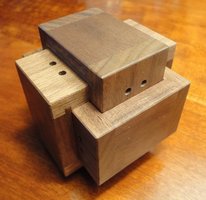
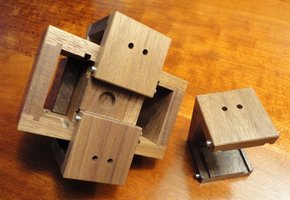
|
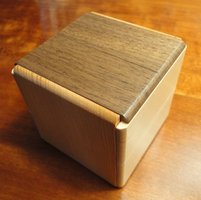
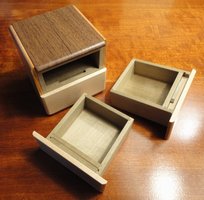
|
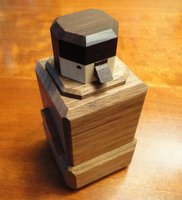
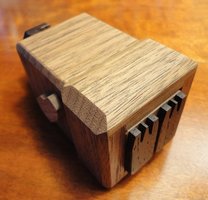
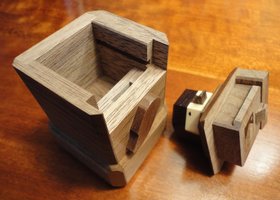
|
|
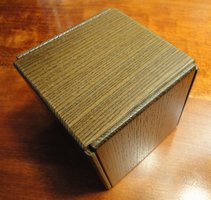
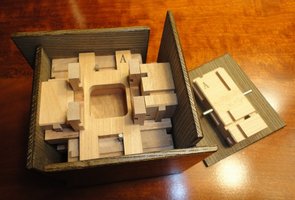
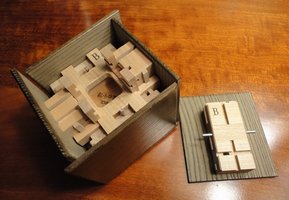
|
|
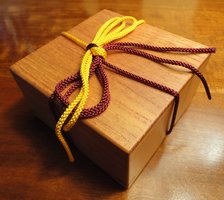
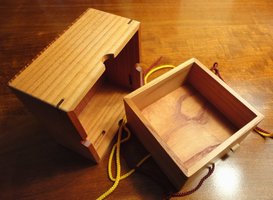
|
|
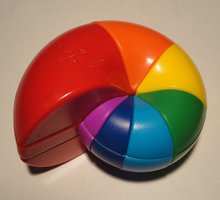
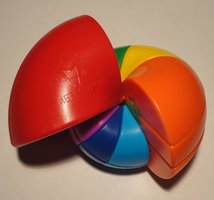
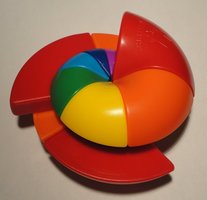
The Rainbow Nautilus, designed by Tim Selkirk [T] and mass-produced by Meffert. |
|
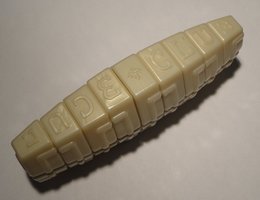
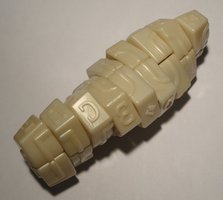
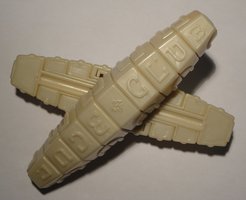
The Jade Chopsticks, a 1x2x9. [T] The ambigram on it was designed by John Langdon. Based on the 1x2x13 designed by Oskar van Deventer and the 1x2x9 designed by Ola Jansson. Mass-produced by Meffert. |
|
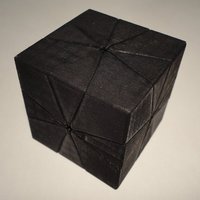
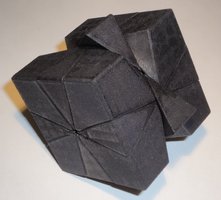
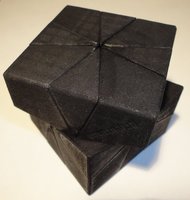
The Brilicube. This version purchased from the Shapeways shop of "grigr." [T] Originally designed by Aleh Hladzilin. [T] I have not stickered mine yet. This is the first Shapeways puzzle I got in black strong flexible material. It is very tight and difficult to move, even after much wearing of the pieces, and lubrication. |
|
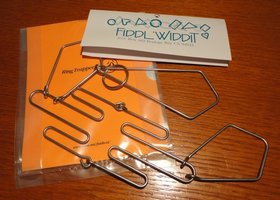
The Ring Trapper, from Fiddl'Widdit. Thanks, Hon! |
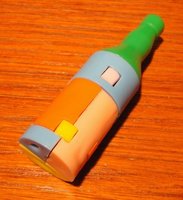
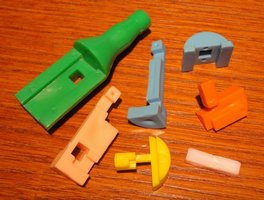
An extra-large keychain bottle puzzle. |
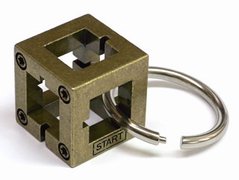
Hanayama Cast Box Designed by Akira Yuta. Navigate the ring from encircling the "Start" edge, free of the box (then back again). Of the 12 edges of the hollow cube frame, only 7 have various slots that allow the tooth in the ring's slot to pass. Purchased at Time Machine Hobby, who now carry the Hanayama line (in addition to Tavern Puzzles, Thinkfun Puzzles, and a lot of other great puzzles and toys). |
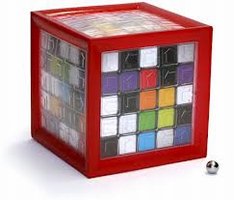
Paradox Box Designed by Ivan Moskovich, issued by Fat Brain Toy Co. Drop the steel ball bearing into a hole in the corner of the "top" of the cube, then navigate it through the blind maze to an exit hole in the center of the "bottom" face. Various clues on the outside of the box must be decoded to help - arrows on the clear face panels (up, down, left, right), a 5x5 grid of 10 colors on each face (white, black, purple, red, orange, yellow, light blue, dark blue, light green, dark green), and plus/minus/infinity signs at the grid crossings. |
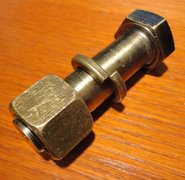
Go! Games Bolt Remove the washer. The nut moves but doesn't want to cooperate. A hefty instance of the first classic trick bolt mechanism. |
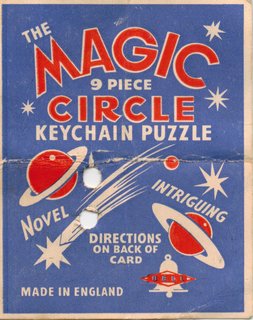
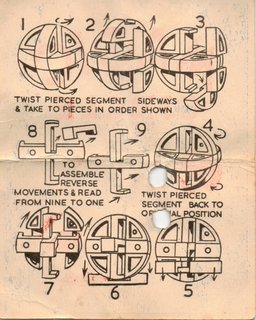
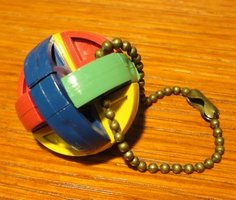
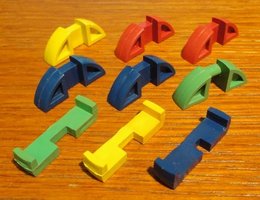
Keychain Magic Circle - Bell |
|
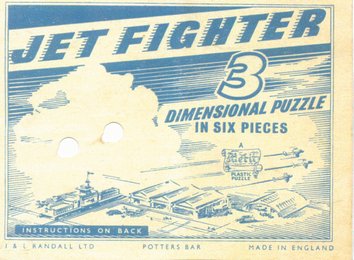
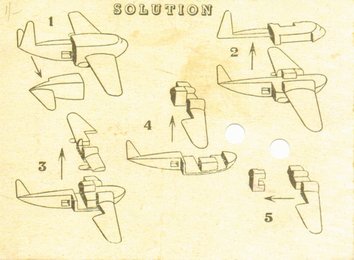
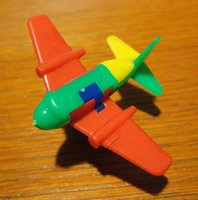
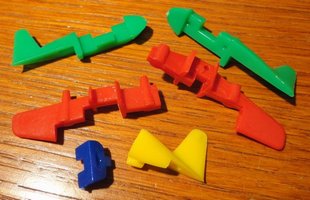
Keychain Jet Fighter - Merit (hard plastic) |
|
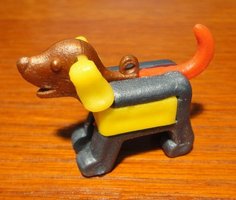
Keychain Russian Dog |
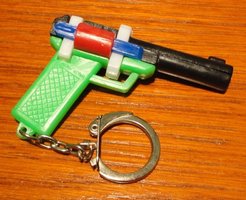
Keychain Kumiki Pistol |
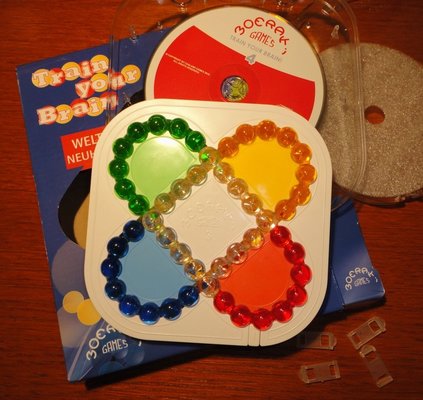 This puzzle is called
Moeraki, a name chosen since the shape of its pieces is reminiscent of a formation of
spherical boulders found in New Zealand.
It was designed by Kasimir Landowski and won an IENA gold medal at the 2008 Nuremberg Trade Fair.
You can read about the history of the puzzles and order them online at the
Casland Games website.
Various virtual examples are available at the website and each physical puzzle includes a disk offering some virtual puzzles.
Moeraki is a type of sliding piece puzzle, which I would categorize as of the
No Gap, Rigid Frame (Interlocking Orbits) variety.
Moeraki No. 3, the one I have, has a square tray and two interlocking oval tracks of pieces in five colors.
Moeraki No. 4 has a triangular tray and three interlocking circular tracks of pieces in four colors.
I received my No. 3 as a gift at IPP32, on the condition that I review it.
Normally, I don't blog or review puzzles per se, but I accepted it since I had planned on buying one anyway.
A policy of mine in general is to try not to say anything if I don't have something nice to say (in print, at least).
I don't always succeed in keeping to my policy, but happily I will be in no danger here since I honestly like the Moeraki puzzle.
The concept of a set of markers riding in interlocking
circular or oval tracks, which can be mixed by alternate rotations of the
groups of pieces in the different tracks, is certainly not new.
An example called "Race War Puzzle Between Gold & Silver" designed
by William Churchill
was awarded U.S. patent
507215
in October of 1893.
More recent examples include the Hungarian Rings puzzle by Endre Pap et al
(EP0050755)
, and the Magic 8.
On the Casland website it is mentioned that Ivan Moskovich also received a patent for a similar idea in 1979
(see U.S. patent
4509756),
and is now collaborating with Landowski.
Original concept or not, the Moeraki puzzle stands out as a very nice implementation and is probably among the most user-friendly of
this class of puzzles in my collection.
You can find analysis and solutions of the puzzles at
Jaap's Puzzle Page.
Jaap gives the total number of possible arrangements for No. 3 as
3,969,069,923,590,200, which, surprisingly, is still larger than the U.S. national debt.
Jaap notes that any two diametrically opposed beads will always remain diametrically opposed no matter what moves you make,
which I find non-obvious on initial inspection, and fascinating.
Dieter Gebhardt has also published some analysis about this type of puzzle.
Dieter's article "Rotational Puzzles with Two Tracks and Two Intersections"
can be found in the March 2002 issue #57 of the journal of
Cubism For Fun (CFF).
Dieter's article supplies a notation convention and a general theoretical basis for deducing useful move sequences,
and would be of interest to
one attempting to gain a more than superficial understanding of such puzzles,
although it deals with types of only two intersections.
These puzzles may appear to be intrinsically simpler than puzzles such as Rubik's Cube and its ilk, and in truth it is possible to attack them without extensive knowledge or analysis of solution procedures or "operators."
And, as with twisty puzzles in general, the large number of possible states is not a reliable indicator of difficulty.
However, it should be noted that some piece swaps may require upwards of 100 moves to solve,
so patience and perseverance will definitely be assets to the recipient of these puzzles.
At his website,
Diniar Namdarian gives instructions for accomplishing a last swap of two pieces.
When I played with mine, I found the very first challenge to be simply opening the package!
The puzzle ships in a cardboard box, which contains a clear plastic case for the puzzle, secured by four clips.
A clip can be removed by prying its rounded end away from the case, but the force required makes one leery of breaking something.
The puzzle is 135mm square and about 15mm thick.
Production values are high - the plastic is good quality and brightly colored.
A thoughtful touch is a removable block on the perimeter of the base, which will allow you to extract the sliding pieces from the puzzle in order to effect a brute-force restoration of the solved state, should you deem that necessary.
The case also holds a CD-ROM containing additional puzzle software.
For me, assuming one enjoys this class of puzzle, two criteria determine whether a puzzle of this type succeeds or
fails as a mechanical puzzle worth playing.
First, do the pieces remain securely in their tracks?
I have had copies of Hungarian-Rings style puzzles where the beads just fell out.
I can report that the puzzle is well-engineered and well-built, and the Moeraki beads will not come out by accident.
Second, is it easy to rotate the pieces along their tracks, preferably while holding the puzzle in two
hands and using only one's thumbs to slide the pieces?
Here I can also give the Moeraki a good grade.
As with all interlocking-orbit type puzzles, the orbits must be properly aligned so that the pieces do not catch and impede movement.
Out of the box, the movement of the Moeraki beads is somewhat stiff, but a benefit is that the tracks of beads do not tend to
overshoot on a move, and a simple tilt of the puzzle will not cause unwanted movement.
I gave it a shot of CRC Industrial Food-Grade Silicone spray and now the action is silky smooth!
I think the Moeraki would make good Christmas presents for the puzzler in your life (or for yourself).
See what other puzzlers have had to say about the Moeraki puzzles
here,
here,
and
here.
This puzzle is called
Moeraki, a name chosen since the shape of its pieces is reminiscent of a formation of
spherical boulders found in New Zealand.
It was designed by Kasimir Landowski and won an IENA gold medal at the 2008 Nuremberg Trade Fair.
You can read about the history of the puzzles and order them online at the
Casland Games website.
Various virtual examples are available at the website and each physical puzzle includes a disk offering some virtual puzzles.
Moeraki is a type of sliding piece puzzle, which I would categorize as of the
No Gap, Rigid Frame (Interlocking Orbits) variety.
Moeraki No. 3, the one I have, has a square tray and two interlocking oval tracks of pieces in five colors.
Moeraki No. 4 has a triangular tray and three interlocking circular tracks of pieces in four colors.
I received my No. 3 as a gift at IPP32, on the condition that I review it.
Normally, I don't blog or review puzzles per se, but I accepted it since I had planned on buying one anyway.
A policy of mine in general is to try not to say anything if I don't have something nice to say (in print, at least).
I don't always succeed in keeping to my policy, but happily I will be in no danger here since I honestly like the Moeraki puzzle.
The concept of a set of markers riding in interlocking
circular or oval tracks, which can be mixed by alternate rotations of the
groups of pieces in the different tracks, is certainly not new.
An example called "Race War Puzzle Between Gold & Silver" designed
by William Churchill
was awarded U.S. patent
507215
in October of 1893.
More recent examples include the Hungarian Rings puzzle by Endre Pap et al
(EP0050755)
, and the Magic 8.
On the Casland website it is mentioned that Ivan Moskovich also received a patent for a similar idea in 1979
(see U.S. patent
4509756),
and is now collaborating with Landowski.
Original concept or not, the Moeraki puzzle stands out as a very nice implementation and is probably among the most user-friendly of
this class of puzzles in my collection.
You can find analysis and solutions of the puzzles at
Jaap's Puzzle Page.
Jaap gives the total number of possible arrangements for No. 3 as
3,969,069,923,590,200, which, surprisingly, is still larger than the U.S. national debt.
Jaap notes that any two diametrically opposed beads will always remain diametrically opposed no matter what moves you make,
which I find non-obvious on initial inspection, and fascinating.
Dieter Gebhardt has also published some analysis about this type of puzzle.
Dieter's article "Rotational Puzzles with Two Tracks and Two Intersections"
can be found in the March 2002 issue #57 of the journal of
Cubism For Fun (CFF).
Dieter's article supplies a notation convention and a general theoretical basis for deducing useful move sequences,
and would be of interest to
one attempting to gain a more than superficial understanding of such puzzles,
although it deals with types of only two intersections.
These puzzles may appear to be intrinsically simpler than puzzles such as Rubik's Cube and its ilk, and in truth it is possible to attack them without extensive knowledge or analysis of solution procedures or "operators."
And, as with twisty puzzles in general, the large number of possible states is not a reliable indicator of difficulty.
However, it should be noted that some piece swaps may require upwards of 100 moves to solve,
so patience and perseverance will definitely be assets to the recipient of these puzzles.
At his website,
Diniar Namdarian gives instructions for accomplishing a last swap of two pieces.
When I played with mine, I found the very first challenge to be simply opening the package!
The puzzle ships in a cardboard box, which contains a clear plastic case for the puzzle, secured by four clips.
A clip can be removed by prying its rounded end away from the case, but the force required makes one leery of breaking something.
The puzzle is 135mm square and about 15mm thick.
Production values are high - the plastic is good quality and brightly colored.
A thoughtful touch is a removable block on the perimeter of the base, which will allow you to extract the sliding pieces from the puzzle in order to effect a brute-force restoration of the solved state, should you deem that necessary.
The case also holds a CD-ROM containing additional puzzle software.
For me, assuming one enjoys this class of puzzle, two criteria determine whether a puzzle of this type succeeds or
fails as a mechanical puzzle worth playing.
First, do the pieces remain securely in their tracks?
I have had copies of Hungarian-Rings style puzzles where the beads just fell out.
I can report that the puzzle is well-engineered and well-built, and the Moeraki beads will not come out by accident.
Second, is it easy to rotate the pieces along their tracks, preferably while holding the puzzle in two
hands and using only one's thumbs to slide the pieces?
Here I can also give the Moeraki a good grade.
As with all interlocking-orbit type puzzles, the orbits must be properly aligned so that the pieces do not catch and impede movement.
Out of the box, the movement of the Moeraki beads is somewhat stiff, but a benefit is that the tracks of beads do not tend to
overshoot on a move, and a simple tilt of the puzzle will not cause unwanted movement.
I gave it a shot of CRC Industrial Food-Grade Silicone spray and now the action is silky smooth!
I think the Moeraki would make good Christmas presents for the puzzler in your life (or for yourself).
See what other puzzlers have had to say about the Moeraki puzzles
here,
here,
and
here.
|
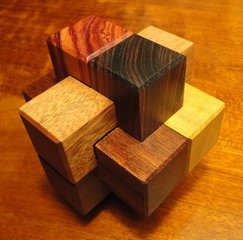
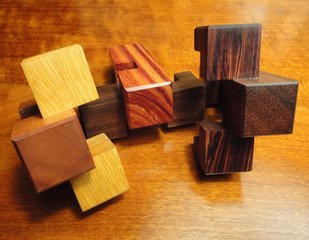
Glued, designed and made by Gregory Benedetti. Resembling a six-piece burr, this puzzle is composed of six conventional burr pieces that have been glued together in pairs. The puzzle is level 4.3 and [dis]assembly requires a rotation. It is made from Bolivian Santos Rosewood, Kingwood, Tulipwood, Bloodwood, Difu, and "Wood of Jesuit" and is very pretty. It is a nice size - the pieces are 25x25x75mm - and is quite heavy. |
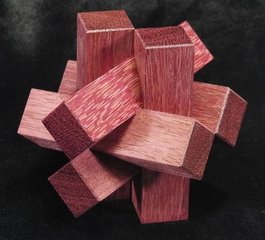
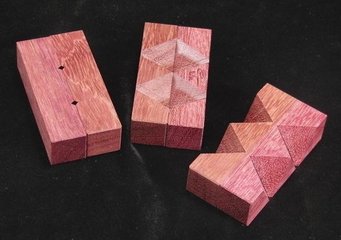
Burr Circus, designed by Stewart Coffin (STC #116) and made by Eric Fuller, from Purpleheart. Six sticks, having notches both slanted and tilted. Not easy to make, nor easy to assemble. |
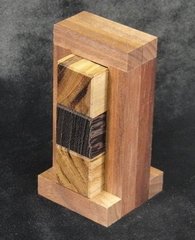
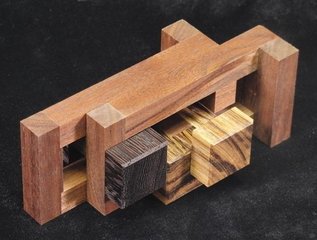
Moonflight, designed by Osanori Yamamoto and made by Eric Fuller, from Walnut, Mora, and Wenge. Level 20.2.5. |
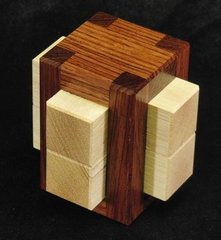
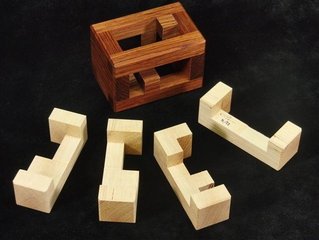
Cage for Four Sticks, designed by Stephane Chomine, made by Eric Fuller from Dark Rosewood and Sycamore. Level 24.6.3. |
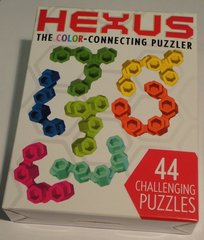
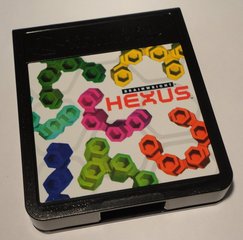
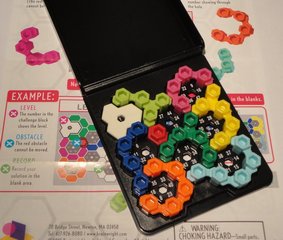
Hexus, a packing puzzle from Brainwright. Seven pieces and a movable "challenge block" to be placed on a hexagonal grid according to a series of 44 challenges. Purchased at Necker's, who have laid in a nice stock of puzzles for the Christmas season. |
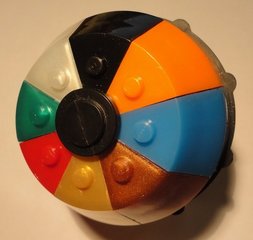
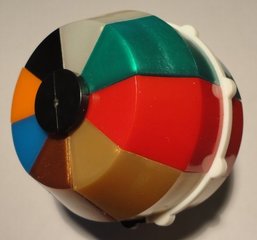
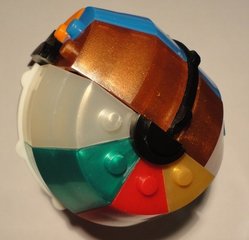
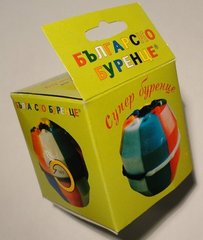
The Bulgarian Barrel, a dihedral-type twisty puzzle. |
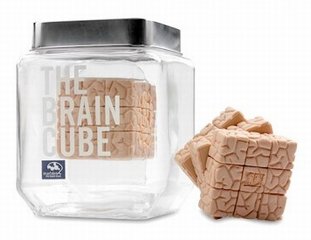
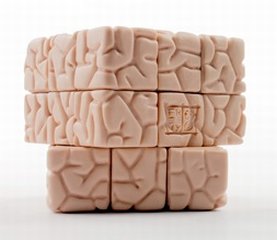
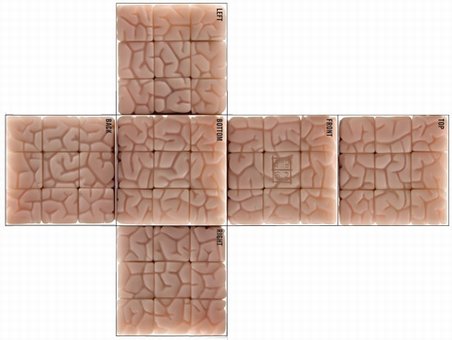
The Brain Cube, designed by Jason Freeny. A 3x3x3 clad with a squishy material called Kraton, and textured to resemble a brain. Solve by aligning all the fissures. Comes in a glass jar, formaldehyde not included. Purchased from Marbles The Brain Store. |
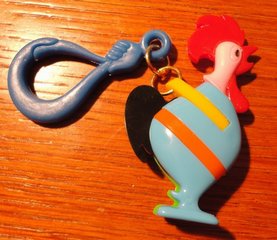
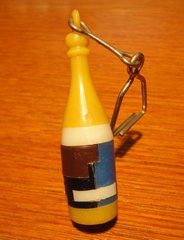
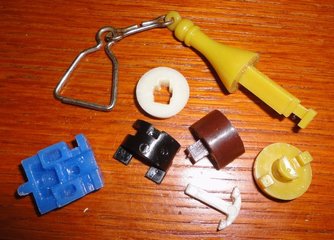
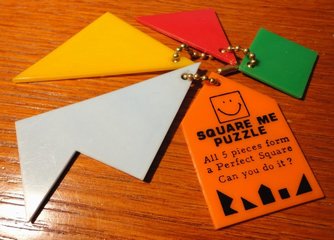
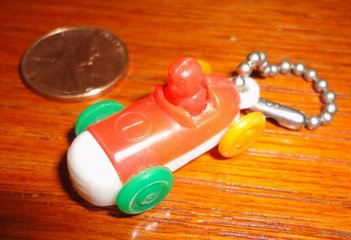
Keychain puzzles: Rooster, Bottle, Square Me, Small Racer. |
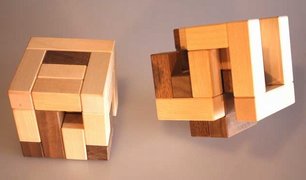
I received Tango, designed by Jeff Namkung, from PuzzleWood.de. It is nicely made, from Maple and Walnut woods. Five pieces form a 4x4x4 cube, with some holes. Like many of Jeff's designs, Tango requires rotations of pieces on [dis]assembly. Thanks, Bernhard! |
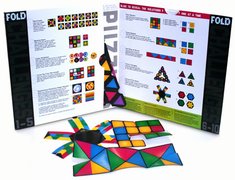
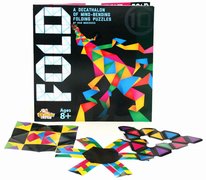
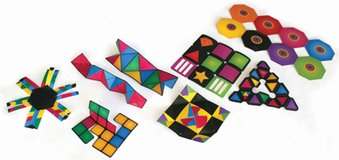
This is Fold A Decathlon of Mindbending Folding Puzzles, by Ivan Moscovich, issued by the Fatbrain Toy Co. It is a re-issue of the Power Puzzles set put out by Discovery Toys. |
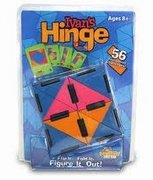
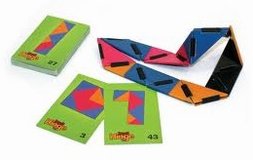
This is Ivan's Hinge, another design by Ivan Moscovich, also issued by the Fatbrain Toy Co. |
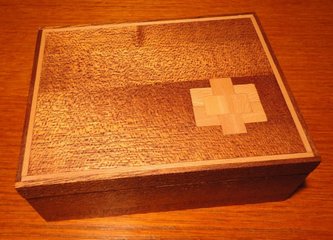
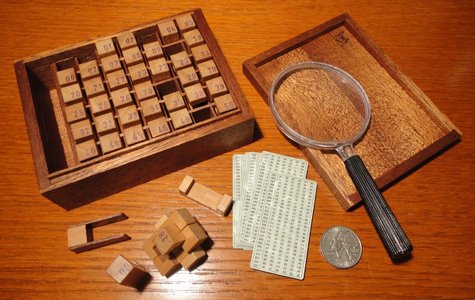 A Level-5 Burr Set in mahogany and plane woods, made by Jack Krijnen.
The attention to detail is superb!
This set provides 35 (42 including duplicates) out of the 837 possible traditional six-piece burr pieces, at length 6.
(The same as in a similar set made by Interlocking Puzzles ca. 2000,
shown on Jim Storer's site.
The piece numbering employed by Krijnen, David Winkler's scheme,
is also identical to that used for the IP set.)
The particular pieces are all notchable, and are those needed to build level-5 burrs.
The set includes a small pair of wooden tweezers with which one can extract pieces from the box.
The box is about 118mm x 90mm.
The pieces measure 3x1x1 cm.
A Level-5 Burr Set in mahogany and plane woods, made by Jack Krijnen.
The attention to detail is superb!
This set provides 35 (42 including duplicates) out of the 837 possible traditional six-piece burr pieces, at length 6.
(The same as in a similar set made by Interlocking Puzzles ca. 2000,
shown on Jim Storer's site.
The piece numbering employed by Krijnen, David Winkler's scheme,
is also identical to that used for the IP set.)
The particular pieces are all notchable, and are those needed to build level-5 burrs.
The set includes a small pair of wooden tweezers with which one can extract pieces from the box.
The box is about 118mm x 90mm.
The pieces measure 3x1x1 cm.
|
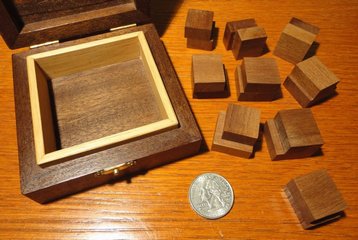
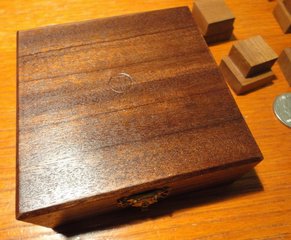 This is one of Trevor Wood's Teaser Tiles puzzles.
Nine tiles, each composed of two slightly different sized layers, with various overhangs.
The objective is to fit the pieces flat into the box -
i.e. so that all pieces have their two layers parallel to the
bottom of the box.
Obviously, the particular juxtaposition of piece edges and overhangs will be crucial.
Thanks, James!
This is one of Trevor Wood's Teaser Tiles puzzles.
Nine tiles, each composed of two slightly different sized layers, with various overhangs.
The objective is to fit the pieces flat into the box -
i.e. so that all pieces have their two layers parallel to the
bottom of the box.
Obviously, the particular juxtaposition of piece edges and overhangs will be crucial.
Thanks, James!
|
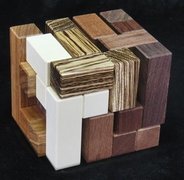
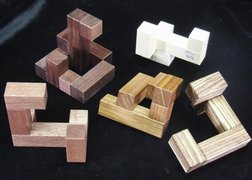
The Accordion Cube by Ken Irvine, made from Holly, Canarywood, Sapele, Zebrawood, and Walnut, by Eric Fuller. Turns out, in a case of independent discovery, Ken duplicated a 2008 design called "Disjointed Cube" by Mineyuki Uyematsu. |
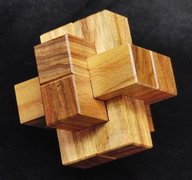
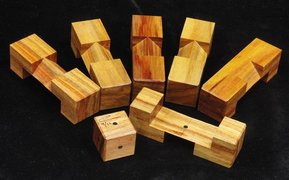
The Missing Notch burr by Stewart Coffin, made from Canarywood, by Eric Fuller. |
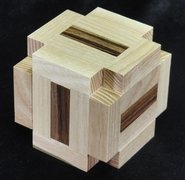
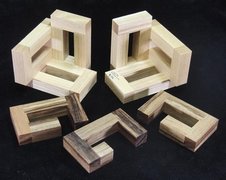
Two Halves burr by Gregory Benedetti, a caged 3-board burr, made from Ash and Mora, by Eric Fuller. |
| I received a nice gift - a group of heart-themed tanglement puzzles by Fiddl'Widdit Wire Puzzles. Thanks, girls! |

Bridge (copper) |

Star Maze |

Heartful Dodger |

Double Heart Loop |
| Four new items, ordered from hknowstore: | |||
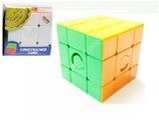
The Constrained Cube designed by Tom van der Zanden. Several versions available that have different side turning constraints. I ordered the "Ultimate" version. |
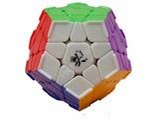
DaYan Megaminx, version with solid colored plastic pieces, and corner ridges. |
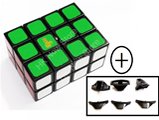
An Mf8 2x3x4, with the extra split edges to restore full functionality. |
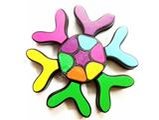
A Snow Mystery |
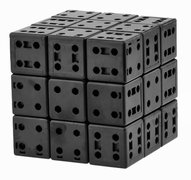
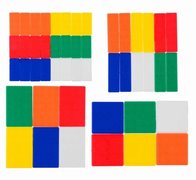
Cubetwist Bandaged Cube Kit Ordered from Lightake |
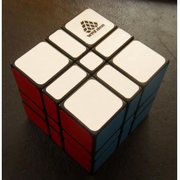
Camouflage Cube Ordered from WitEden |
||
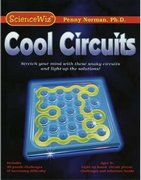
Cool Circuits |
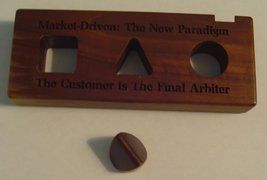
Promotional puzzle from IBM What solid shape will fit through each hole, completely filling the outline? |
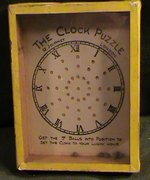
Journet Clock |
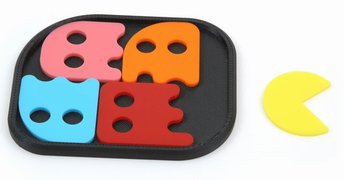
Pack-Man - Chris Enright |
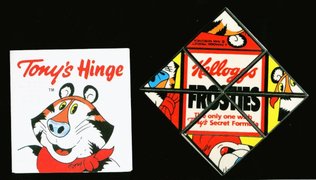
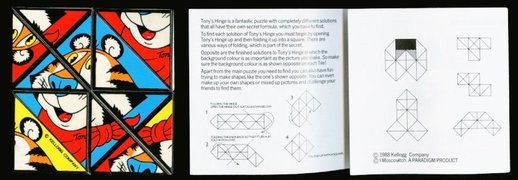
Tony's Hinge |
|
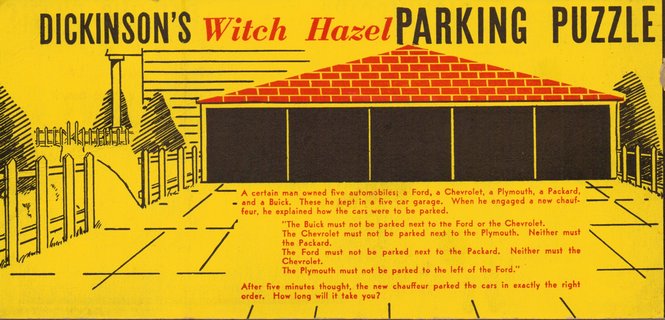
Dickinson's Witch Hazel Parking Puzzle a vintage advertising card puzzle, posing a logic problem |
||

The Genie in the Bottle designed and made by my puzzle-friend from Turkey, Erhan Cubukcuoglu. Thanks, Erhan! The goal is to remove the cap from the bottle, thereby freeing it from the frame. Genie was entered in the 2012 IPP Design Competition. |
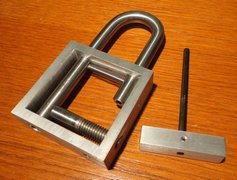
The Open Lock by Gary Foshee The goal is to remove the hasp from the frame. A "sequential-discovery" puzzle where you have to find a series of tools, even though apparently everything is out in the open. I really like this one! |
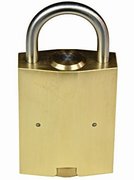
The PoppLock T7 by Rainer Popp. Purchased from my friends at PuzzleMaster.ca. Thanks, guys! (And thanks, John.) |
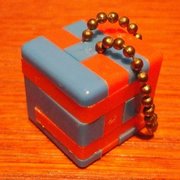
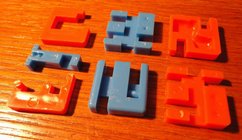
Keychain Frankfort Cube (Orange & Blue) |
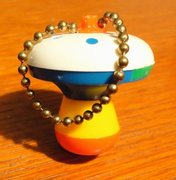
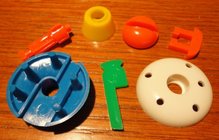
Keychain Mushroom |
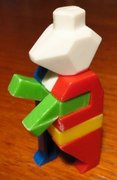
Keychain Bear |
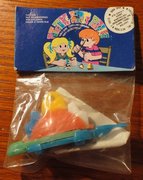
Keychain Dragon (Large) |
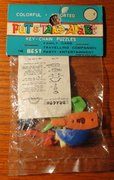
Keychain Dragon (Small) |
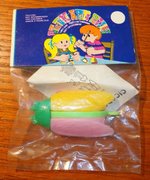
Keychain Cicada (Pink) |
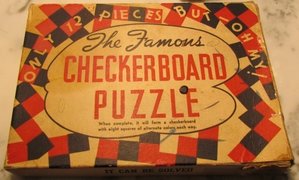
Checkerboard Puzzle |
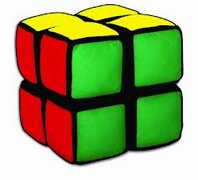
Rubik's Soft Cube A fully functional 2x2x2, about 4" on a side, with fabric-covered soft cubies. |
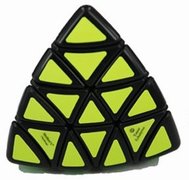
Meffert's Master Pyraminx |
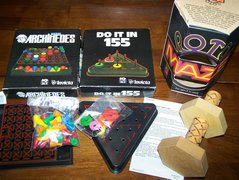
Three puzzles: Archimedes and "Do It In 155" by Invicta, and Roto-Maze from Little Harbor Corp. |
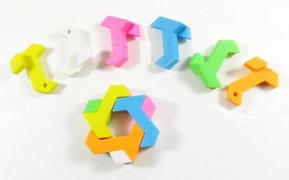
Interlocking 6-pc Star Eraser Puzzle |
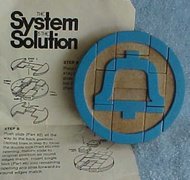
Bell Telephone Puzzle |
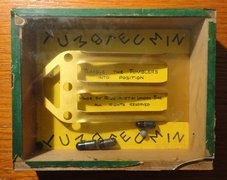
Journet Tumbleumin |
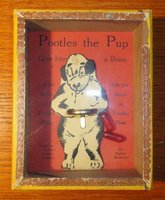
Journet Pootles the Pup |
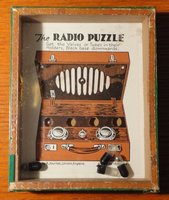
Journet Radio (tall version) |
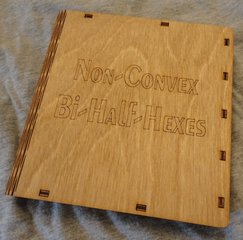
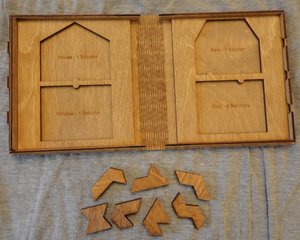
Non-Convex Bi-Half-Hexes, designed by Robert Stegmann produced by Steve Kelsey at AccurateLaserEngraving.com. |
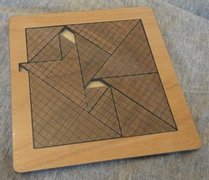 13 Triangles, designed and exchanged by Ed Pegg Jr., made by William Waite |
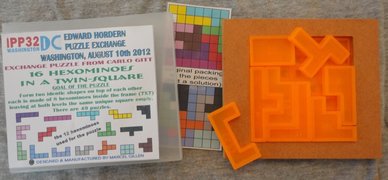 16 Hexominoes in a Twin Square, designed and made by Marcel Gillen, exchanged by Carlo Gitt |
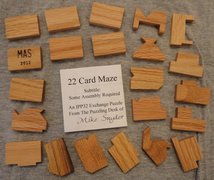 22 Card Maze, designed, made, and exchanged by Mike Snyder |
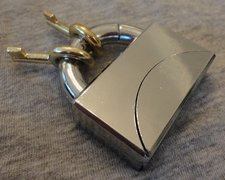 Two Key Lock, designed by Vesa Timonen, made by Bits and Pieces, exchanged by Nancy Alliegro |
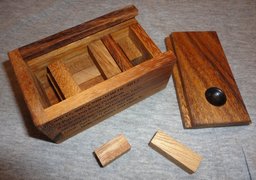 Nine Parts Packing, designed by David Goodman, made and exchanged by Dor Tietz |
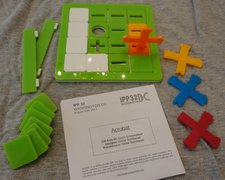 Acrobat designed and made by Diniar Namdarian, exchanged by Goetz Schwandtner |
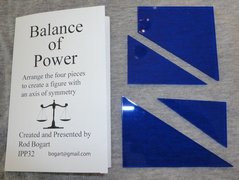 Balance of Power, designed, made, and exchanged by Rod Bogart |
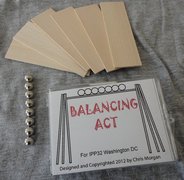 Balancing Act, designed and exchanged by Chris Morgan, made by Chris Morgan and Saul Bobroff |
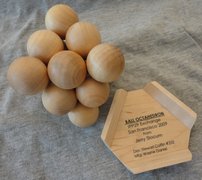 Ball Octahedron designed by Stewart Coffin and made by Wayne Daniel exchanged by Jerry Slocum Jerry's actual exchange puzzle was It's Nuts, a copy of the Screwy Screw by Scott Elliott. Since I already have a copy, Jerry was kind enough to substitute his puzzle from IPP29. |
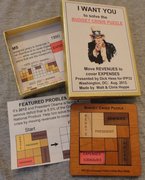 Budget Crisis, designed by Dick Hess and Neil Bickford, made by Laser Lynne, exchanged by Dick Hess |
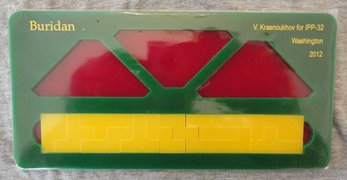 Buridan, designed, made, and exchanged by Vladimir Krasnoukhov |
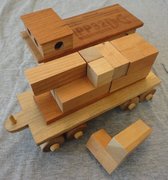 Caboose, designed, made, and exchanged by Henry Strout |
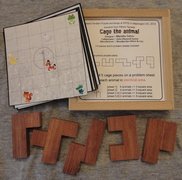 Cage the Animal, designed by Manabu Satou and Naoyuki Iwase (Osho), made by Woodpecker Hikimi and Lixy, exchanged by Lixy Yamada |
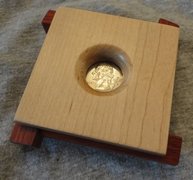 Caged Coin, designed and made by Bill Sheckels, exchanged by Norton Starr |
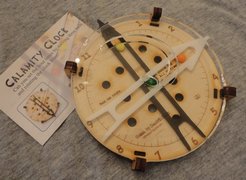 Calamity Clock, designed by Douglas Engel, made by Puzzleatomic, exchanged by Hendrick Haak |
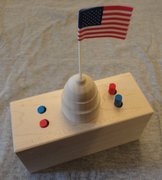 Capitol Politics, designed, made, and exchanged by Keith Winegar |
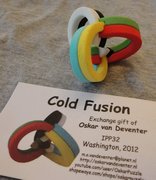 Cold Fusion, designed and exchanged by Oskar van Deventer, made by Shapeways |
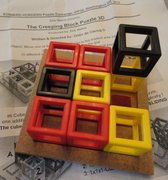 Creeping Block 3D, designed by Dries de Clercq, made and exchanged by Dirk Weber |
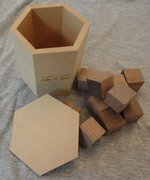 Cubes in Space, designed and exchanged by Hirokazu Iwasawa (Iwahiro), made by DYLAN-Kobo |
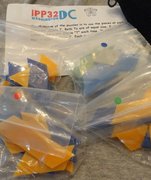 DC Tease, designed, made, and exchanged by James Kerley |
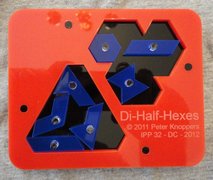 Di-Half-Hexes, designed and exchanged by Peter Knoppers, made by Buttonius Puzzles & Plastics I was really surprised to see this one. What are the odds? Peter and I must have been hit by a similar brain wave. Fortunately, his puzzle uses a different set of hexiamonds and different trays. |
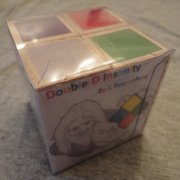 Double D Insanity, designed, made, and exchanged by Louis Toorenburg |
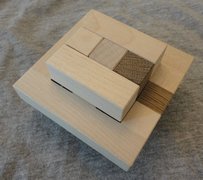
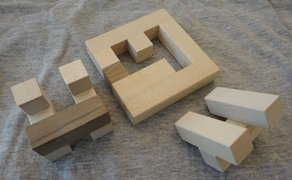
Double UT, designed by Osanori Yamamoto, made by the New Pelikan Workshop, exchanged by Abel Garcia |
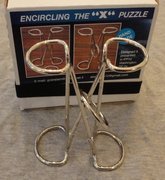 Encircling the X, designed, made, and exchanged by Abraham Jacob |
|
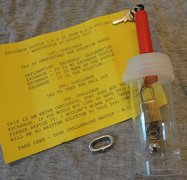 Exchange, designed, made, and exchanged by Wil Strijbos |
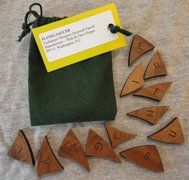 Flying Saucer, designed and exchanged by Jeremiah Farrell, made by Chris and Walt Hoppe |
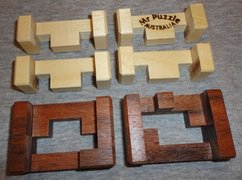 Four in the Vice, designed by Stephane Chomine, made from Silver Ash and Snakewood by Mr. Puzzle Australia. Exchanged by Frans de Vreugd |
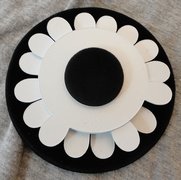 Full Bloom, designed by Ferdinand Lammertink, made and exchanged by George Miller |
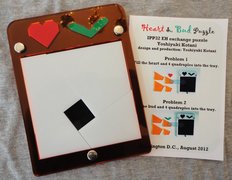 Heart and Bud, designed, made, and exchanged by Yoshiyuki Kotani |
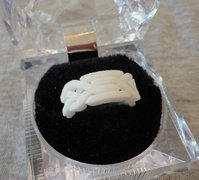 Holistic Ring, designed and exchanged by Bram Cohen, made by Oskar van Deventer & Shapeways |
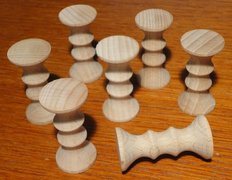 Hyperboloid Burr, designed by Oskar van Deventer and Naoaki Takashima, made by Kanagawa Toy Co. Ltd., exchanged by Naoaki Takashima |
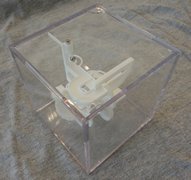 IPP32 Mini-Perplexus, designed by Michael McGinnis, made by Shapeways, exchanged by Tanya Thompson |
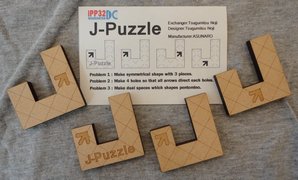 J Puzzle, designed and exchanged by Tsugumitsu Noji, made by ASUNARO |
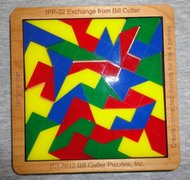 Jerrymander, designed and exchanged by Bill Cutler, made by Laser Perfect |
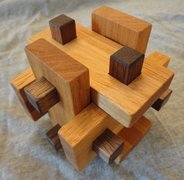 Knobbly Box, designed by Oskar van Deventer, made by Tom Lensch, exchanged by Rob Jones |
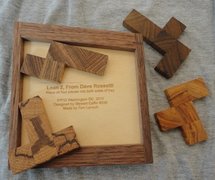 Lean 2, designed by Stewart Coffin, made by Tom Lensch, exchanged by Dave Rossetti |
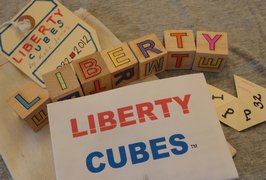 Liberty Cubes, designed and exchanged by Kate Jones, made by Kadon Enterprises Inc. |
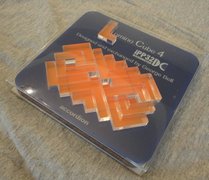 L-omino Cube 4, designed and exchanged by George Bell, made by Ponoko |
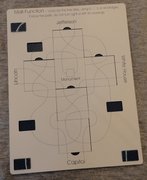 Mall Function, designed and exchanged by Rik van Grol, made by Buttonius |
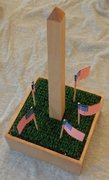 Monumental Challenge, designed, made, and exchanged by Andy Manvell |
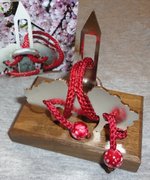 Monumental Mystification, designed, made, and exchanged by Lambert Bright |
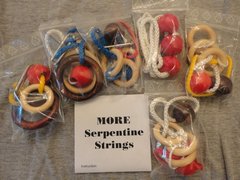 More Serpentile Strings, designed, made, and exchanged by Markus Götz |
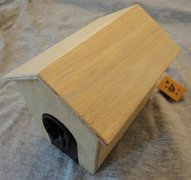 Mouse House, designed, made, and exchanged by Stephen Chin |
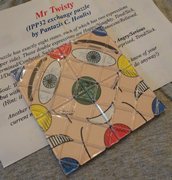 Mr. Twisty, designed, made, and exchanged by Pantazis Houlis |
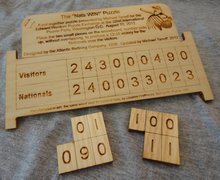 Nats Win!, designed in 1938, made by Creative Crafthouse, exchanged by Michael Tanoff |
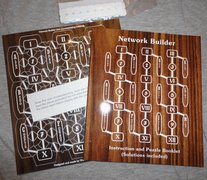 Network Builder, designed, made, and exchanged by Wei-Hwa Huang |
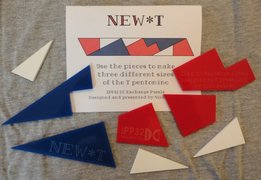 New*T, designed, made, and exchanged by Nick Baxter |
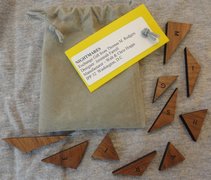 Nightmares, designed by Jeremiah Farrell, made by Walt Hoppe Would have been exchanged by Thomas Rogers |

Non-Convex Bi-Half-Hexes, designed and exchanged by Robert Stegmann produced by Steve Kelsey at AccurateLaserEngraving.com. |
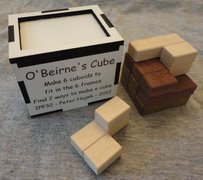 O'Beirne's Cube, or "Morph 2" - designed by T.H. O'Beirne, made by New Pelikan Workshop, exchanged by Peter Hajek |
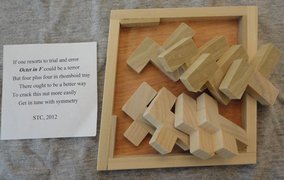 Octet in F, designed and made by Stewart Coffin, exchanged by Rosemary Howbrigg |
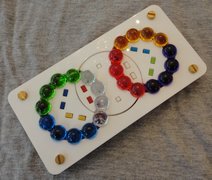 One Circle Two Circles, designed, made, and exchanged by Diniar Namdarian |
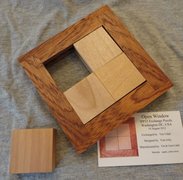 Open Window, designed by Tom Jolly, made and exchanged by Tim Udall |
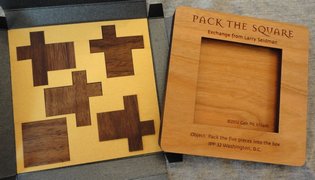 Pack the Square, designed by Goh Pit Khiam, made by Joe Sarabande, exchanged by Larry Seidman |
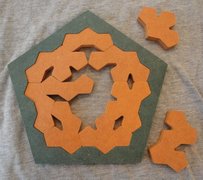 Pentagon Tiles, designed and exchanged by Rene Dawir, made by Marcel Gillen |
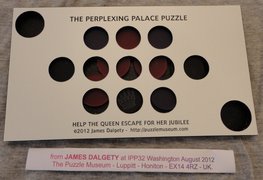 Perplexing Palace, designed, made, and exchanged by James Dalgety |
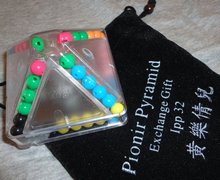 Pionir Pyramid, designed and exchanged by Roxanne Wong; made by Mf8 |
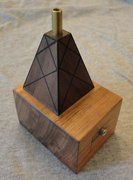 A Plugged Well, designed and made by Brian Young, exchanged by Matt Dawson |
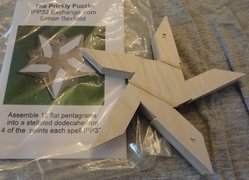 Prickly Puzzle, designed, made, and exchanged by Simon Bexfield |
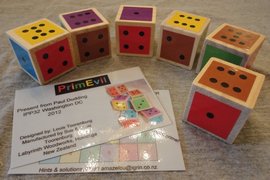 PrimEvil, designed and made by Louis Toorenburg, exchanged by Paul Dudding |
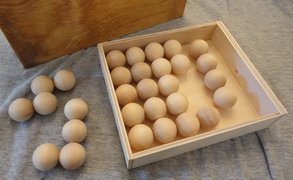 Puzzle in a Puzzle Box, designed, made, and exchanged by Thomas Beutner |
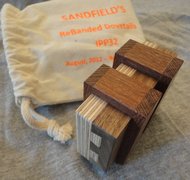 Rebanded Dovetails, designed by Robert Sandfield and Kathleen Malcolmson, made by Kathleen Malcolmson, exchanged by Robert Sandfield |
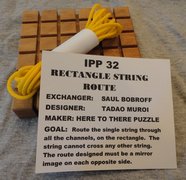 Rectangle String Route, designed by Tod Muroi, made by Here to There Puzzles, exchanged by Saul Bobroff |
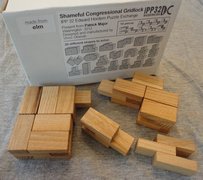 Shameful Congressional Gridlock, designed and made by Vaclav Obsivac, exchanged by Patrick Major |
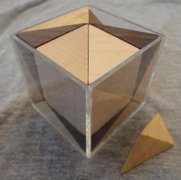 Six Cushion Shot, designed and made by Wayne Daniel, exchanged by Marti Reis |
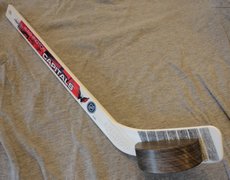 Slapshot, designed and exchanged by Allan Stein, made by PuzzleMaster |
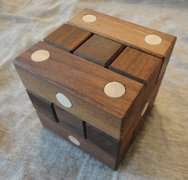 Spotted Cube, designed, made, and exchanged by Ken Ewers |
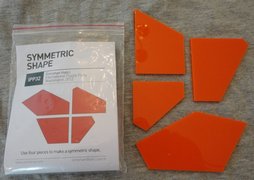 Symmetric Shape, designed, made, and exchanged by Emrehan Halici |
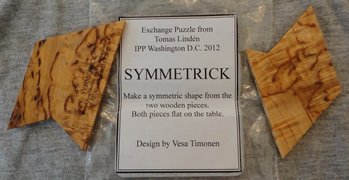 Symmetrick, designed by Vesa Timonen, made and exchanged by Tomas Linden |
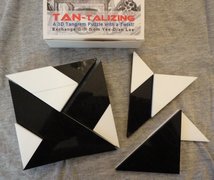 Tantalizing, designed, made, and exchanged by Yee-Dian Lee |
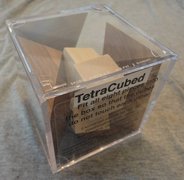 Tetracubed, designed by Robert Reid and George Miller, made by Wayne Daniel, exchanged by Stan Isaacs |
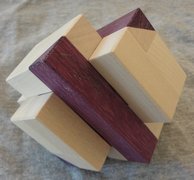 Triade, designed and exchanged by Andreas Röver, made by New Pelikan Workshop |
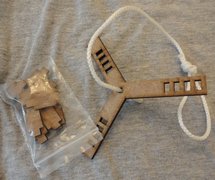 Tri-Bal Trifle, designed and exchanged by Rob Hegge, made by Formulor |
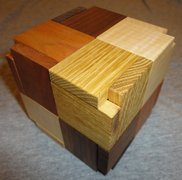 Try-Cycle designed and made by Vaclav Obsivac, exchanged by Laurie Brokenshire |
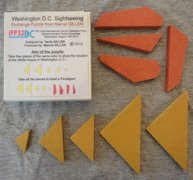 Washington DC Sightseeing, designed by Tania Gillen, made and exchanged by Marcel Gillen |
 Dragon Puzzle with Washington Monument, designed, made, and exchanged by Zandraa Tumen-Ulzii |
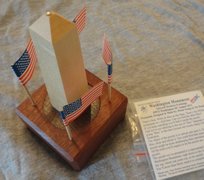 Washington Monument, designed, made, and exchanged by Brian Young |
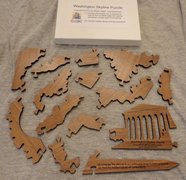 Washington Skyline, designed, made, and exchanged by William Waite |
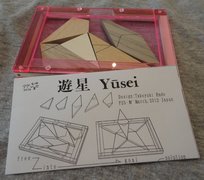 Yusei, designed, made, and exchanged by Takeyuki Endo |
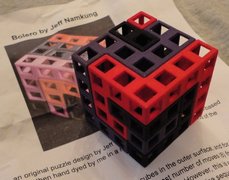 Bolero, designed by Jeff Namkung, 3D modeled and printed by, and purchased from, Richard Gain |
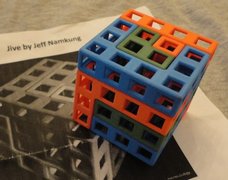 Jive, designed by Jeff Namkung, 3D modeled and printed by, and purchased from, Richard Gain |
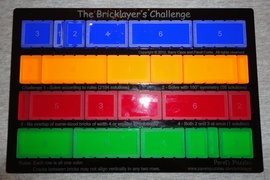 The Bricklayer's Challenge, purchased from Pavel Curtis |
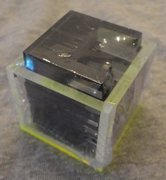 Pack six pieces in the box, from Japan (I don't know the name or the designer) |
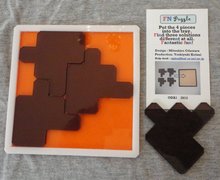 FN Puzzle - pack the four pieces in the tray in three different ways designed by Mitsuhiro Odawara produced by Toshiyuki Kotani |
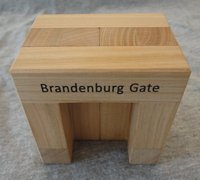 Brandenburg Gate designed by Jos Bergmans produced by Puzzlewood.de |
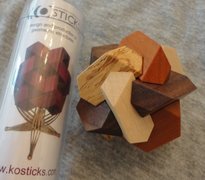 A Kosticks puzzle a gift for IPP32 committee members. Thanks, Chris! |
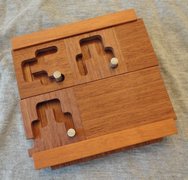 A sequential-movement puzzle made by Tom Lensch |
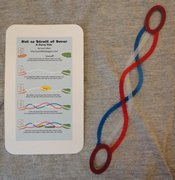 The Not So Strait of Dover by Scott Elliott |
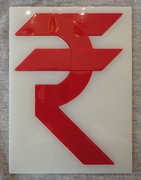 A dissection of a Rupee sign, designed and made by Scott Elliott |
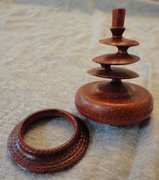 A beautiful hand-turned Offset-Spinning-Top, made by Stephen Chin Thanks, Chinny! |
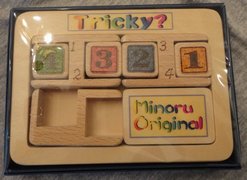 Minoru Abe's Tricky? |
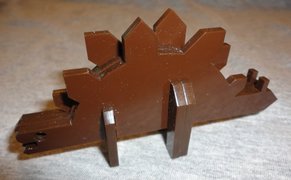 An interlocking Stegosaur |
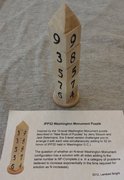 A Washington Monument "sums" puzzle, from Lambert Bright. Thanks! |
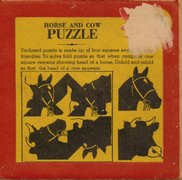 A vintage Horse and Cow folding puzzle, purchased from Will Shortz |
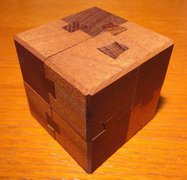
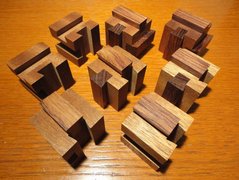
The Slump Cube, designed by Ronald Kint-Bruynseels, made from Mahogany and Rosewood by Eric Fuller |
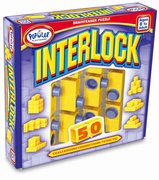
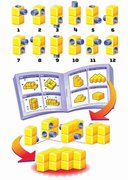
Interlock, from Popular Playthings |
|||
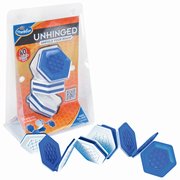 Unhinged by Thinkfun |
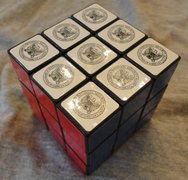 An NSA-stickered Rubik's Cube from the National Cryptologic Museum gift shop |
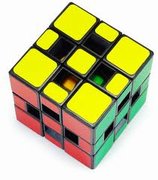 A Wormhole I Cube by WitEden |
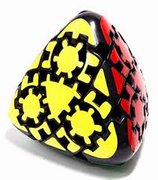 A Gear Mastermorphix |
 The Quarter Cube, designed by Katsuhiko Okamoto and Takafumi Haseda, produced by Chronos Co. Ltd. |

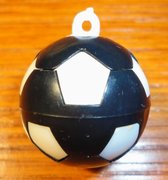
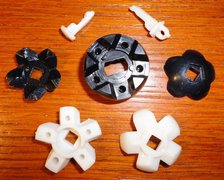
Keychain Soccer Ball |
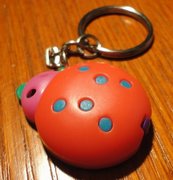
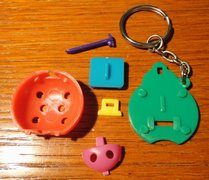
Keychain Ladybug |
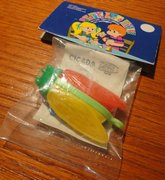
Keychain Cicada |
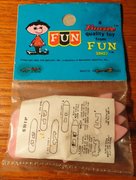
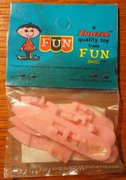
Keychain Ship (pink) |
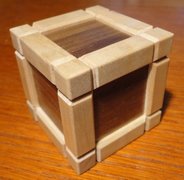
The Sway Cube, designed by Hidekuni Tamura, modified and nicely made in a great "pocket" size by Peter Wiltshire. |
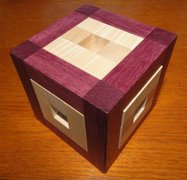
The Four Piece Burr Cube, designed by Osanori Yamamoto, and made from Curly Maple and Purpleheart by Peter Wiltshire. I really like this design, and the beautiful craftsmanship makes this a much-appreciated one-of-a-kind gift! |
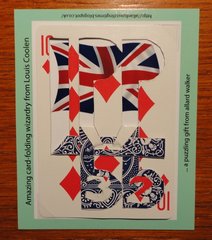
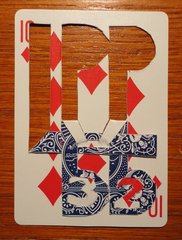
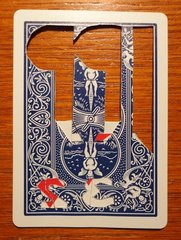
Card-Folding Wizardry by Louis Coolen - a gift from Allard Walker. Thanks! It was great meeting Allard and several other puzzlers for the first time in person. I wish I had had more time to socialize. |
|
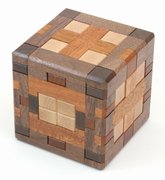
BurrBlock by Jerry McFarland One of Jerry's first copies of his new design, which was entered in the 2012 Design Competition. It's beautiful, hefty, and quite puzzling! |
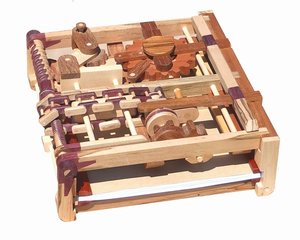
Stickman #25, The Milestone Box by Robert Yarger See reviews by Brian Pletcher, Allard Walker, and Neil Hutchison. |
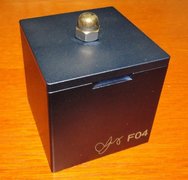
First Box designed by Wil Strijbos |
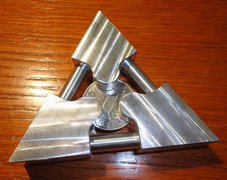
TriTalon designed by Iwahiro, purchased from Wil Strijbos |
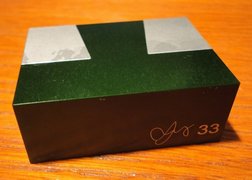
Another Trick Dovetail designed by Wil Strijbos |
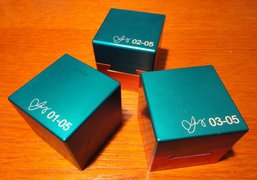
Set of 3 Aluminum Trick Dovetail Boxes designed by Wil Strijbos |
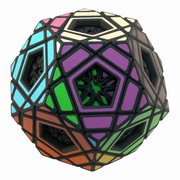
A Multidodecahedron by Tom van der Zanden [T] This is a custom 3D printed puzzle, but the pieces of my copy have been through a "tumbling" process that makes them smooth. [T] The Multidodecahedron is an outer Master Pentultimate, where the face centers expose an inner Megaminx shell having its own stickers. A full solution entails solving both layers. [T] |
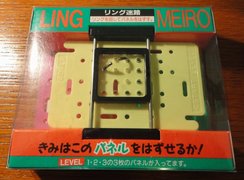
Ling Meiro |
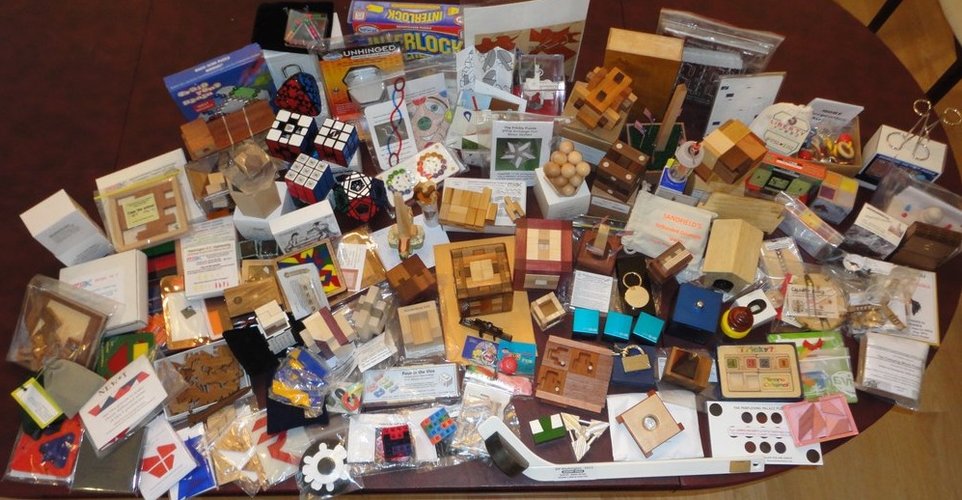
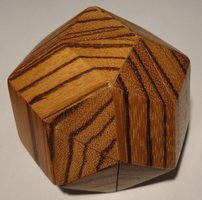
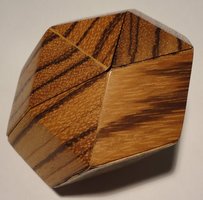
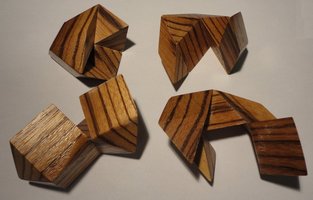
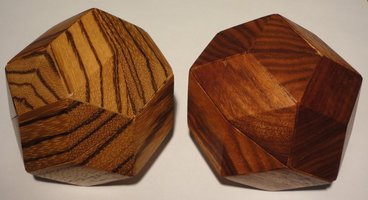
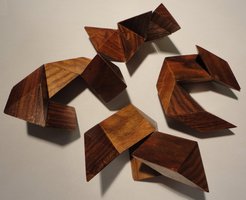 I found a Tigerwood version of Wayne Daniel's Golden Rhombic Icosahedron.
I found a Tigerwood version of Wayne Daniel's Golden Rhombic Icosahedron.
I already had another version I believe to be the IPP17 exchange gift from Abel Garcia, made from Chechin wood. They have different pieces. John Rausch describes the full set on his PuzzleWorld website. Each puzzle has only four pieces, but they are difficult to take apart and to assemble. The Zebrawood version has a slightly rounded interior edge to permit [dis]assembly. |
|
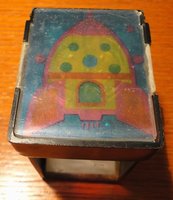
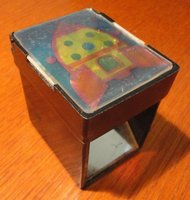
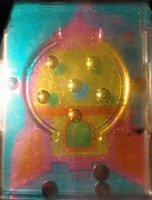 I found what I believe to be another member of the
Nervous Breakdown dexterity puzzle series
I found what I believe to be another member of the
Nervous Breakdown dexterity puzzle series
each of which features ball bearings inside a transparent puzzle board that one views via a mirror in the puzzle's base. This version features a rocket background, but the case is more narrow than the others in the series. |
|
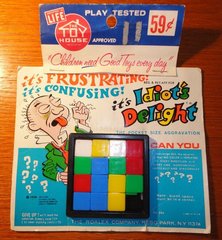 I found a copy of the Idiot's Delight sliding piece puzzle issued by Roalex.
I found a copy of the Idiot's Delight sliding piece puzzle issued by Roalex.
The goal is to move the pieces such that no color appears more than once in any row, column, or diagonal. The space must end in a corner. |
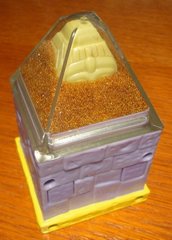 My friend Brett had showed me a puzzle he has had since childhood which was an advertising premium.
Since then I have been on the lookout for one and I finally found it.
The puzzle features "sand" inside a transparent plastic apex, and four moving sliders in the base.
The objective is to discover the slider settings which allow all the sand to be drained into the base, revealing
a totemic icon on the pyramidal apex.
My friend Brett had showed me a puzzle he has had since childhood which was an advertising premium.
Since then I have been on the lookout for one and I finally found it.
The puzzle features "sand" inside a transparent plastic apex, and four moving sliders in the base.
The objective is to discover the slider settings which allow all the sand to be drained into the base, revealing
a totemic icon on the pyramidal apex.
|
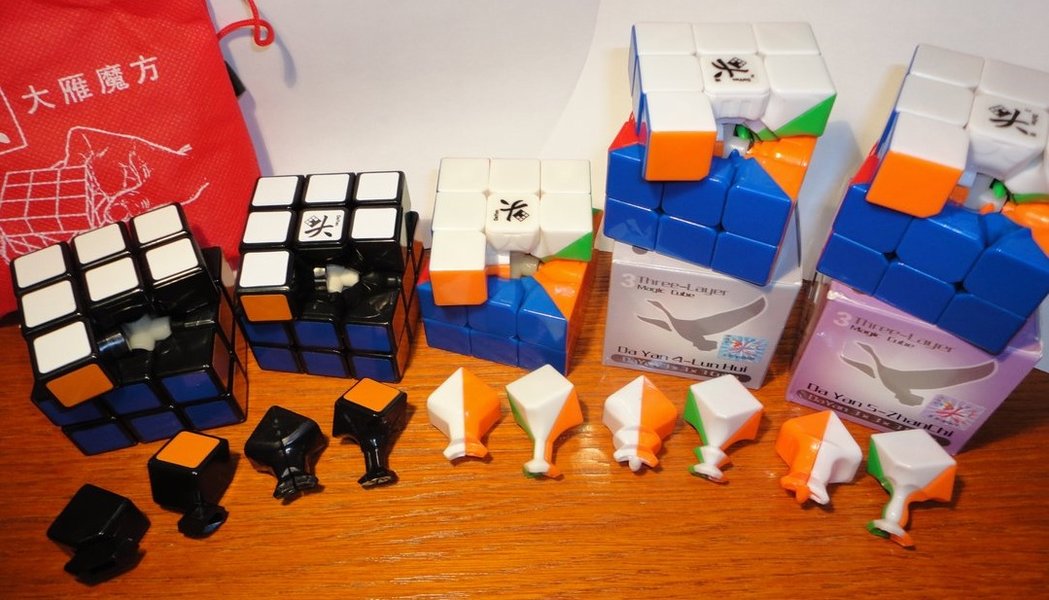 The Chinese twisty puzzle company DaYan has offered a series of five 3x3x3 cubes,
each with a different internal design.
The Chinese twisty puzzle company DaYan has offered a series of five 3x3x3 cubes,
each with a different internal design.
I took this comparison photo showing an edge piece and corner piece from each, to help keep them straight. From left to right: 1 Tai Yan (Big Goose); 2 GuHong; 3 Ling Yun; 4 Lun Hui; 5 ZhanChi. My current favorite is the DaYan 4 Lun Hui. |
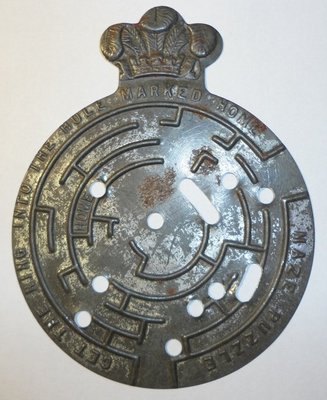
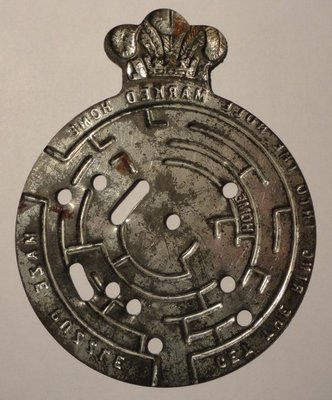
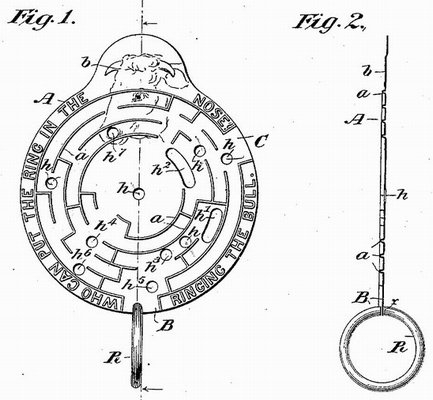 I finally found an example of the vintage Maze Puzzle, patented in 1892 by Joel W. Thorne
(483820)
(483820 on Google Patents)
I finally found an example of the vintage Maze Puzzle, patented in 1892 by Joel W. Thorne
(483820)
(483820 on Google Patents)
This is a ring-in-plate type maze - mine is missing the ring. Interestingly, the patent specifies an extra "decoy" hole, and a bull motif not used by the actual puzzle. The gap in the ring is supposed to be only just wide enough to fit the plate, not the raised maze walls. Also, note the elongated holes, which will allow the ring position to be adjusted for certain moves. Both those features are unusual for a ring-in-plate maze. |
|
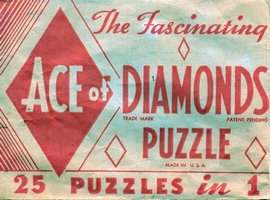
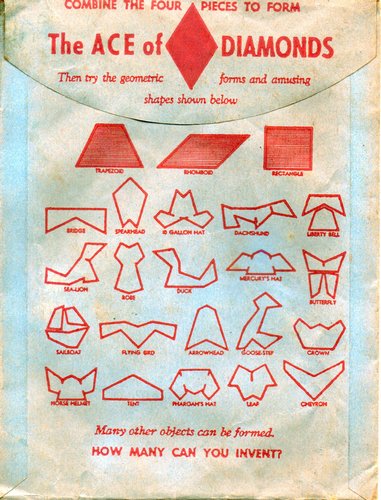
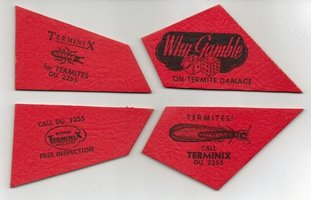 This is a vintage Ace of Diamonds puzzle. It is a four-piece dissection of a diamond shape.
The four pieces can also be used to make several other shapes as shown on the back of the envelope, including a rectangle
(but not a square) and the interesting "Goose-Step," so this puzzle
is a tangram-type as well.
This is a vintage Ace of Diamonds puzzle. It is a four-piece dissection of a diamond shape.
The four pieces can also be used to make several other shapes as shown on the back of the envelope, including a rectangle
(but not a square) and the interesting "Goose-Step," so this puzzle
is a tangram-type as well.
|
|
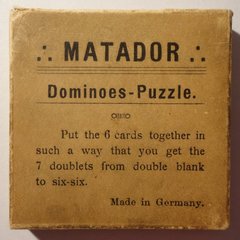
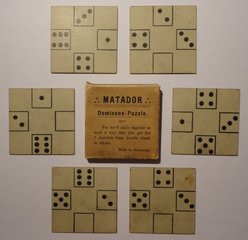 This vintage six-piece, square-tile edgematching puzzle from Germany is called the Matador Dominoes-Puzzle.
This vintage six-piece, square-tile edgematching puzzle from Germany is called the Matador Dominoes-Puzzle.
The backs of the tiles are blank. I have solved it, so it can be done. |
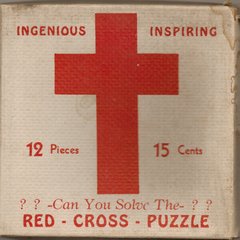
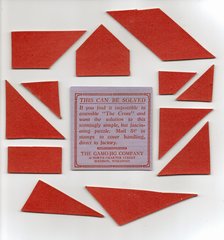 The vintage Red Cross Puzzle is a twelve-piece dissection of a cross (or the letter t).
The vintage Red Cross Puzzle is a twelve-piece dissection of a cross (or the letter t).
The small instructions slip identifies the source as The Gamo-Jig Company of 33 North Charter Street in Madison, Wisconsin. The pieces are heavy cardboard - the backs are plain, not red, so the pieces must not be flipped over. I have solved this one. |
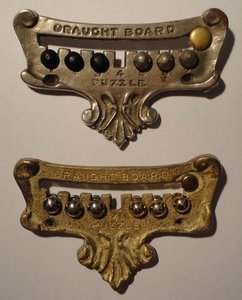
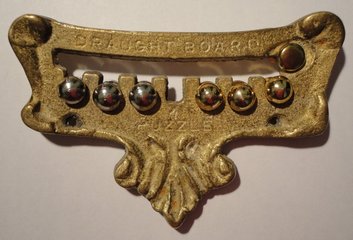
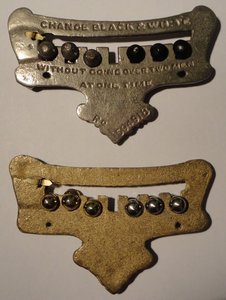
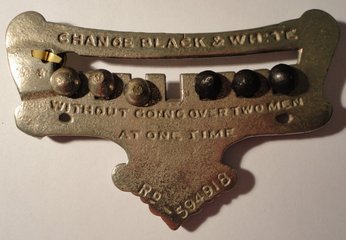
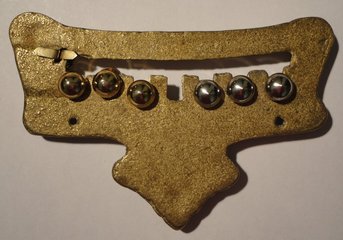 I found a second Draught Board puzzle - but this second one (the gold-hued one in the comparison photos) is
an inferior copy of the original silver-hued version I have.
In particular, see the photos of the backs of the two puzzles.
The copy is blank, while the original has instructions and a registry number (594918).
I found a second Draught Board puzzle - but this second one (the gold-hued one in the comparison photos) is
an inferior copy of the original silver-hued version I have.
In particular, see the photos of the backs of the two puzzles.
The copy is blank, while the original has instructions and a registry number (594918).
|
|
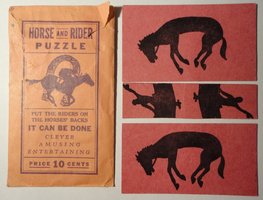 A vintage Horse and Rider cardboard puzzle.
A vintage Horse and Rider cardboard puzzle.
|
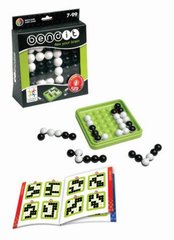
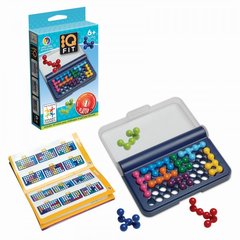 Two new puzzles from
Smart Games: Bendit and IQ Fit.
Two new puzzles from
Smart Games: Bendit and IQ Fit.
Both were designed by Raf Peeters. I found these at a Barnes & Noble store near me. |
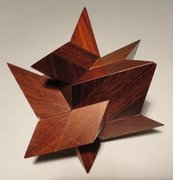
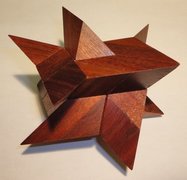
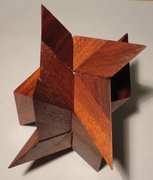
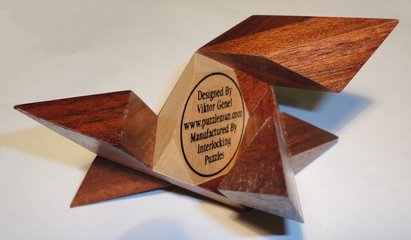
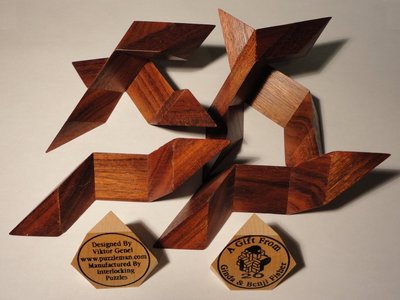
This puzzle is called Pulsar. It is based on a design by Victor Genel, modified by Benji and Ginda Fisher, and served as the Fishers' exchange puzzle at IPP 20. It was made by Wayne Daniel. In the modified design, two pieces are fused to two others, and the cubic central cavity is occupied by a bisected cube. |
||
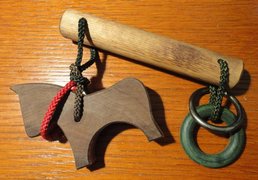
A tanglement puzzle featuring a wooden Horse - purchased from Rick Irby. |
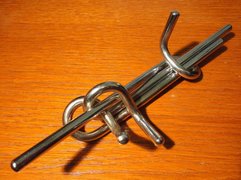
Triple Twister - purchased from Rick Irby. |
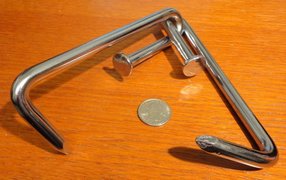
A very large pair of Nasty Nails - purchased from Rick Irby. |

Smartypants by Tucker-Jones, new for 2012. Purchased from Necker's. |
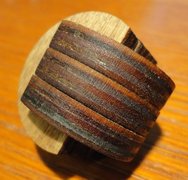
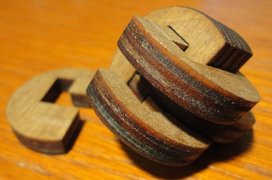
A six-piece "knot" laser-cut by Steve Kelsey at AccurateLaserEngraving. Thanks, Steve! |
|
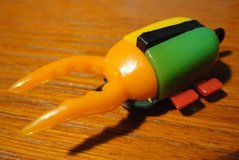
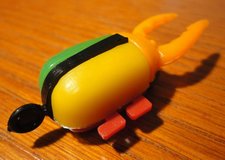
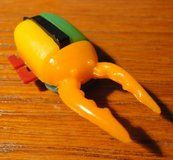
A keychain Stag Beetle with horns |
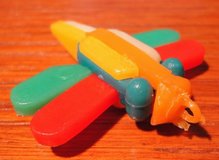
A keychain Dragonfly |
|
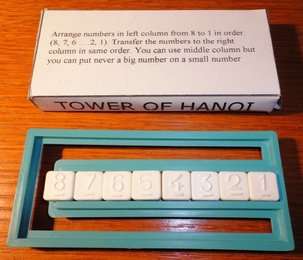
A "Tower of Hanoi" puzzle - thanks, Erhan! |
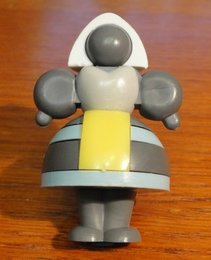
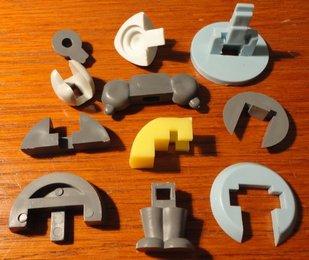
A keychain Woman - thanks, Erhan! |
|
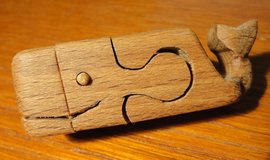
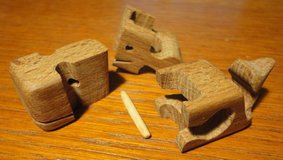
A small jigsaw Whale - thanks, Erhan! A visit to Erhan's puzzle blog is always worthwhile. |
||
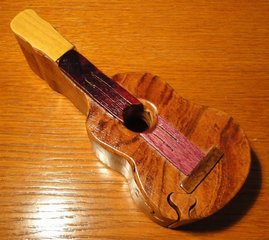
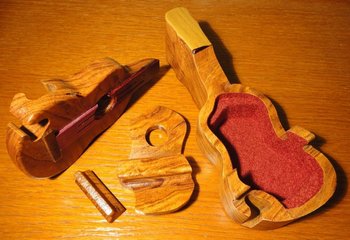
I received a thoughtful Father's Day gift - this Guitar puzzle, made in Costa Rica. Thanks, C! |
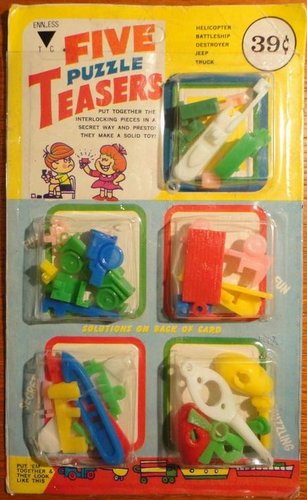
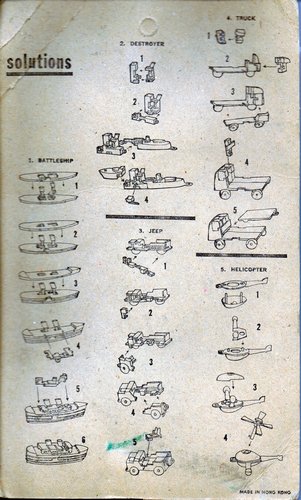
Keychain puzzle 5-pack I am very pleased to have found this - not only does it include a Helicopter, Flatbed Truck, and Destroyer (nice puzzles of which I already have copies), it also includes a Jeep with an unusual assembly, and the rare Battleship. |
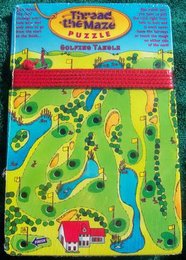
Thread the Maze Golf Tangle Invented by Shane Murphy The history of the Thread the Maze puzzle is online at toy-and-game-inventor-success.com. |
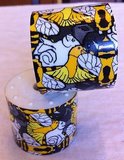
Magnetic Cylinder Puzzle |
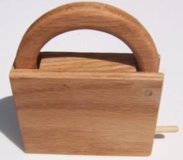
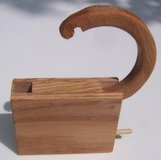
Wooden Padlock puzzle |
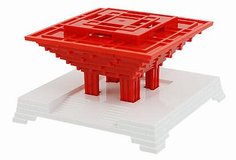
China Expo puzzle |
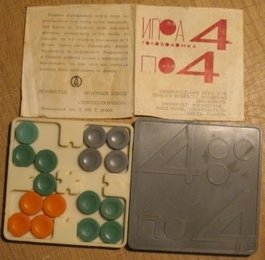
Russian 4x4 puzzle |
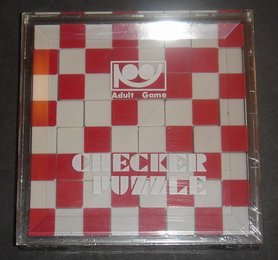
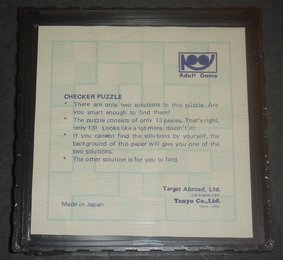
Tenyo Checker puzzle |
||
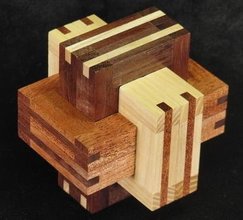
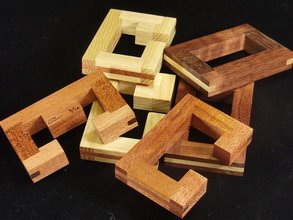
Chen's Six Board Burr Designed by Chi-Ren Chen Level 2.14.12 Made by Eric Fuller, in Walnut, Ash, and African Mahogany |
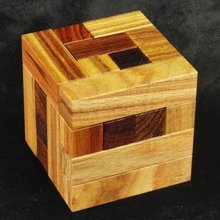
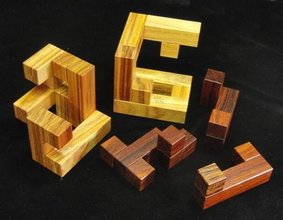
Slow Waltz - designed by Jeff Namkung Made by Eric Fuller, in Canarywood and Cocobolo. |
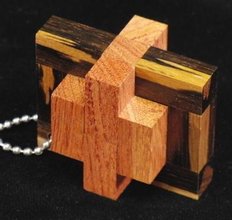
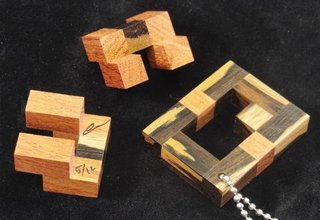
N-One - designed by Osanori Yamamoto Three pieces, level 15.3 Made by Eric Fuller, in Jacaranda Pardo and Bubinga |
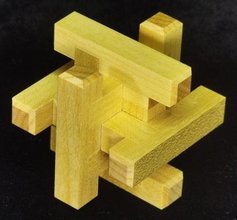
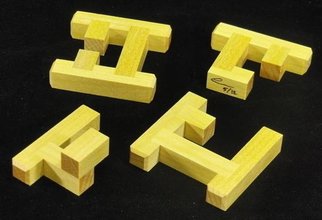
ISBR x 5 - designed by Mineyuki Uyematsu Made by Eric Fuller, from Yellowheart |
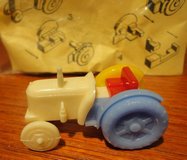
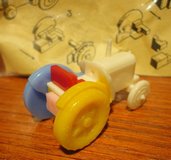
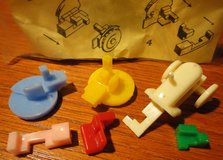
Keychain Tractor |
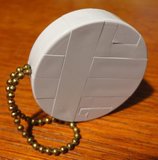
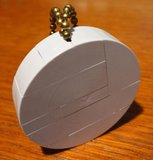
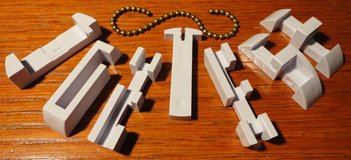
Keychain Cheese Wheel |
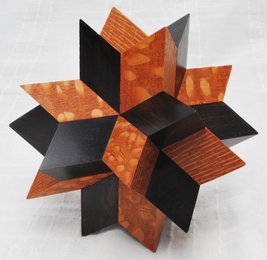
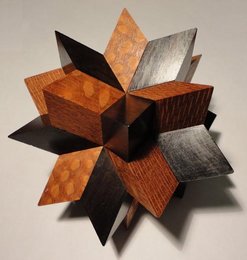
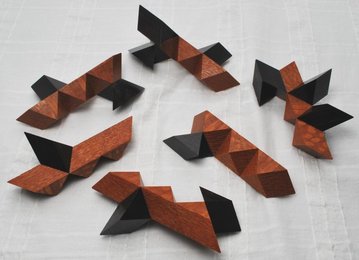
I received a beautiful Stellated Improved Square Face puzzle (SISF for short), designed and made by the talented Scott T. Peterson [W] [Y], based on the Square Face Puzzle designed by Stewart Coffin. My copy is made from Blackwood and Lacewood. |
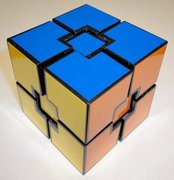
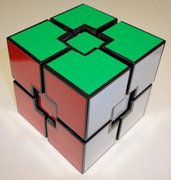
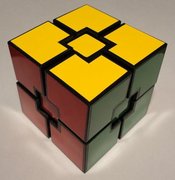
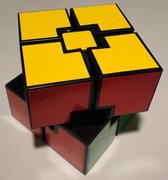
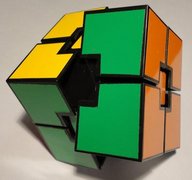
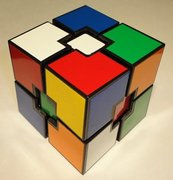
I received a pleasant surprise in the post, in the form of this great Simple Overlapping Cube twisty puzzle, cleverly made by TP forum member "Zzupler" (Kevin Phelan, of Ireland) [T], and originally designed by David Calvo [T]. It is nicely done and turns very smoothly. Thanks, Kevin! |
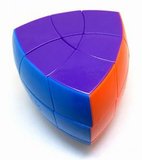
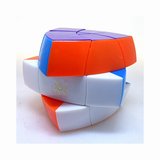
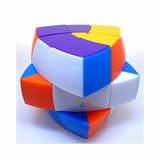
DaYan Pentahedron 3x3 |
||
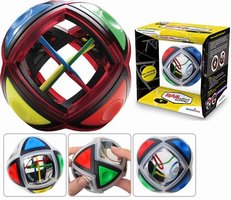
Brainstring R |
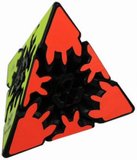
Meffert's Gear Pyraminx series II |
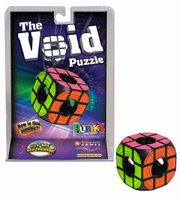
Rubik's Void |



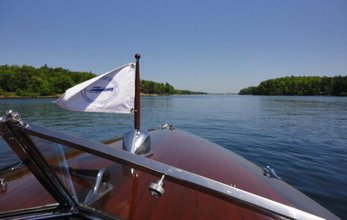
Took a trip up to the 1000 Islands area, but I did not find any puzzles. I did, however, have a wonderful ride in a vintage wooden speedboat, run by the Antique Boat Museum. Also visited Boldt Castle, and the Skydeck, from atop which I took the first two photos. |
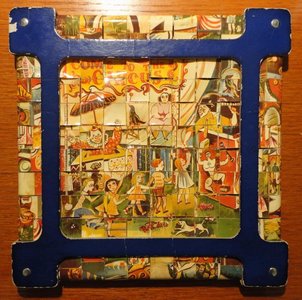
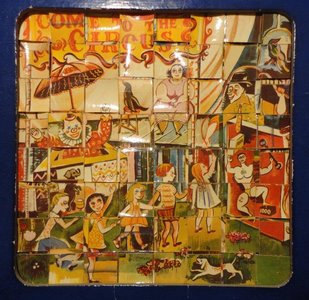
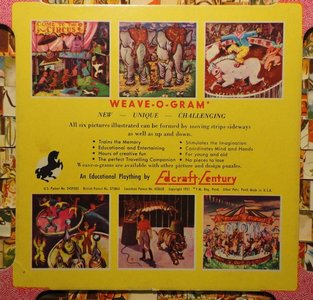
|
| This is a vintage Weave-O-Gram puzzle, copyright 1951 by Edcraft-Century. See US Patent 2439583 - awarded to Israel Shamah of London on Apr. 13, 1948. From the patent description - the Weave-O-Gram "comprises a framework and a plurality" (patent lawyers love that term) "of flexible bands some extending in one direction and the others at right angles thereto, the various bands being interwoven... and each being capable of relative movement. On each band there is provided a number of sections of a picture... by relative adjustment of the individual bands the various sections of the picture may be juxtaposed so that a complete picture is formed. Each band will be provided with the sections of a number of different pictures so that a number of different complete pictures may be made up." My copy allows one to make six different circus scenes. The bands move pretty freely, occasionally catching on small rough edges or tears. It is best to use both hands to move a band, slowly, from both edges of the frame simultaneously. As you might expect, Weave-O-Gram is not too challenging, however the graphics are nice and this is a great implementation of one of those ideas that seems obvious once you've seen it done. Also see the earlier US Patent 1903226 awarded to Harry Lawson Perry of Jamaica, New York on Mar. 28 1933. Perry's device employs linear strips rather than looped bands. Then see the later US Patent 3235262 - awarded to Ernest Frankl of Middleboro, MA on Feb. 15, 1966. It is pretty much a copy of Shamah's idea - Frankl's improvements are to "effect economies of manufacture and assembly and to provide for ease of manipulation and attractiveness." Frankl assigned his patent to Winthrop-Atkins Co. Inc. of Middleboro MA, a printing company now owned by Chilcote Co. of Ohio. From the book Classic Century Powerboats by Frank, Trudi, and Paul Miklos copyright 2002, published by MBI Publishing Company of St. Paul MN. I learned that the company Century (as of March 2012 purchased by Allcraft Marine) makes powerboats, and was founded in Milwaukee in 1926. In 1948, F. L. "Ted" Hewitt Jr. became president. Since boat production orders were seasonal - heavy from March through July and slack during the rest of the year, one of Hewitt's initiatives was to offset the downtimes by producing other, stable products such as toys. Century produced a line of educational toys under the brand Edcraft, including Weave-O-Gram. Shamah also patented (in the UK) a locking mechanism for a money box. |
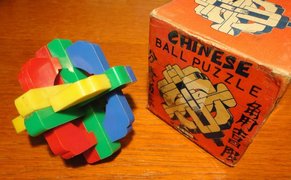
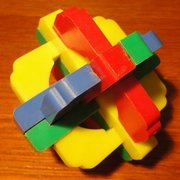
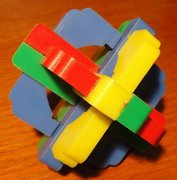
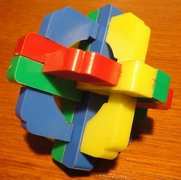
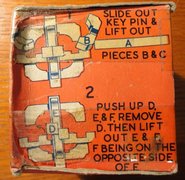
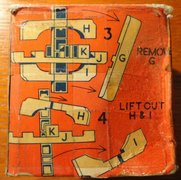
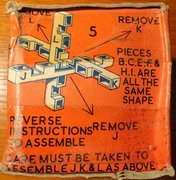
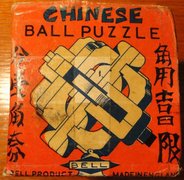
The Chinese Ball Puzzle from Bell of the U.K. A vintage interlocking burr. |
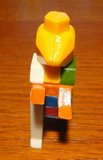
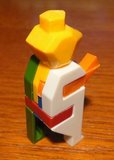
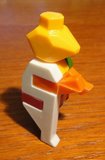
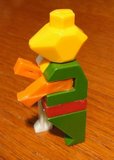
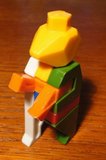
Keychain Bear |
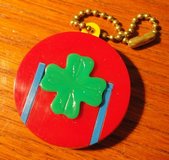
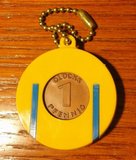
Keychain Lucky Charm |
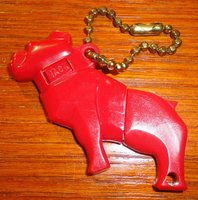
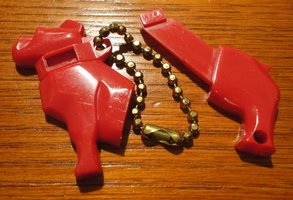
Keychain - Mack Bulldog Minimally interlocking (only two pieces) and minimally a puzzle - but still nice. |
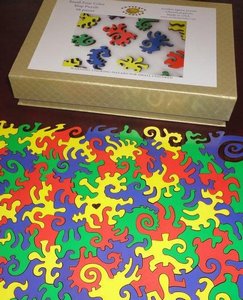 This is the Four Color Map Puzzle, from
Artifact Puzzles.
It is laser-cut from 1/4" wood, has 68 pieces, and is 6" x 8" when completed.
The puzzle is attractive - nicely made and brightly colored.
Each piece is monochromatic - either green, yellow, red, or blue.
The pieces were designed by Seattle artist Tara Flannery, who has designed
several other puzzles for Artifact.
The cutting style was inspired by
John Stokes III, and while this
puzzle has no "whimsy" pieces per se, all the cuts are so intricate that each piece is a tiny work of art.
Using
Bob Armstrong's classification method, I'd say this type is interlocking (of course),
with curl knobs, 1:1 contour lines, a scroll pattern, and irregular edges -
and to me, it looks like a map of
someplace out of
Dr. Seuss!
In the completed puzzle, no adjacent pieces have the same color.
This puzzle is of special interest because it incorporates the idea of a famous mathematics/graph-theory problem called the
Four Color Theorem, which holds
that any set of contiguous (touching) regions on a plane, no matter how convoluted their boundaries, can be colored such that no adjacent regions are the same color, using no more than four colors.
(Regions that meet only at a point are not adjacent.)
Although it was proven as far back as in 1890 that
no more than five colors are needed, proving that only four suffice was very difficult and was only
accomplished in 1976, by Kenneth Appel and Wolfgang Haken, using a computer.
Artifact Puzzles' Four Color Map Puzzle has been favourably reviewed by several puzzle bloggers, including
Brian,
Neil,
and
Allard.
I had fun with it, too - it took me about an hour to complete. I found the no-adjacent-pieces-the-same-color rule helpful (colorblind puzzlers will be more challenged).
This is the Four Color Map Puzzle, from
Artifact Puzzles.
It is laser-cut from 1/4" wood, has 68 pieces, and is 6" x 8" when completed.
The puzzle is attractive - nicely made and brightly colored.
Each piece is monochromatic - either green, yellow, red, or blue.
The pieces were designed by Seattle artist Tara Flannery, who has designed
several other puzzles for Artifact.
The cutting style was inspired by
John Stokes III, and while this
puzzle has no "whimsy" pieces per se, all the cuts are so intricate that each piece is a tiny work of art.
Using
Bob Armstrong's classification method, I'd say this type is interlocking (of course),
with curl knobs, 1:1 contour lines, a scroll pattern, and irregular edges -
and to me, it looks like a map of
someplace out of
Dr. Seuss!
In the completed puzzle, no adjacent pieces have the same color.
This puzzle is of special interest because it incorporates the idea of a famous mathematics/graph-theory problem called the
Four Color Theorem, which holds
that any set of contiguous (touching) regions on a plane, no matter how convoluted their boundaries, can be colored such that no adjacent regions are the same color, using no more than four colors.
(Regions that meet only at a point are not adjacent.)
Although it was proven as far back as in 1890 that
no more than five colors are needed, proving that only four suffice was very difficult and was only
accomplished in 1976, by Kenneth Appel and Wolfgang Haken, using a computer.
Artifact Puzzles' Four Color Map Puzzle has been favourably reviewed by several puzzle bloggers, including
Brian,
Neil,
and
Allard.
I had fun with it, too - it took me about an hour to complete. I found the no-adjacent-pieces-the-same-color rule helpful (colorblind puzzlers will be more challenged).
|
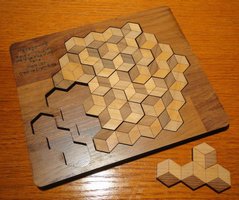
Hexagon 10 |
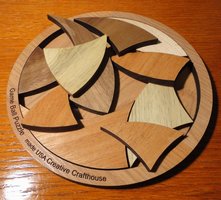
Game Ball Puzzle |
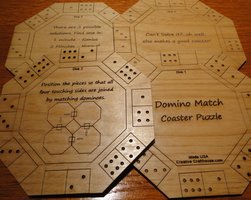
Domino Match |
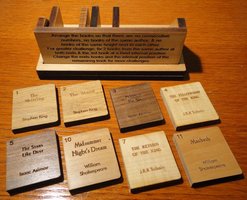
Dewey's Dilemma |
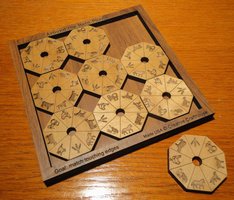
Around the Barn |

Trail Run |
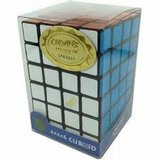
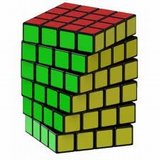
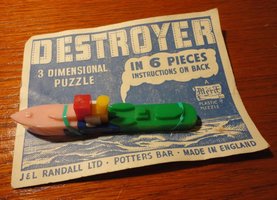
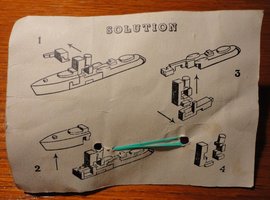
Destroyer - Merit |
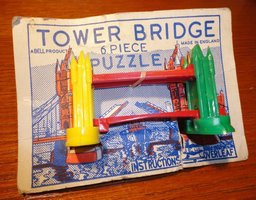
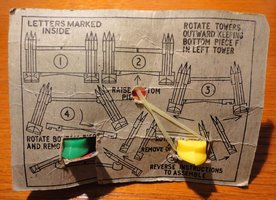
Tower Bridge - Bell |
||
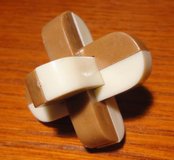
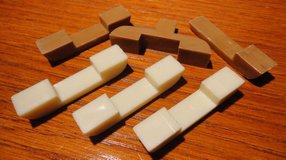
Keychain Burr - Brown & White |
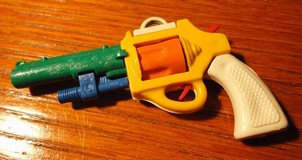
Keychain Revolver |
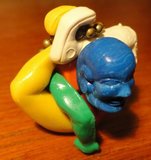
Keychain Wrestler |
|
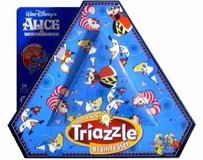
Triazzle - Alice in Wonderland |
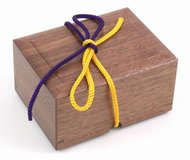
String Box Part II - Tsuburai |
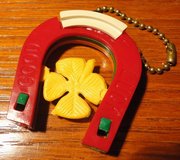
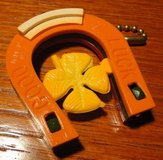
Keychain Good Luck - Clover version |
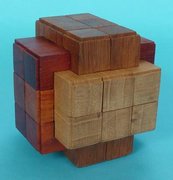
Barely Sane for Extreme Puzzlers - designed and made by Jack Krijnen The record holder for highest level traditional 18-piece burr, at 152.7.9.5.11.14.4.1.1.1.1.2. |
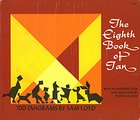
The Eighth Book of Tan - Sam Loyd |
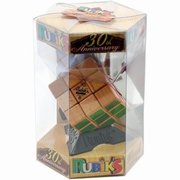
Rubik's 30th Anniversary Wooden Cube |
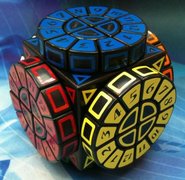
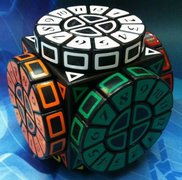
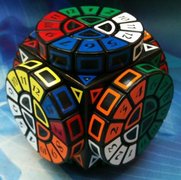
The Time Machine - a beautiful twisty puzzle designed, made, and stickered by Smaz. [T] [T] [T] A 2x2x2 where each face has a "dial" of 12 movable segments. Similar to the Square-1 Cross Cube. [T] |
||
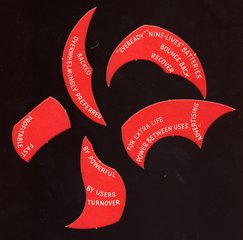
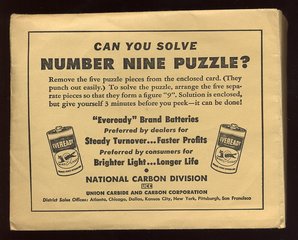
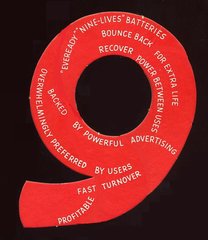
A vintage five-piece cardboard Number Nine Puzzle, issued by the National Carbon Division of Union Carbide and Carbon Corporation, advertising Eveready Batteries. I have obscured the borders of the individual pieces in the photo of the solution. |
||
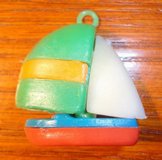
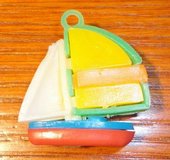
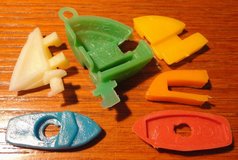
Keychain Sailboat - soft plastic |
||






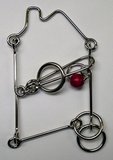

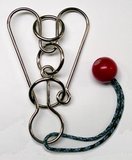
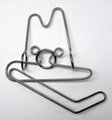
Trouble Clef, Squaring Off, Sputnik, Spirit is Willing, Coiled Again, Double Trefoil, House Arrest, Paper Clip, Heartbreaker, Hat Trick |
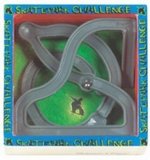
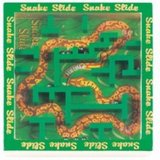
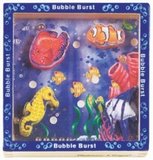
Three Melissa & Doug Pocket Mazes - Skate Park Challenge, Snake Slide, and Bubble Burst |
|
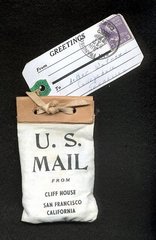
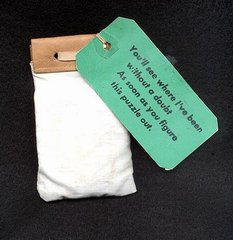
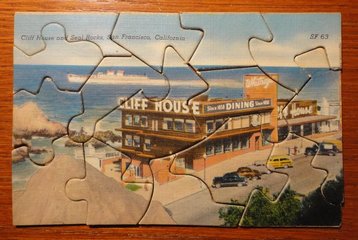
"Cliff House and Seal Rocks, San Francisco, California" A small vintage 15-piece jigsaw in a Mail Bag. |
|
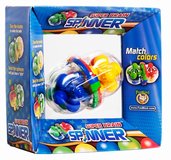
Super Brain Spinner, from FoxMind DieN Logical Toys |
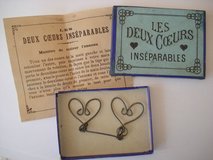
Vintage boxed French tanglement Les Deux Coeurs Inseparables |
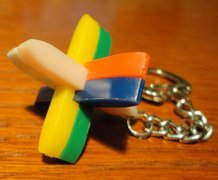
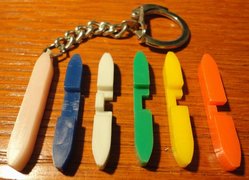
Keychain Burr - France |
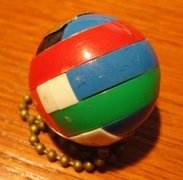
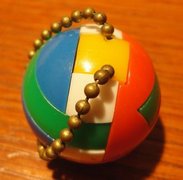
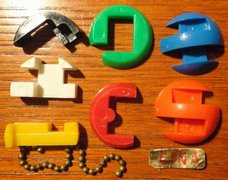
Keychain Sphere - France |
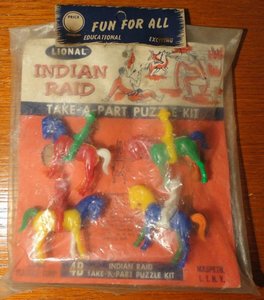
"Indian Raid" - a set of four keychain puzzles from Lional |
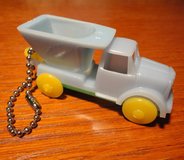
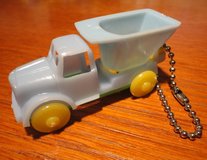
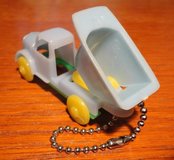
Keychain Dump Truck |
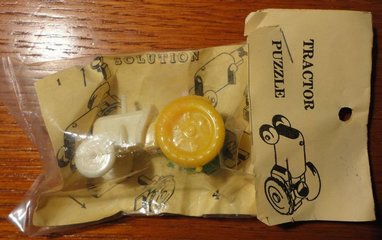
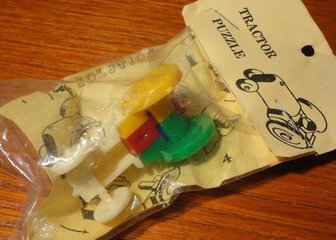
Keychain Tractor |
|
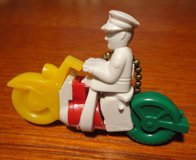
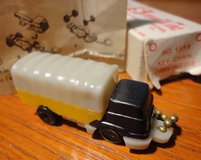
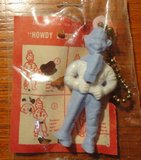
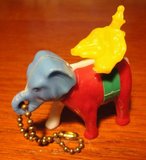
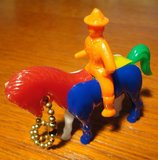
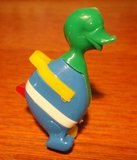
Keychain Puzzles - Motorcycle Cop, Lorry, Howdy Doody, Elephant w/ Clown Rider, Scout, Duck |
|
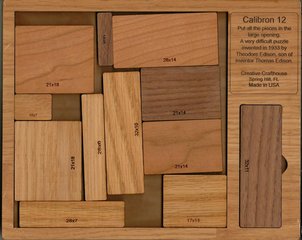
The Calibron 12 Block Puzzle - Creative Crafthouse |
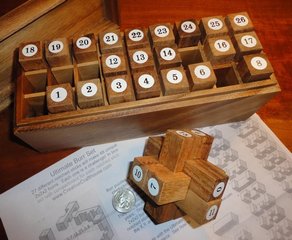
The Ultimate Burr Set - Creative Crafthouse |
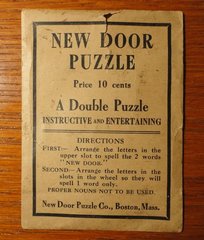
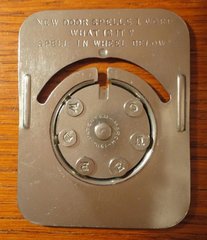
The New Door Puzzle Slide the buttons using the central carousel, to transform the letters of "NEW DOOR" into 1 word. A nice metal implementation of a well-known anagram puzzle. SPOILER ALERT: See U.S. Patent 1132430 issued to Brogan and Bruner on March 16, 1915. My copy is missing one of the buttons (one of the 'O's). |
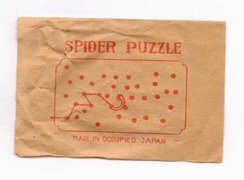
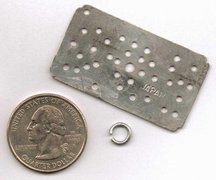
The Spider Puzzle made in Occupied Japan |
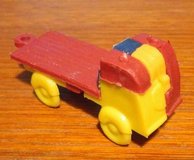
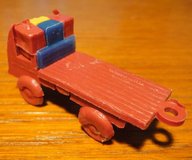
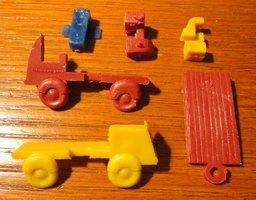
A flatbed truck interlocking keychain puzzle. This design was issued by Merit. This copy is made from soft plastic. |
||
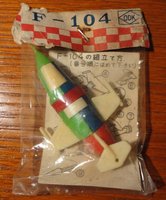
Keychain F-104 - Japan |
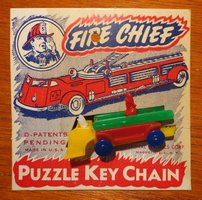
Keychain Fire Chief truck on card |
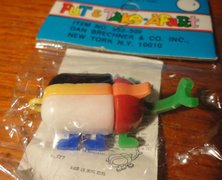
Keychain Beetle in package |
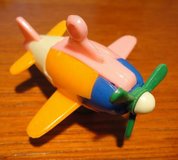
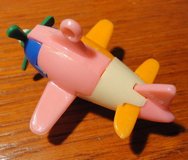
Keychain Airplane |
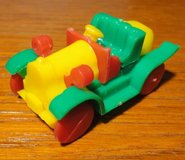
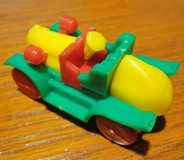
Keychain Touring Car |
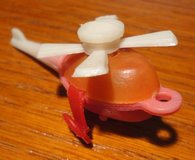
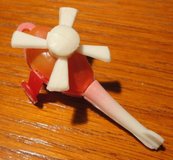
Keychain Helicopter The Lido design, but in soft plastic. |
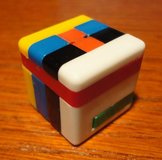
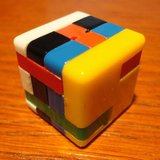
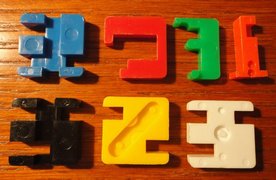
Keychain Cube I know this as the "Frankfort Cube" - this instance is in hard plastic. |
||
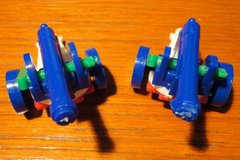
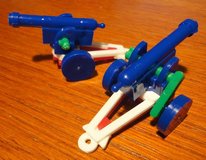
A pair of interlocking keychain puzzle cannons. |
||
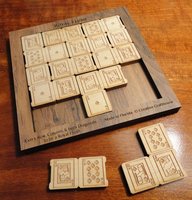
Royal Flush Arrange the seven L trominoes and 2 dominoes in a 5x5 grid such that every row, column, and both main diagonals contain a Royal Flush (in spades). |
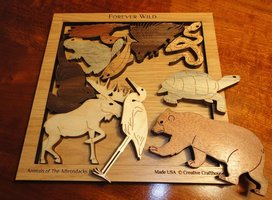
Forever Wild - Animals of the Adirondacks Pack the ten nicely laser-cut animals into the tray. The animals all go in with a specific side upwards. |
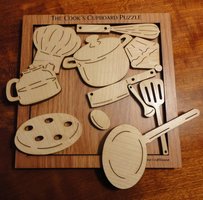
The Cook's Cupboard Puzzle Pack the eleven kitchen items into the tray. |
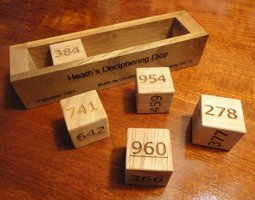
Heath's Deciphering Dice A 1927 magic trick by Royal V. Heath. A spectator rolls the five dice, each bearing a different 3-digit number on each face, and the magician can quickly announce the total of the five upward faces. |
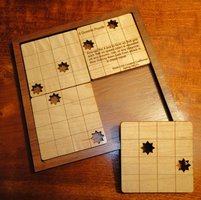
Save the Queens Dave's nice implementation of the Eight Queens puzzle variant "Brain Drain" produced back in the 1970's. |
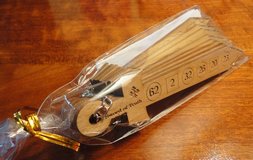
Swords of Truth A magic trick where the magician can name the spectator's selected number. |
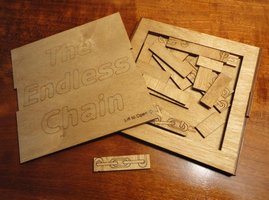
The Endless Chain Arrange the pieces in the tray to form a closed loop of chain links. |
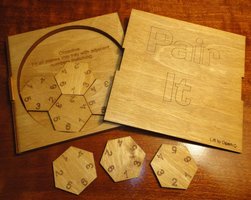
Pair It Arrange the seven hexagonal pieces such that edges match. |
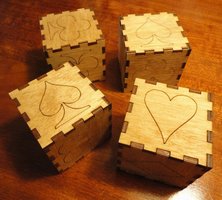
Suits Me Arrange the four cubes in a row such that all four long sides show each suit once. (Eq. to SK) |
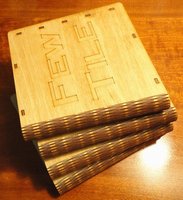
Steve has produced a set of Stewart Coffin tray-packing designs, each cleverly housed in a laser-cut wooden "book" case, with a flexible "binding." |
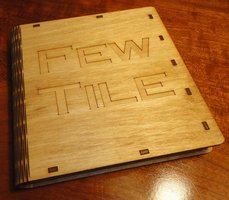
Few Tile (closed) |
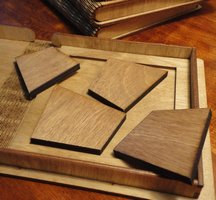
Few Tile (pieces) |
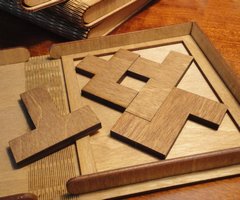
Four Fit (pieces) |
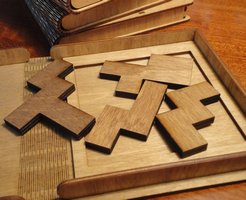
Four Sleazy Pieces (pieces) |
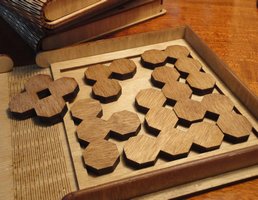
Engelberg Square (pieces) |

John Devost kindly sent me this copy of the classic vintage 1927 puzzle compendium book The Book of Puzzles by A. Frederick Collins. Collins' book is a successor to Hoffmann's seminal 1893 Puzzles Old and New. You can find out more about Collins' book at The Metagrobology Wiki. Thanks much, John! |
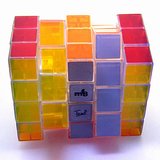
Tom van der Zanden's great 3x4x5 cuboid twisty puzzle has been mass-produced by Mf8! I have an original Shapeways print, but I also ordered this transparent version. |
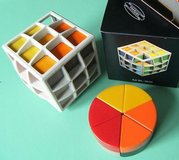
I found these two vintage puzzles - an original Rubik's Cheese and a Vadasz 3x3x3 Rainbow Cube. |
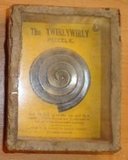
A vintage Twirlywirly dexterity puzzle by Journet |
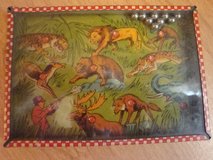
Another vintage dexterity puzzle, the Jungle Puzzle |
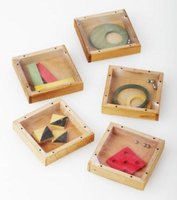
A set of small vintage wooden deterity puzzles, made in Japan |
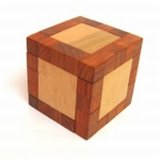
Take Me Apart - designed by Bruce Viney, made by Brian Menold at Wood Wonders, from Padauk and Cherry |
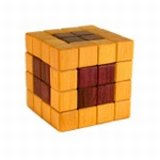
Don's Dilemma - designed by Don Kuchen, made by Brian Menold at Wood Wonders, from Yellowheart and Purpleheart |
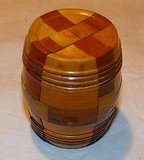
A vintage turned wooden Kumiki Barrel, coming over from the UK |
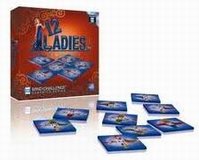
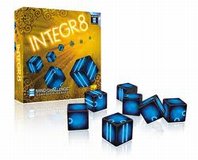
Two edgematching pattern puzzles, one planar and one 3-D, from the Dr. Wood Mind Challenge series, 12 Ladies, and Integr8. |
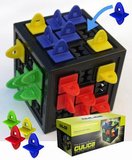
The folks at Culica kindly sent me a copy of their new puzzle/game. It comes with a set of colored pegs, a cube into which the pegs fit, 9 on a side, and a set of cards giving instructions for playing a variety of group and solo challenges. Thanks! |
|
|
Puzzle friend and renowned sculptor and mathematician
George Hart
has been creating beautifully symmetric, complex, and puzzling geometric assemblies for some time.
Large versions of many of George's sculptures have been installed at universities, parks, and various other public and private spaces. George has recently joined the team at the Museum of Mathematics, scheduled to open in New York City in late 2012. You can now own a copy of one of George's beautiful designs - it's called Frabjous and is available from the folks at Artifacture in Dallas, who sent me this 6" x 6" x 6" Special Edition Frabjous, laser cut from Acrylite Radiant Acrylic. Thanks, Michael! This type of acrylic material reflects light in different colors from different angles and provides a fascinating display of varying hues as you move around the sculpture. The puzzle sculpture comes unassembled, in a package that includes instructions, 31 S-shaped pre-notched interlocking pieces (one extra piece is thoughtfully provided), and even a pair of cotton gloves to wear during assembly, so that you can avoid getting fingerprints in hard-to-clean places! Artifacture sells direct through various online outlets (see links on their product page), including their Etsy shop. Artifacture has produced Frabjous for MoMath (the MoMath logo, and George Hart's name, are engraved on one piece) and Frabjous is also available at the MoMath online shop. (A less expensive version is available in blue.) It took me about an hour to assemble Frabjous. I had to recover from a false start when I realized I had been careless while interweaving some of the pieces. I disassembled what I had so far and started over, being much more deliberate. The pieces lock together by friction/pressure fit using simple rectangular tabs and notches at apexes where three pieces meet - the hold is secure, but it is possible to work the pieces apart again without too much trouble. One thing I was pleased about is that though acrylic in general seems to have an unfortunate tendency to crack at angular cut-outs, I experienced no faults in any of the Frabjous pieces even after I had attached and detached them multiple times. During my second try at putting Frabjous together I actually found that if I ignored the included instructions and instead concentrated on the five-fold symmetry of the structure, adding five pieces at a time in symmetry around the growing assembly, I could much better ensure the correct relative placement of the pieces. Something to note is that you cannot simply create a bunch of "tripods" and then expect to link them together - it is too difficult to properly interweave such sub-structures. I took photos along the way - I think you'll agree that Frabjous is a beautiful object! I can also attest that Frabjous is a puzzling challenge to assemble, and you will enjoy a nice sense of satisfaction on completing it. My wife even let me put this one on display in the family room! |
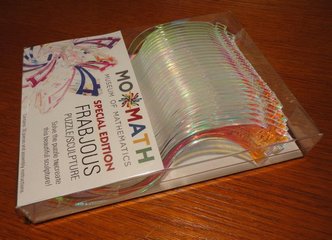
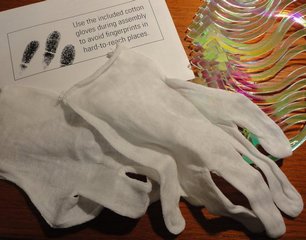
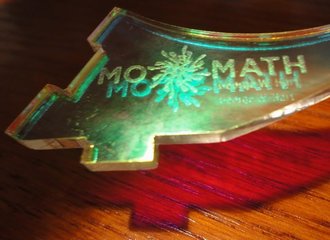
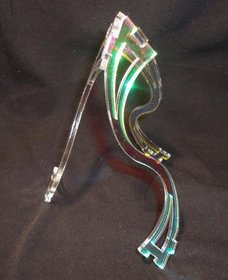
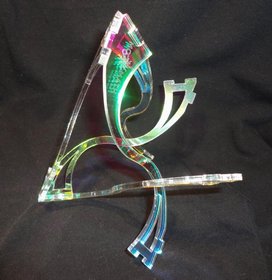
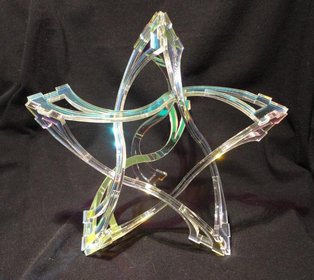
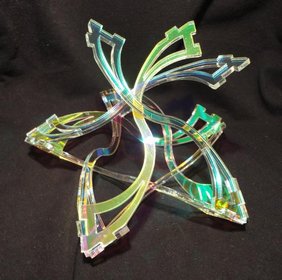
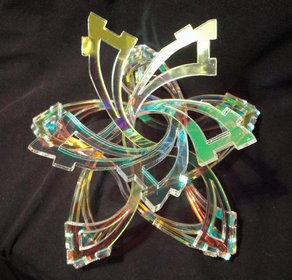
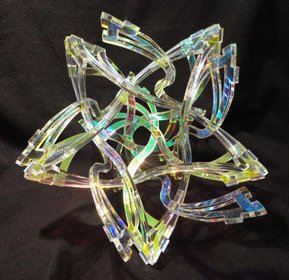
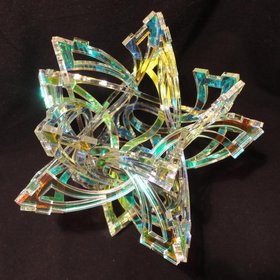
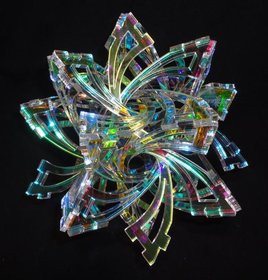
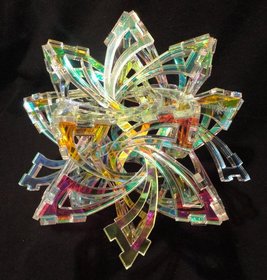
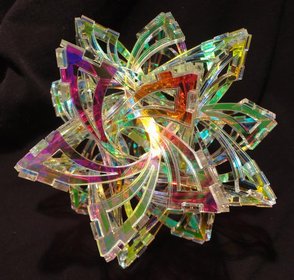
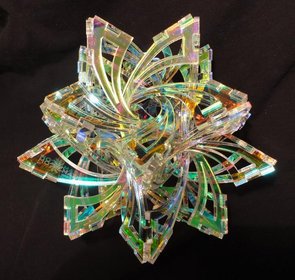
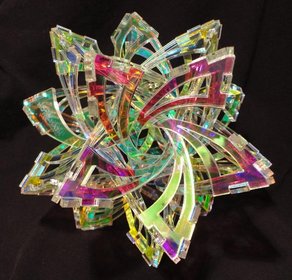
|
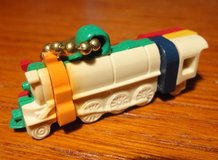
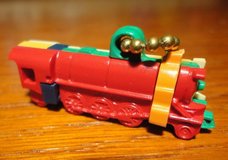
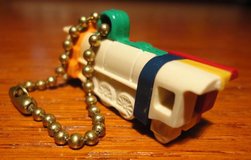
A keychain locomotive (small) |
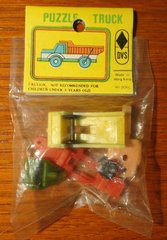
A keyhain Dump Truck, in its package |
|
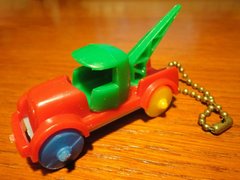
Keychain Tow Truck |
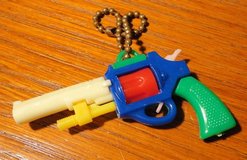
Keychain Revolver |
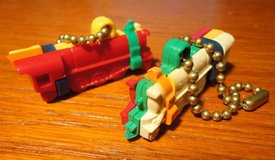
A second Keychain Locomotive (small) |
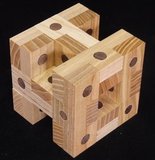
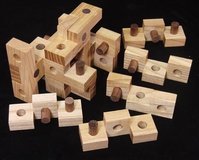
Alchemy, designed by Brian Young, made by Eric Fuller, from Ash wood. |
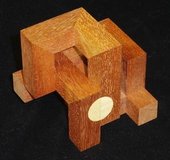
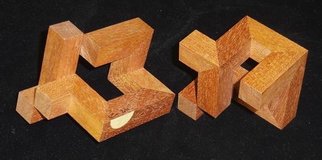
Sun, designed by Jos Bergmans, made by Eric Fuller, from Sapele wood. |
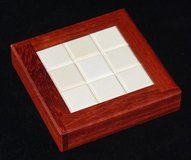
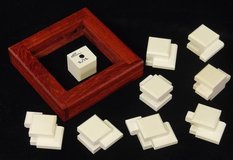
Tom's Square Dance, designed by Tom Jolly, made by Eric Fuller, from Padauk and Holly woods. |
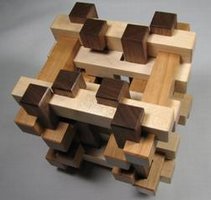
The Visible Burr, designed by Bill Cutler, made by Jerry McFarland, from Cherry, Maple, and Walnut woods. |
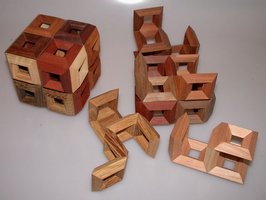
The Open Cube, designed by Marc van Kreveld and Theo Geerinck, produced by PuzzleWood |
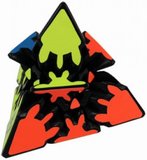
The Gear Pyraminx, designed by Timur Evbatyrov, produced by Meffert. |
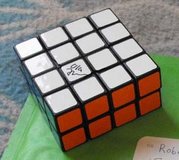
A 2x4x4 Cuboid, made by Olz |
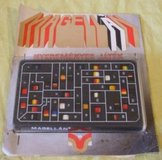
A vintage Magellan puzzle, in black and in its package |
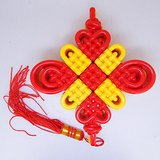
A Chinese Knot 2x3x3 twisty puzzle |
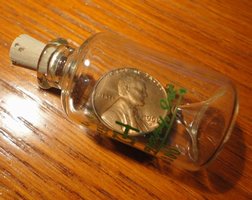
An impossible Penny in a Bottle |
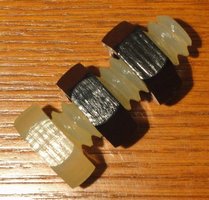
A while back I received from Scott Elliott (Thanks, Scott!), a copy of his Screwy Screw - an "impossible object" type puzzle where the objective is to figure out "how did he do that?" In this case, the two nuts spin on or off the bolt in opposite directions! I.e., one spins clockwise to go on and the other spins counterclockwise to go on. Scott discusses this puzzle on his blog, here, here, here, and here. |
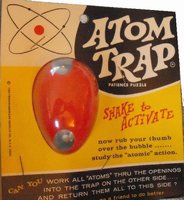
The Atom Trap - a vintage 1969 dexterity puzzle from the Franco-American Novelty Company of NYC. The transparent hollow egg contains a divider panel having two holes, and is filled with a bunch of styrofoam beads. The objective is to move the beads all to one side of the panel or the other - but the beads acquire a static charge when the egg is shaken, and hilarity ensues as they fail to cooperate. |
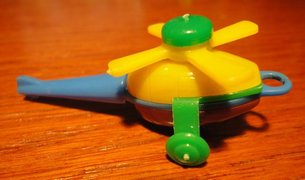
Keychain Helicopter by Lido |
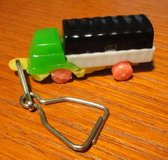
Keychain Covered Truck |
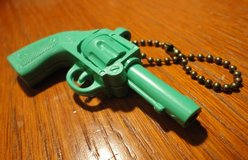
Keychain Revolver |
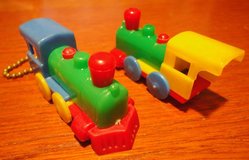
Keychain Locomotive (I found a sound one to go with my damaged copy.) |
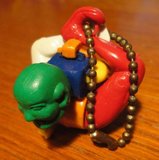
Keychain Wrestler |
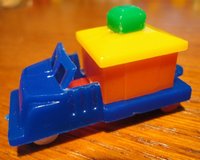
Keychain Kottage Kar |
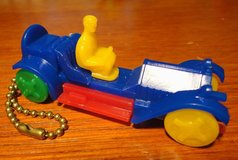
Keychain Open Car |
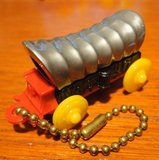
Keychain Covered Wagon |
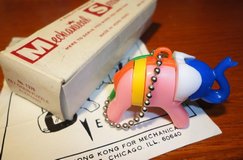
Keychain Elephant - Mechanical Servants |
At the 2012 New York Puzzle Party (NYPP) hosted by Tom Cutrofello, I bought this hand-made Slice Cube from fellow attendee and twisty puzzle enthusiast "Zhewei."
He had posted about this puzzle on the Twisty Forums
here.
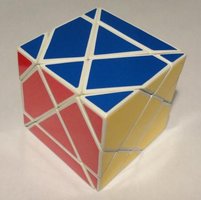
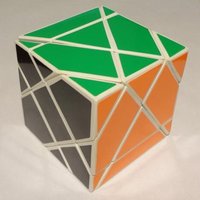
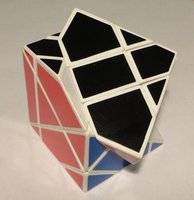
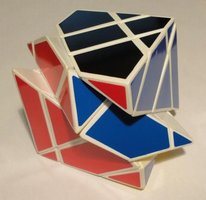
|
If the standard 33 cube is rotated 45° about one face's axis (e.g. z axis) then built up and cut down to be re-formed into a cube,
one obtains the Fisher's Cube; approx. 30° around z
[T]
gives the Windmill Cube;
45° around z and x (or 90° about an edge-to-edge axis) gives the Slice Cube;
combining Fisher's and Windmill gives a "normal-sized" Greenhill's Cube (which is actually larger -
Anthony says
[T]
it is "a 'Truncated Cube' (corners trimmed down to triangles), stood on one corner then built out to a Cube shape. This basically determined the edge length - 77mm.");
60° about a corner-to-corner axis gives the Axis Cube
[T]
[T].
An "axised" Cube with twists, reformed into a cube gives the Ghost Cube
[T].






|
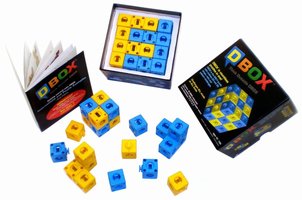
D Box - a puzzle construction kit, designed by the Light brothers See www.dboxpuzzle.com |
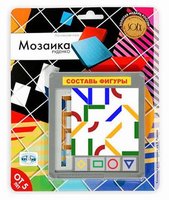
Rudenko Mosaic |
|
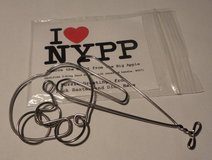
I Heart NYPP - a gift from Nick Baxter and Dick Hess - Thanks! |
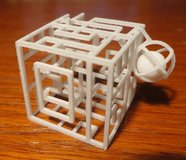
Ethereal Maze - designed by Steve Winter See Steve's Shapeways shop a gift from Brett - Thanks! |
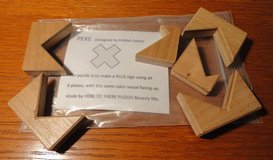
PEKE - designed by Kohfuh Satoh made by Saul Bobroff at Here to There Puzzles of Beverly MA. a gift from Saul - Thanks! |
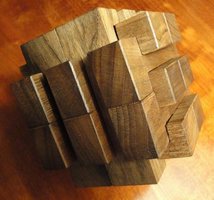
Phelan, designed by Alfons Eyckmans made by Maurice Vigouroux, from Walnut from the French online puzzle shop Arteludes.com run by Jean-Baptiste Jacquin and Maurice Vigouroux |
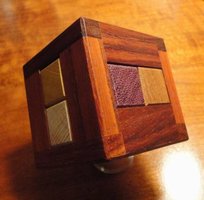
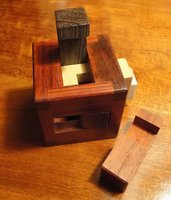
Burr in Cage, designed by Ishino made by Maurice Vigouroux, from Padauk from the French online puzzle shop Arteludes.com run by Jean-Baptiste Jacquin and Maurice Vigouroux |
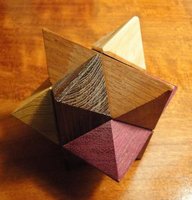
Rhombic Star - Arteludes - Thanks! |
|
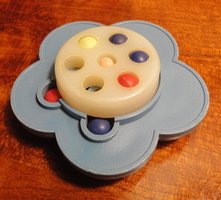
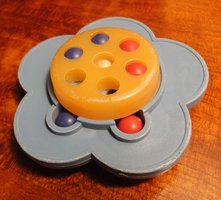
I finally found a Russian Festival Flower |
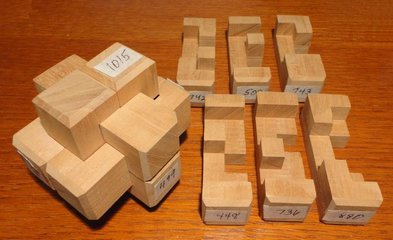
Colin Gaughran is a woodworker in Lyme, Connecticut. Colin can make any burr pieces, notchable, millable, or even general, using his CNC machine. You can contact him via his eBay sale here. I gave him permission to use my piece ID graphic so you can clearly specify your desired pieces. (I put labels on mine so I can easily identify them.) |
|
Four unusual sequential-movement puzzles from Russia, courtesy of Wil Strijbos.
These are all designed and patented by Dr. Valery Rudenko. See www.roscreative.ru [Y] |
|||
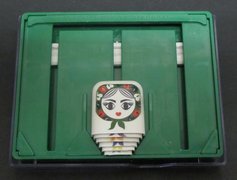
Rudenko Matroyshka [Y] |
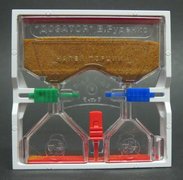
Rudenko Doser [Y] |
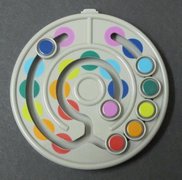
Rudenko Disc [Y] |
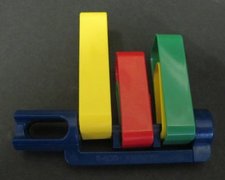
Rudenko Clips [Y] A clever implementation of the Towers of Hanoi |
| Four rare vintage interlocking keychain puzzles from Japan, courtesy of Mike van Buiten of the Netherlands. | |||
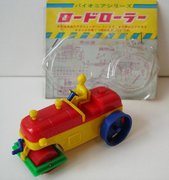
Steamroller |
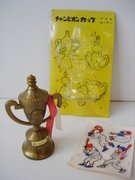
Trophy Cup |
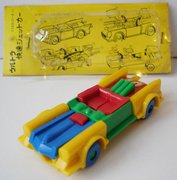
Batmobile |
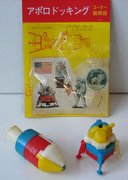
Apollo Command Module and LEM |
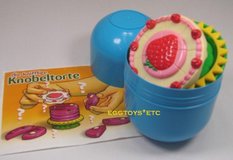
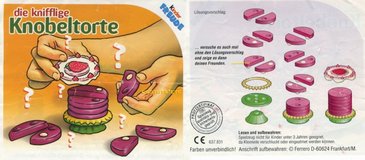
Knobeltorte A put-together egg puzzle. |
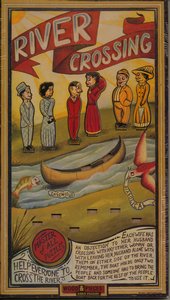
River Crossing - Bepuzzled 1997 Canada Get the 3 couples by twos across the river - A man cannot cross with any woman but his wife, and cannot be alone with other women on either bank. A simple and attractive wooden implementation. |
|
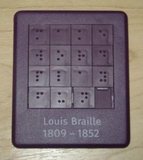
Braille sliding piece puzzle |
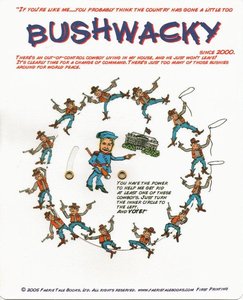
Bushwacky A modern version of Sam Loyd's classic Get Off the Earth vanish puzzle. |
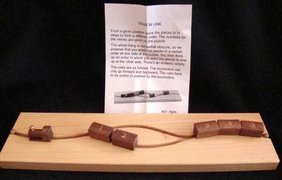
Train in Line - Bits & Pieces A nice wooden railroad shunting puzzle with 5 numbered cars. |
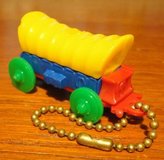
Keychain Wagon (8 part) |
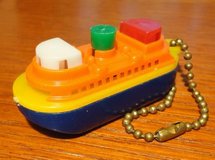
Keychain Showboat |
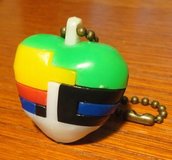
Keychain Heart |
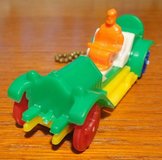
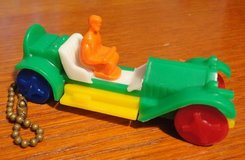
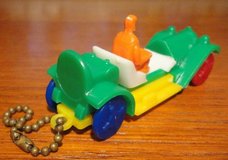
Keychain Open Car |
||
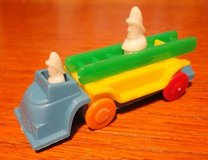
Keychain Firetruck |
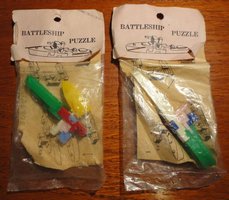
Keychain Battleships, in bags |
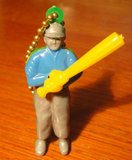
Keychain Batter |
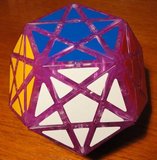
I stickered my purple Mf8 Starminx. As people have noted, it does not turn as smoothly as Tom's (admittedly much more costly) 3D printed version. |
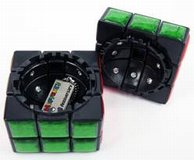
I received a black Treasure Chest cube from Mefferts. This hollow, opening cube was designed by Oskar van Deventer - he called it the Gift Cube. [T] |
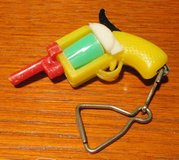
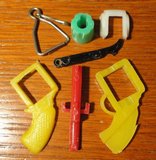
This interlocking keychain puzzle revolver came from Israel. As you can see from the photo of its parts, it is distinct from the two other revolver puzzles I have. |
|
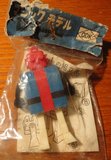
Slocum and Waite identify this Japanese interlocking keychain puzzle as a Diver, but it reminds me of Gigantor. |
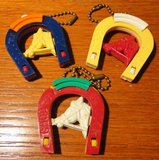
I found two additional Good Luck Horseshoe/Horsehead puzzles. |
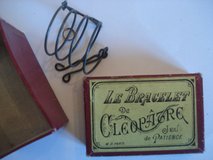
Le Bracelet de Cleopatre A vintage French boxed wire puzzle. I've been looking for this one for a while! |
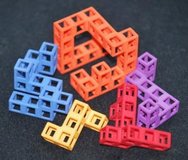
Quickstep - designed by Jeff Namkung A Level 11.5.3.3 4x4x4 cube. Printed via Shapeways and dyed by Richard Gain |

The Moscow Puzzles - Boris Kordemsky |
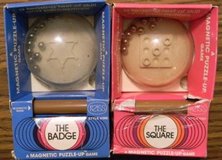
The Badge and The Square Two Magnetic Puzzle Up Games, dexterity challenges copyright 1979 by Reiss Games Inc. Each comes with a magnetic wand, to be used to correctly stack the steel balls inside the plastic domes. |
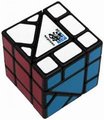
DaYan Bermuda Cube Neptune (black) |
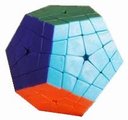
Mf8 Master Kilominx (solid colors) |
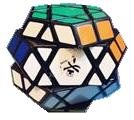
DaYan Gem IV Deepcut (black) |
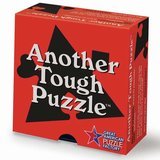
Another Tough Puzzle (Triangles) - Great American Puzzle Factory |
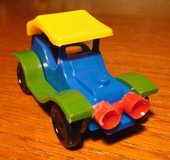
Keychain interlocking puzzle car (Germany) |
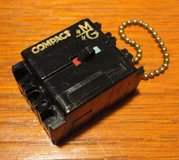
Keychain interlocking puzzle Circuit Breaker (France) |
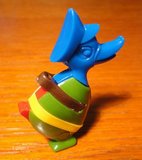
Keychain interlocking puzzle Duck w/ Seaman's cap |
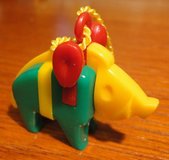
Keychain interlocking puzzle Hedgehog (Germany) |
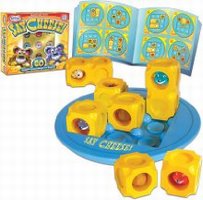
Say Cheese - Popular Playthings A rolling-block route-finding puzzle, designed by Eric Harshbarger. |
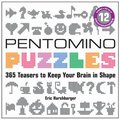
Pentomino Puzzles by Eric Harshbarger |
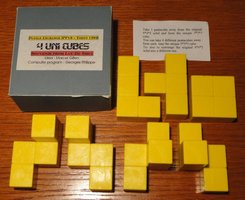
4 Uni Cubes - idea by Marcel Gillen, Program by Georges Phillippe IPP18 (Tokyo) exchange puzzle from Luc De Smet Includes 7 plastic polycube pieces - the O, L, and T tetracubes, and four pentacubes - two mirror-image pairs N1 and N2, and S1 and S2. Comes packed in the box in a 2x4x4 arrangement. Five challenges - you can remove each of the four pentacube pieces in turn and with the remaining six pieces make a 3x3x3 cube; also, find an alternative to the 2x4x4 solid. |
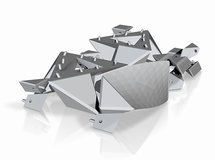
Tanacube Too Small - Oskar van Deventer The Tanacube Too is Oskar's solution to a challenge originated by Peter Rasmussen and Wei Zhang, to create a cubic puzzle having the classic Tangram Square dissection appearing on each face, and meeting other criteria. You can read about the challenge at ChinesePuzzles.org/tanacube, also at George Miller's Puzzle Palace website, and in CFF #65, November 2004, in the article Tangram Cubes: A Collaborative Effort, by Peter Rasmussen and Wei Zhang. George Miller had offered 3-D printed copies of Oskar's Tanacube Too (at $550), but George has shut his online shop. Oskar kindly created a Shapeways model of Tanacube Too at a more reasonable price. Oskar then created the smaller, less expensive, Tanacube Too Small shown here. Bill Darrah created the first solution to the challenge, called the Tanacube. You can see Bill Darrah's Tanacube at George Miller's Puzzle Palace website, at Bernhard Schweitzer's Puzzlewood website, and in Neil's Puzzling Parts blog entry of May 23 2011 (California Puzzle Party). The wooden versions were made in the Pelikan workshop and originally cost $350. Both Tanacube and Tanacube Too were entered in the IPP 2004 Design Competition, but neither won an award - they were up against some stiff competition! |
|||
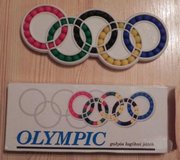
Hungarian Olympic Rings |
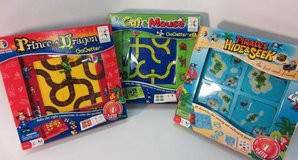
Some puzzles from SmartGames, including Pirates Hide & Seek, GoGetter Cat & Mouse, and GoGetter Prince & Dragon. |
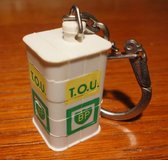
Keychain interlocking puzzle Oil Can |
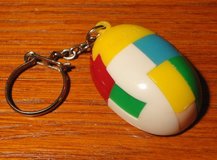
Keychain interlocking puzzle Legal Coffee Bean |
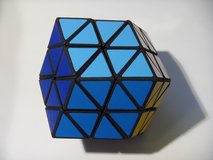
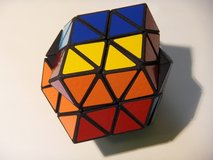
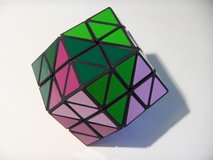
The Rhombic-18, by David Pitcher. [T] [Y] [S] This is a twisty puzzle in the shape of a Rhombic Dodecahedron. All faces turn, and all 4-fold corners turn. It is similar to Matt Shepit's Rua puzzle [T], which is also a face-turning RD, but does not allow vertex turns of any sort. |
|||
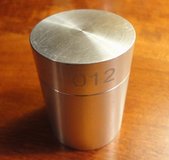
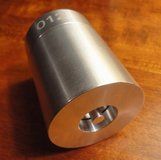
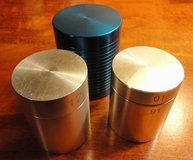
Washer Cylinder, number 12, from William Strijbos A secret-opening container. Shown in comparison with Wil's Aluminum Cylinder Box, and Iwahiro's AlCyl. Reviewed by Oli and Kevin. |
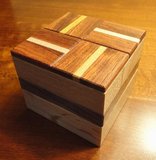
|
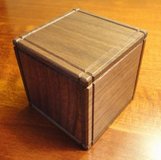
|
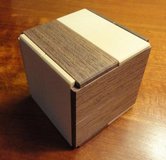
|
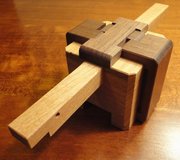
|
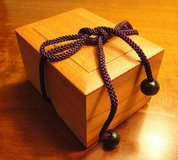
|
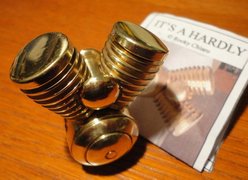
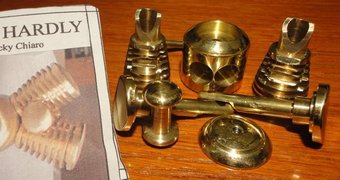
It's a Hardly by Rocky Chiaro A fairly simple and beautifully crafted brass puzzle model of an early Harley Knucklehead motor. |

The Tokyo Puzzles - Kobon Fujimura - Ed. by Martin Gardner |
Casse-Tete et Jeux Magiques by Daniel Picon |

The Twentieth Century Standard Puzzle Book - 1907 Routledge, London - A. Cyril Pearson |

The Magician's Own Book - 1862 - Arnold, George (1834-1865) & Cahill, Frank I don't have a physical copy, but this book can be downloaded from www.archive.org. |
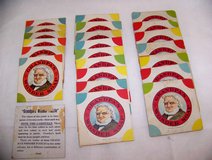 Now I just have to figure out which pieces comprise a puzzle!
This a modern example of a Chinese Magic Mirror:
Now I just have to figure out which pieces comprise a puzzle!
This a modern example of a Chinese Magic Mirror:
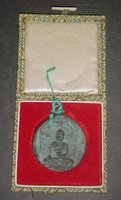 When sunlight hits its polished brass reflective face (opposite to that shown) properly, one can see an image of the IPP Burr puzzle logo.
The unique production technique was invented some 2000 years ago in China and entails more than ten complicated procedures.
When sunlight hits its polished brass reflective face (opposite to that shown) properly, one can see an image of the IPP Burr puzzle logo.
The unique production technique was invented some 2000 years ago in China and entails more than ten complicated procedures.
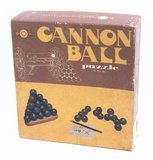
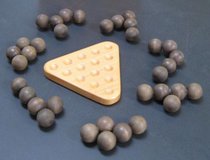
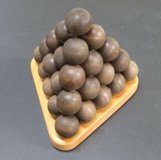
The Cannon Ball Puzzle, issued by Skor-Mor in 1973. Seven pieces of five balls each can be assembled into a side-5 pyramid, in addition to other shapes. Despite the credit to "John Bird, inventor" on the box, this was invented by Michael Reilly. You can read an interview with Michael at Eric Shamblen's PuzzleMonster website. Michael attempted to produce a remake via a Kickstarter project, but it didn't get funded. However, you can find a remake at Creative Crafthouse. Reilly is also the inventor of the Oops and Oops Again ball pyramid puzzles, as well as the game Archieball. |
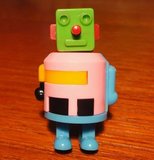
Keychain interlocking puzzle Robot |
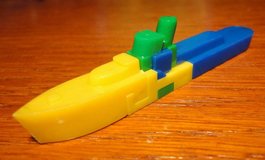
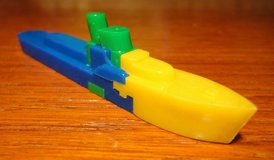
Keychain interlocking puzzle Destroyer |
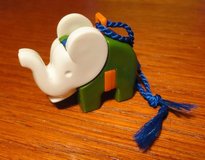
Keychain interlocking puzzle Elephant |
||
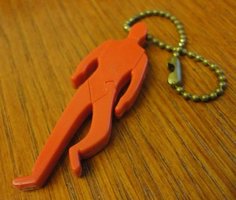
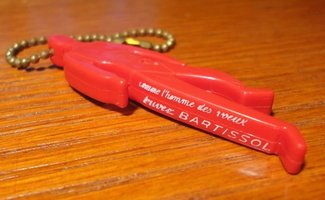
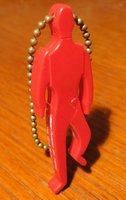
Bartissol Man |
||||
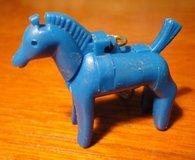
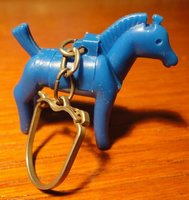
Blue Horse (Dutch, vinyl) |
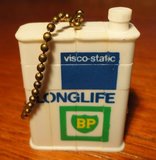
BP Longlife Oil |
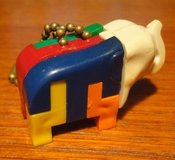
Elephant |
||
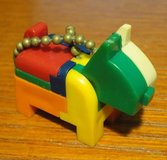
Spunky the Dog |
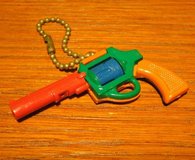
Revolver (missing pieces) |
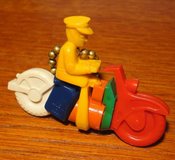
Motorcycle Cop |
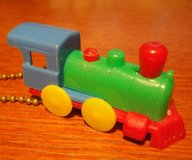
Locomotive (cab is damaged) |
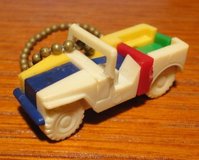
Jeep (windshield frame is damaged) |
 - nice sections on geometric dissections, and chessboard placement problems.
Designer Colin James very kindly sent me a copy of his Qboid puzzle.
- nice sections on geometric dissections, and chessboard placement problems.
Designer Colin James very kindly sent me a copy of his Qboid puzzle.
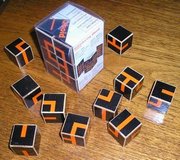 It offers over 1000 challenges at four different levels.
12 cubes, with patterned faces. When properly arranged, the patterns form digits and letters.
Entered in the
2009 IPP Design Competition.
Thanks, Colin!
A couple of Tom Jolly designs from the latest offering by
Eric Fuller:
It offers over 1000 challenges at four different levels.
12 cubes, with patterned faces. When properly arranged, the patterns form digits and letters.
Entered in the
2009 IPP Design Competition.
Thanks, Colin!
A couple of Tom Jolly designs from the latest offering by
Eric Fuller:
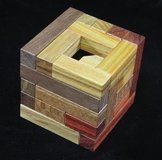
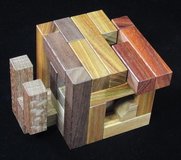
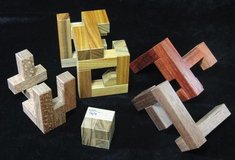
The Rattle Box, designed by Tom Jolly, made by Eric Fuller from Quilted Ambrosia Maple, Leopardwood, Padauk, Walnut, and Canarywood. A 5x5x5 cube with a hollow interior containing a 2x2x2 cube with one unit missing. |
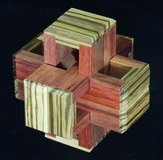
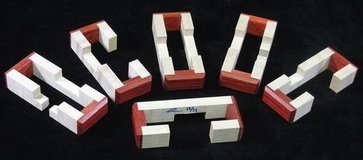
The Ribbon Puzzle, designed by Tom Jolly, made by Eric Fuller from Chakte Cok and Zebrawood - six pieces that form the 3-piece burr shape. |
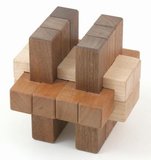
First and foremost, I found Wausau '83, a burr designed by Bill Cutler and made by Jerry McFarland, from Walnut, Cherry, and Maple. Bill says this is the best of the Wausau series, and it requires 11 moves to remove the first piece. |
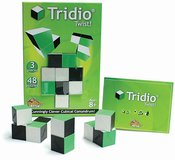
David recommended Tridio Twist! by FatBrain Toy Co. Three mutable pieces and 48 pattern challenges. Designed by Marijn van Herel and Eliane Scharten. |
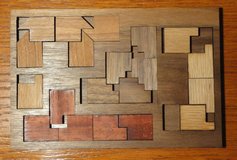
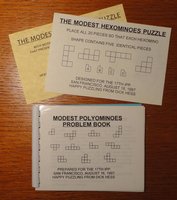
Modest Hexominoes by Dr. Richard Hess (IPP17) Place all 20 pieces so that each hexomino shape contains five identical pieces. Includes a booklet with 100 additional problems to maximally cover polyomino shapes with congruent tiles. |
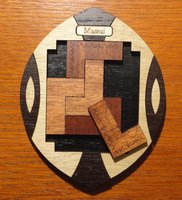
The Massai packing puzzle from Siebenstein Spiele, 2011. Pack the 5 identical L-shaped tetrominoes in the tray. |
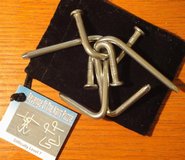
The Revenge of the Nails puzzle, by Rick Irby. |
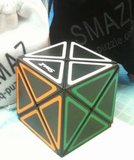
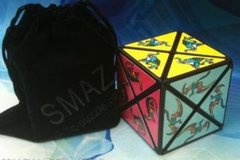
An inexpensive remake of the Dino Cube, by "SmaZ" I got the version with SmaZ' "hollow" stickers, signed by him, and also a version with the remake of the original "Dino" stickers. The puzzle turns well! |
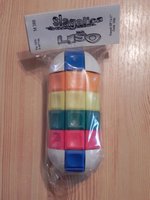
A four-layer "Leesho" puzzle. |
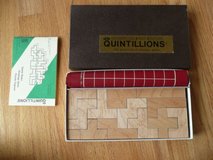
Quintillions, a nice Pentominoes set, by Kadon. This product launched Kadon in 1979. |
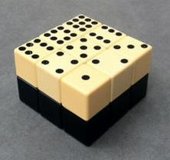
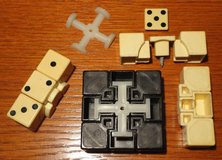
This is a vintage Rubik's Domino (2x3x3) - this one has the spindle mechanism. |
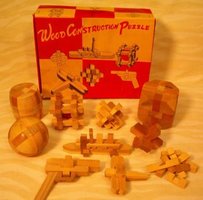
A vintage boxed set of wooden Kumiki puzzles, marked "Made in Japan" but with no other provenance. Includes: a barrel, a caged ball burr, a truncated cube, a six-piece burr, a "crystal," a ball, a pistol, a battleship, a dragonfly, and a small pagoda. |

Codebreaker - The History of Secret Communication - by Stephen Pincock |
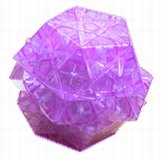
Mf8 Starminx II - in translucent purple This is a mass-produced version of what the twisty forum knows as the Starminx I, previously custom-made by Aleh [T] , Drew Cormier [T] , and Tom van der Zanden, in mini [T], and larger size [T] . (Mf8 called their Dino-Dodecahedron a Starminx I, hence the naming confusion.) |
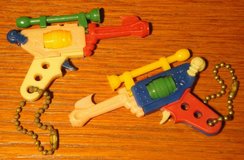
Keychain Space Blaster Guns |
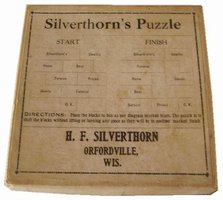
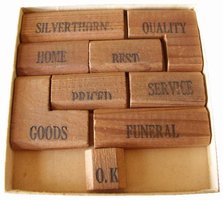
A vintage sliding piece puzzle advertising Silverthorn's of Orfordville, Wisconsin. This is an instance of the classic design known as Ma's Puzzle, and while the related Dad's Puzzle has been used extensively for advertising, this is the first time I have seen Ma's puzzle used. |
||
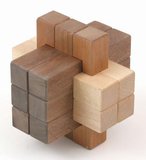
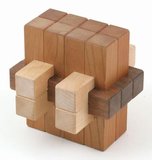
Two members of the Wausau burr series by Bill Cutler - '82 and '84. |
||
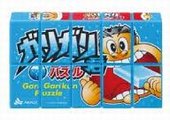
IQube blue - 1.2.5 www.hanayamatoys.co.jp |
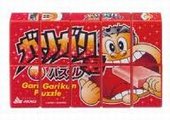
IQube red - 1.2.5 www.hanayamatoys.co.jp |
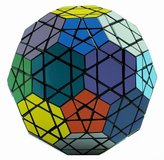
Tuttminx Classic [T] www.verypuzzle.com |
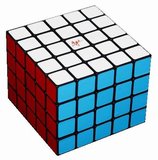
Ayi's 4.5.5 ayistoy.com |
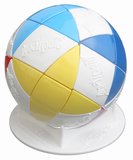
Dioctipoid 1 www.dioctipoid.com |
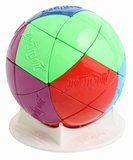
Dioctipoid 2 www.dioctipoid.com |
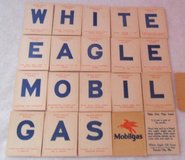
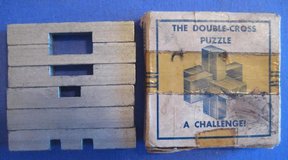

The Curse of the Voynich, by Nick Pelling, is a probing look into the history of the enigmatic Voynich Manuscript. Dated to the 1400s, the manuscript was discovered in 1912 by the antiquarian book dealer Wilfrid Voynich in an old trunk in a villa near Rome. Once thought to have been created by Roger Bacon, it has resisted all attempts at decipherment, and its true provenance remains shrouded in mystery. Its baffling text and strange illustrations continue to fascinate researchers. You can find purchase info about Pelling's exposé at Compelling Press. Check out Nick's website, Cipher Mysteries, for discussion about other uncracked historical ciphers. |

Professor Stewart's Hoard of Mathematical Puzzles, by Ian Stewart |

Famous Puzzles of Great Mathematicians, by Miodrag S. Petkovic |

Puzzles and Programming, by Fadi Jabr |

The Greatest Puzzles of All Time, by Matthew J. Costello |

Mathematics From the Birth of Numbers, by Jan Gullberg |

The Curious Book of Mind-Boggling Teasers, Tricks, Puzzles & Games, by Charles Barry Townsend |

The World's Biggest Puzzle Book, by Charles Barry Townsend |
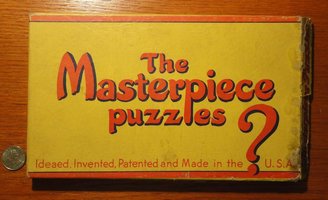
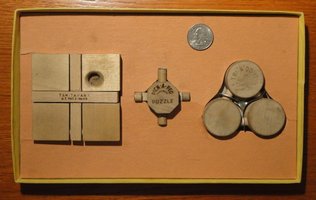 The three classic wooden vintage secret-opening puzzles
Takitapart
(U.S. Patent
2181116 - Boyle 1939),
Pick-A-Peg
(U.S. Patent
2469364 - Boyle 1949),
The three classic wooden vintage secret-opening puzzles
Takitapart
(U.S. Patent
2181116 - Boyle 1939),
Pick-A-Peg
(U.S. Patent
2469364 - Boyle 1949),
and Tri-'N'-Do-It (U.S. Patent 2207778 - Boyle 1940), all invented by John D. Boyle, were issued in this boxed set, called the Masterpiece Puzzles. |
Here is a plastic interlocking keychain puzzle Knight:
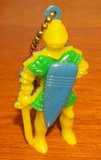
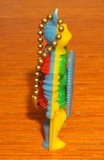
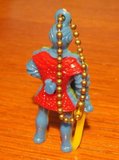
|
 Our electricity was out for over a week due to the storm on October 29th - 30th 2011.
This is a shot of the trees in our back yard, bowed (with a few broken limbs) due to the load of snow on them.
We lost power on Saturday night the 29th and it wasn't restored until the evening of Monday November 7th.
The unseasonable accumulations of about 12" of heavy, wet snow onto trees that had not yet fully shed their leaves brought down many trees and limbs large and small and wreaked havoc with the above-ground utility lines across the northeast.
The extent of the damage was unbelievable - nearly every street had issues.
Fortunately, we had the option to stay with a kindly nearby relative who had power (thanks, Pat!),
and the temperatures were not frigid enough to cause pipes to freeze in the unheated house.
Our electricity was out for over a week due to the storm on October 29th - 30th 2011.
This is a shot of the trees in our back yard, bowed (with a few broken limbs) due to the load of snow on them.
We lost power on Saturday night the 29th and it wasn't restored until the evening of Monday November 7th.
The unseasonable accumulations of about 12" of heavy, wet snow onto trees that had not yet fully shed their leaves brought down many trees and limbs large and small and wreaked havoc with the above-ground utility lines across the northeast.
The extent of the damage was unbelievable - nearly every street had issues.
Fortunately, we had the option to stay with a kindly nearby relative who had power (thanks, Pat!),
and the temperatures were not frigid enough to cause pipes to freeze in the unheated house.
|
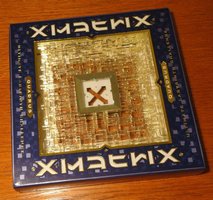
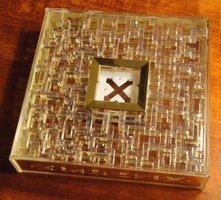
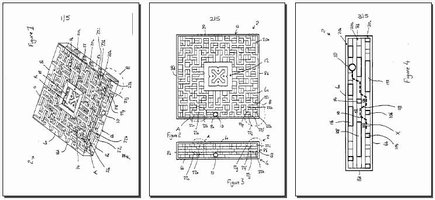
|
|
This is the XMATRIX Quadrus puzzle,
developed in 2009 by artist and designer Jeremy Goode and issued by www.xmatrix.co.uk You can see Goode's European patent GB2472581(A) online. The Quadrus retails for £20 - Jeremy kindly sent me a copy to try. Thanks, Jeremy! Quadrus is a large (140 x 140 x 30mm) and attractive traditional rolling-ball multilevel maze in a gold-tinted transparent acrylic case, nicely packaged in a cardboard slipcase tray that shows off the ambigrammatic XMATRIX logo. Quadrus is also available in a blue tint, and has a smaller cubic sister puzzle called Cubus. In Quadrus, the maze network is defined by three layers of internal latticework structures and interstices - one lattice on each large face, and a third suspended between them, with an empty thickness between pairs of adjacent layers - giving an overall thickness of 5 layers between the "floor" and "ceiling" faces. The walls in a layer are 4mm wide, and the pathways between walls are 8mm wide. Walls and pathways in a layer are arranged on a 34 x 34 virtual grid of 4mm x 4mm squares. The ball occupies a 2x2x2 space within the lattice. The maze contains a central 12x12 square compartment - a white panel with a stylized 'X' cutout separates the compartment into a gold-framed side and a silver-framed side. Each side of the compartment has a single entrance into the maze. To solve Quadrus, one must navigate the ball from the central gold-framed compartment to the central silver-framed compartment on the opposite side, by tilting the puzzle and guiding the ball through the maze. I have found that the occasional ill-planned tilt can send the ball somewhat further than one intends, adding a dexterity dilemma to the already-considerable routefinding challenge. This style of maze is similar to the Boston Subway puzzle designed by Oskar van Deventer for the 2006 IPP Exchange. (See Boston Subway at Oskar's website.) Boston Subway is a much smaller puzzle, but also comprises a "sandwich" of 5 layers of transparent acrylic, through which one navigates an internal metal ball from point A to B and back. Unlike Quadrus, Boston Subway requires the solver to use an included magnetic wand to move the ball through the maze. As interesting as Oskar's Boston Subway puzzle is, I find the Quadrus more convenient to hold and manipulate, and it is far easier to see and keep track of where the ball is. While less portable, it is more engaging to the casual puzzler. For the 2009 IPP, Oskar also designed Next Floor. (See Next Floor at Oskar's website.) Produced from laser-cut MDF, this maze is formed from 5 grooved layers with four interstices. A version of Next Floor is marketed by Bits and Pieces, but unfortunately folks reported that the layers can be loose and the ball can squeeze through unintended paths or even fall out, spoiling the fun. No such issues plague the robust, high-quality Quadrus puzzle. I found an older seven-layer version (in an eBay auction). Unfortunately it included no documentation and I am unware of its provenance. 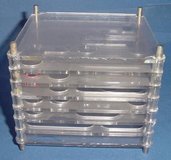
|

 Some puzzles by craftsman Colin Gaughran, who has a shop in Lyme, Connecticut -
a Chuck Burr, an Altekruse, and some six-piece burr pieces - in Maple and Walnut.
Some puzzles by craftsman Colin Gaughran, who has a shop in Lyme, Connecticut -
a Chuck Burr, an Altekruse, and some six-piece burr pieces - in Maple and Walnut.
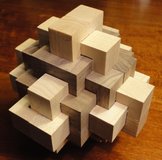
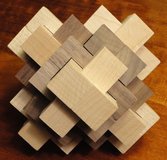
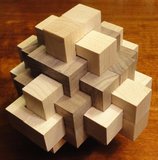
Chuck Burr - Colin Gaughran |
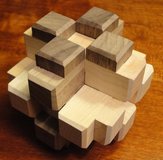
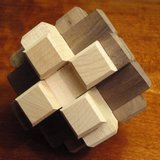
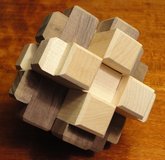
Altekruse - Colin Gaughran |
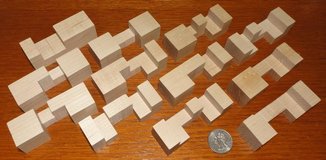
Colin Gaughran made this set of 12 burr pieces, from Maple. The included pieces can be used to make at least four interesting burrs, including Bill Cutler's #306, CINTVY, FILTVY, and FGINOY. The pieces are: 52, 359/615, 871, 911, 928, 943, 975, 960/992, 1007, and 1024. |
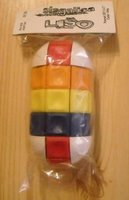
Leesho (Liso) |
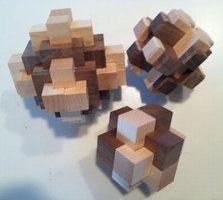
A set of burr puzzles in Maple and Walnut, from Colin - a Woodchuck, an Altekruse, and a #306. |
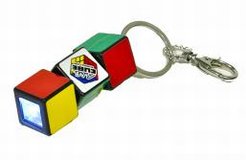
Rubik's LED Flashlight 1x1x3 |
||
|
||||
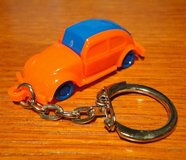
Keychain VW Beetle |
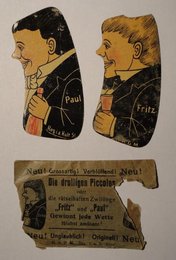
Fritz and Paul A version of the "Which is Larger" optical puzzle made in Germany "New! Great! Amazing! The droll Piccolos or the enigmatic twins Wins every bet very amusing!" D.R.G.M. Reg. i. a. K. - Staat Franz Wieland, Berlin S. 59, Camphausenstr. 25. |
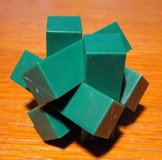
Keychain Diagonal Burr |
||
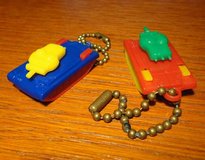
Interlocking keychain puzzle Tanks |
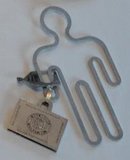
Traveling Salesman tangle - Rolfs - IPP31 |
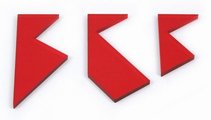
T+3 - designed by Hiroshi Yamamoto The 3 pieces can be arranged to form four different pentominoes, including a T. A really nice dissection! This won a Jury Honorable Mention at the 2011 IPP Nob Yoshigahara Puzzle Design Competition. Thanks, Brett! |
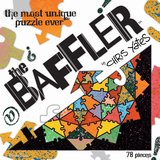
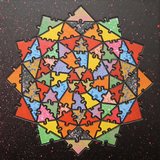
Bindu Truss - one in a series of "Baffler" puzzles designed by Chris Yates and issued by Ceaco. Thanks, Brett! |
||
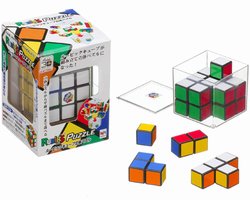
Rubik's Puzzle (assembly) |
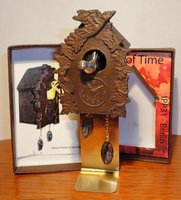
Out of Time - Lambert Bright - IPP31 Free the Cuckoo from the Clock |
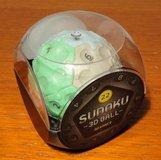
Sudoku 3D Ball - 22 Advance Thanks, Brett! |
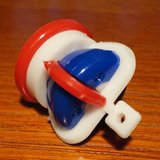
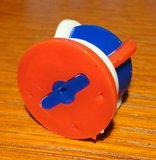
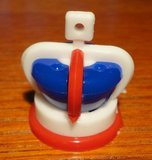
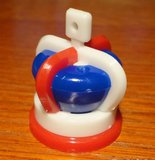
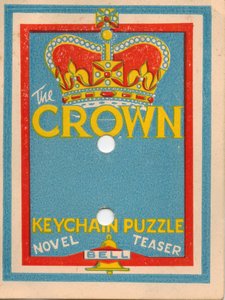
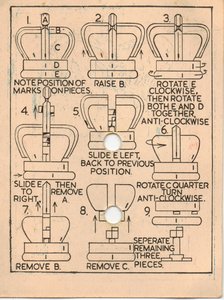
A vintage Crown interlocking keychain puzzle, issued by Bell. With its original card! |
||
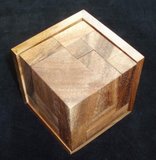
8 L-ements - designed by Rick Eason |
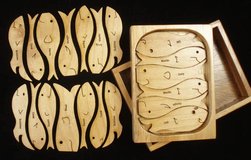
Fisherman's Dilemma |
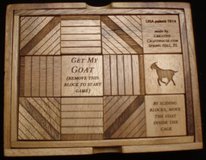
Get My Goat |
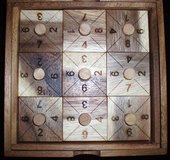
Perfect 10 |
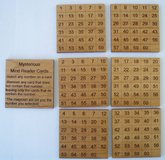
Mindreader Cards (125 set) |
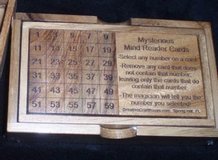
Mindreader Cards in box |

Alpha Snake 9 - designed by Ken Irvine |

Math Snake 9 - designed by Ken Irvine |
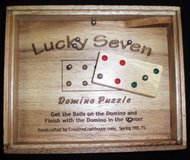
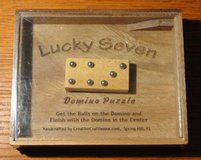
Lucky Seven (I solved it!) |
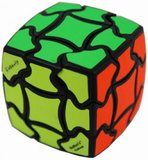
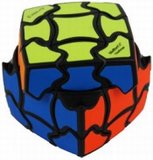
Venus Cube - black designed by Evgeniy Grigoriev |
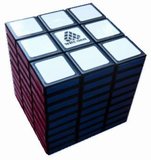
3x3x9 - black |
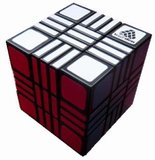
3x3x9 Roadblock I - black |
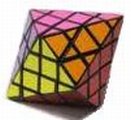
Super Dipyramid (4x4x4) - black |
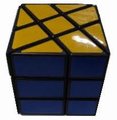
Windmill Cube - black |
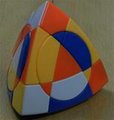
Crazy Tetrahedron - Standard |
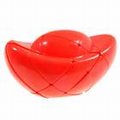
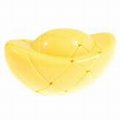
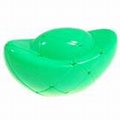
Ingot (3x3x3) - Red, Yellow, and Green |
||
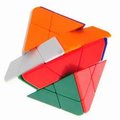
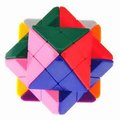
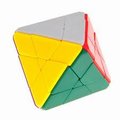
Master Trajber's Octahedron (4x4x4) - colored pieces |
||
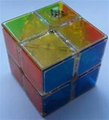
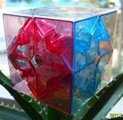
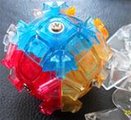
"New Spring" 2x2x2, clear version, tinted pieces version, and bandaged 3x3x3 version (internal colors) |
||
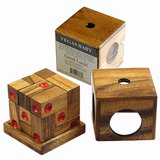
|
Here is a Mini-Hexaminx, designed and made by Grégoire Pfennig, printed by Shapeways.
[T]
[S]
Shown in comparison to a U.S. quarter, a Pillowed Hexaminx hand-made (cast) by Traiphum Prungtaengkit, and a Tomy Megaminx. This small wonder is very stable and usable. I am impressed that something so compact works so well. Nice work, Greg! 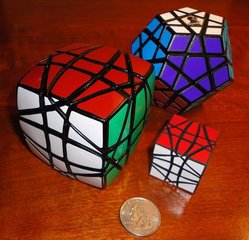
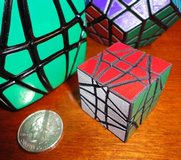
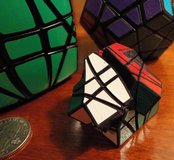
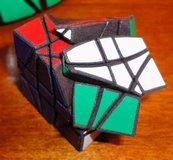
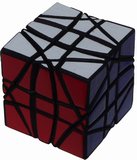
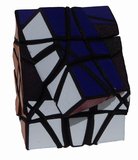
|
|
|
Next up is another wonderful puzzle by Greg - this is his Mental Flop.
[T]
[S]
Visually, it's a cross between a 1x3x3 Floppy and Tony Fisher's Mental Block, hence the (great) name. Shown in good company - an original Floppy Cube hand-made by Okamoto, and an original Mental Block hand-made by Tony Fisher, along with a U.S. quarter. Very stable and playable! 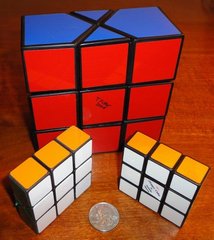
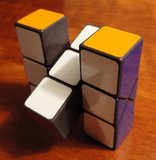
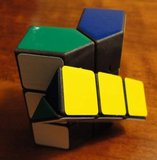
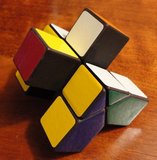
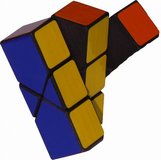
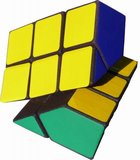
|
|
I received an Mf8 DaYan Crazy Tetrahedron (Jupiter)
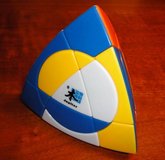
|
Here is a keychain car (yellow, green, and white)
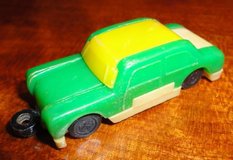
|
I ordered three puzzles from
Mr. Puzzle Australia -
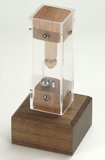
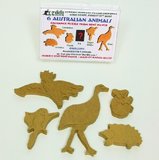
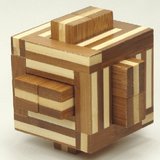
Houdini's Torture Cell designed by Brian Young, Six Australian Animals designed by René Dawir, and Six-Piece Framed Burr by miToys |
|
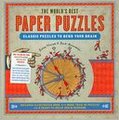
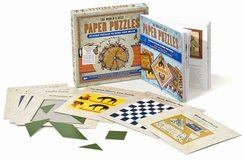
The World's Best Paper Puzzles - Slocum and Botermans |
||
| Three vintage puzzles... | ||
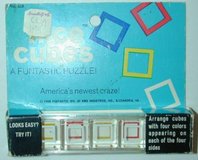
Nice Cubes, in original package Copyright 1968 Funtastic, Div. of KMS Industries, Inc., Alexandria, VA. |
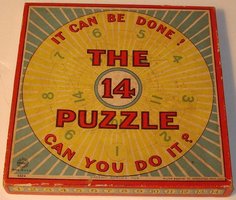
The 14 Puzzle - Milton Bradley |
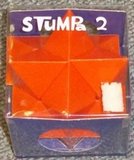
Stumpa 2 (A plastic diagonal star) |
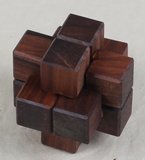
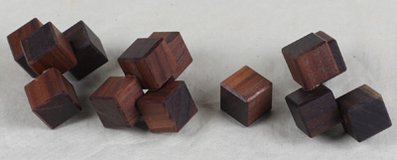
This is the Q Burr, designed by Jim Gooch, made by Steve, from Rosewood. Four pieces, one of which is a cube. |
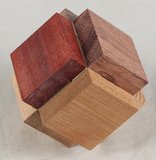
Six Pack, designed by Jim Gooch and made by Steve, from Mahogany, Red Oak, Padauk, Bubinga, Walnut, and Pecan. Six interlocking pieces. |
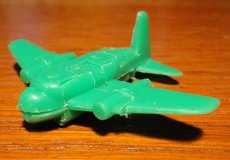
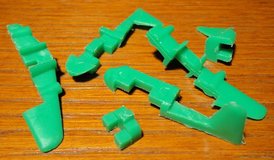
Bomber keychain puzzle |
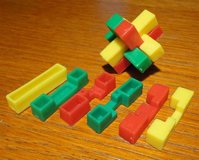
Burr keychain puzzle |
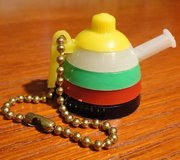
Teapot keychain puzzle This one has an actual screw thread. |
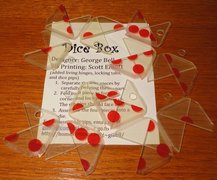
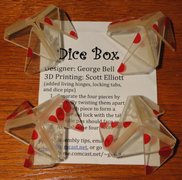
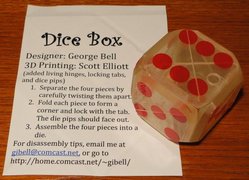
This is the Dice Box, designed by George Bell [S], with input from Scott Elliott, and printed by Scott. It's not overly difficult, but I think the printed live hinges are cool. |
||||||
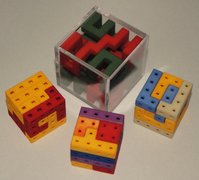
Assorted cubes - Richard Gain You can find these at Richard's Shapeways shop, and sometimes he has dyed copies for sale at his Etsy shop. Unless otherwise noted, these are designed by Gain. I picked up (from the top, clockwise): Superstrings, which won a Jury First Prize at the 2011 Nob Yoshigahara Puzzle Design Competition, Angle-C, Elevator designed by Jos Bergmans, and Roll Up! Roll Up!. |
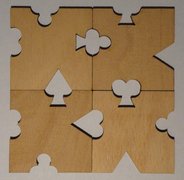
Suits Edgematch I found this at Der Verrückte Laden, a puzzle shop in Berlin. |
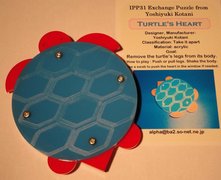
Turtle's Heart - Kotani |
||||
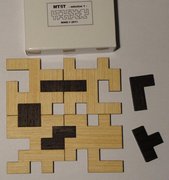
MT5T (Make the Five Tetrominoes) - Mission 1 designed by MINE (Mineyuki Uyematsu) A similar version won a Jury First Prize at the 2011 Nob Yoshigahara Puzzle Design Competition |
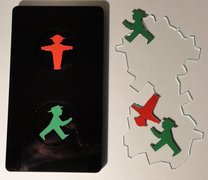
Ampelmann - Roman Götter Fit the Ampelmann figures into the black case so a single figure is showing in each circle. The clear piece is a hint - it shows the shape of the cavity inside the case. Simple, eh? These figures are the old East Berlin crosswalk signal symbols - one of the few vestiges of Communist rule that Berlin citizens want to keep. Read more about " "Speciation and Competition in Berlin's Traffic Lights." |
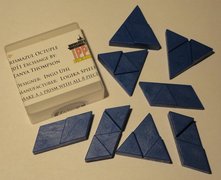
Prismazul - Logika |
||||
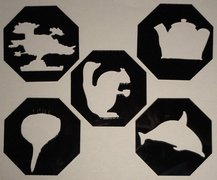
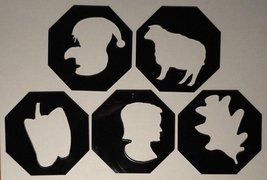
Two Silhouette Puzzles designed by Diniar Namdarian- make a Pigeon, and make a Dog. |
||||||
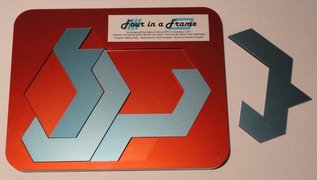
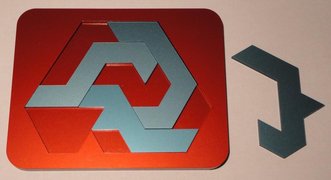
Four in a Frame - a two-sided four-piece tray packing puzzle based on a triangular grid, designed by Markus Götz |
||||||
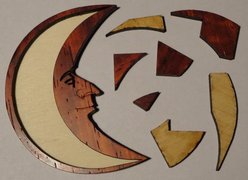
Mond oder Kreuz Make both a crescent moon, then a Greek cross from the pieces. |
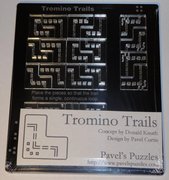
Tromino Trails - Pavel Curtis |
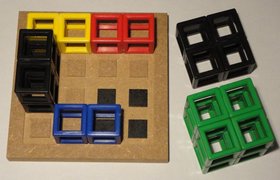
Creeping Block - exchange from Dirk Weber Thanks, Dirk! |
||||
|
||||||
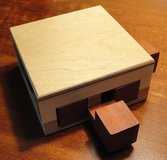
Six piece caged burr |
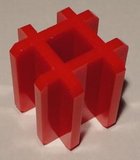
Four-piece red weave |
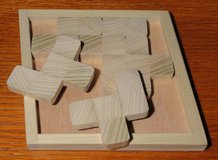
Quartet in F - Stewart Coffin |
||||
Several new tanglement puzzles:
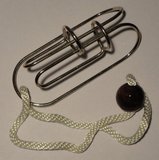
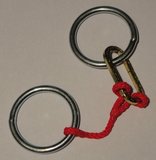
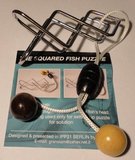
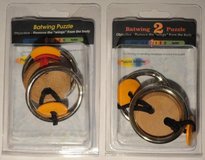
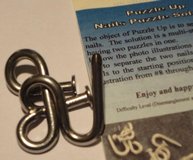
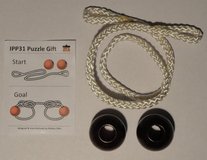
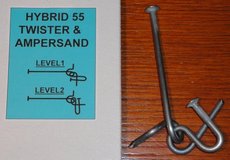 Schlitten - Constantin, Rings with red cord (?),
The Squared Fish - A. Jacob, Batwing and Batwing 2 - PuzzleMaster,
Schlitten - Constantin, Rings with red cord (?),
The Squared Fish - A. Jacob, Batwing and Batwing 2 - PuzzleMaster,
Puzzle Up Nails - Rick Irby, IPP 31 Gift - Markus Götz, Hybrid 55 - Richard Hess |
||||||
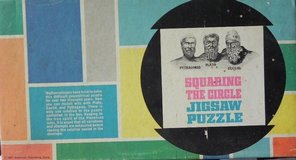
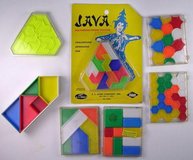
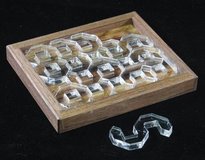
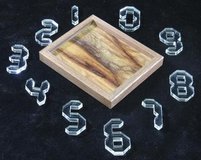
The much-copied Digigrams, designed by
Martin Watson.
Made by Eric Fuller, from Grandillo, Walnut, and laser-cut acrylic. |
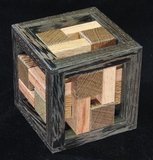
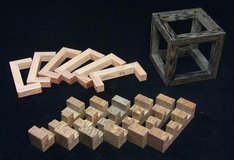
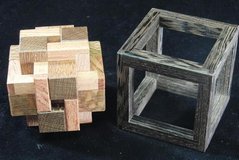
Boards and Sticks with Frame, designed by
Gregory Benedetti.
(See this design at Ishino's site.) Made by Eric Fuller, from Wenge, Bubinga, and Leopardwood. |
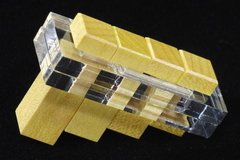
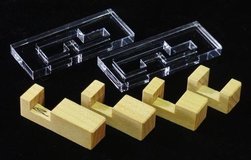
Zauberflote, designed by Gregory Benedetti.
(See this design at Ishino's site.) Made by Eric Fuller, from Yellowheart and laser-cut acrylic. |
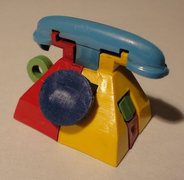
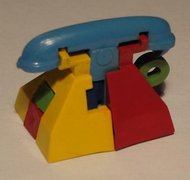
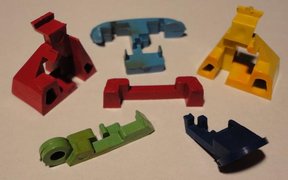
This Old-style Telephone Interlocking Keychain Puzzle was designed by John Flower in 1952 and issued by the UK company Bell. It has six pieces and assembly requires several pieces to be moved back and forth in sequence, which is not typical for keychain puzzle mechanisms. I like this one a lot! |
||
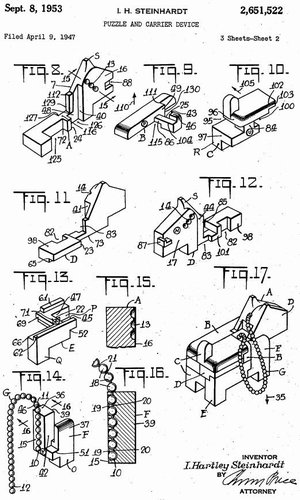
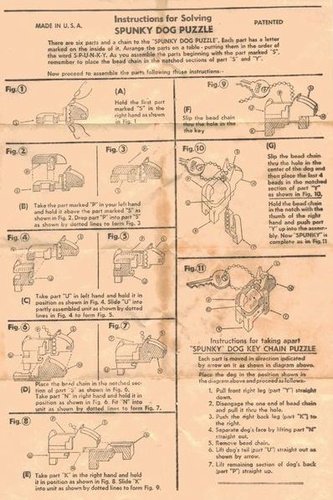

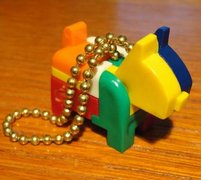
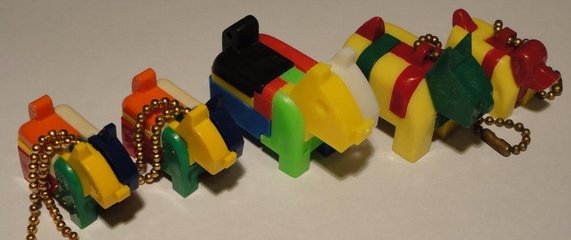
This interlocking keychain puzzle is Spunky the Dog, patented by Irving Hartley Steinhardt in 1953 (2651522). According to Jerry Slocum, Spunky was Steinhardt's pet dog. The six letters in S-P-U-N-K-Y are embossed, one in each of the six pieces. Spunky, and other dogs, have appeared in several forms, including one having a larger left ear (2nd from left). |
||
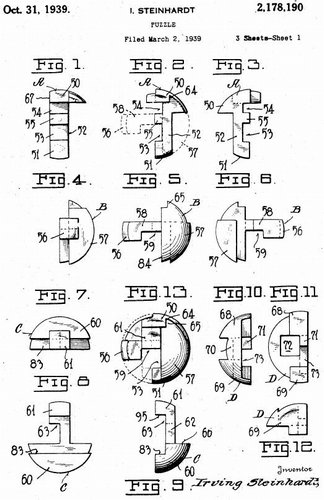
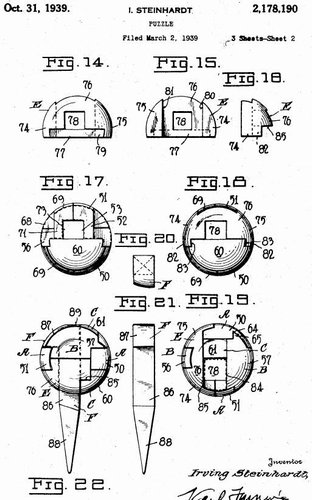
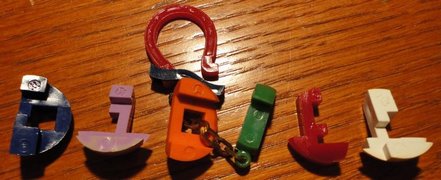
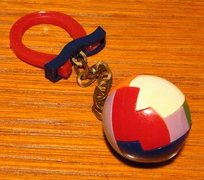
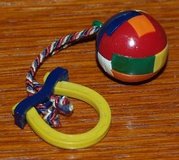
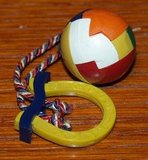
This interlocking keychain puzzle ball was patented by Irving Hartley Steinhardt in 1939 (2178190). This patent number is embossed on the hollow inside of the green key piece of the example with the chain. The six letters W-H-A-L-E-N are embossed, one in each of the six pieces. Grover Whalen was president of the New York World Fair Corporation, and helped run the 1939 fair - for which Steinhardt's Trylon Perisphere puzzle was issued. This puzzle ball contains virtually the same pieces as the Trylon Perisphere, except the Trylon key piece has been truncated and become part of the ball. According to Slocum and Waite, this is the first keychain puzzle, issued by the Helenhart Novelty Company of New York City. Steinhardt also patented the horseshoe-shaped clip, in 1942 (D132116), and another type of retension device having a cord, in 1944 (2361069). |
||
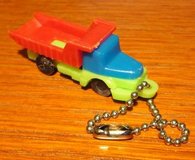
Keychain Dumptruck |
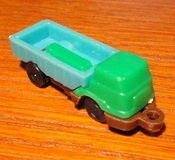
Keychain Truck |
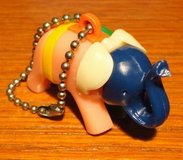
Keychain Elephant |
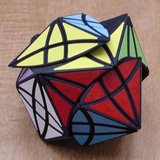
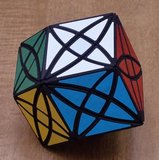
This is a Rex Rhombic Dodecahedron (RRD), designed by William Kretschmer. It was announced on the TwistyPuzzles forums, and is available from Will's Shapeways shop. As Will says, the turning is nearly flawless. It's about the same size as the LanLan 4x4x4 RD. This is a great puzzle! |
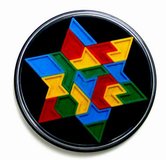
Peri Spiele's 19-piece n-iamond packing |
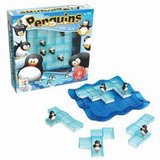
Penguins on Ice - SmartGames - Raf Peeters Raf has created another great multi-challenge puzzle, this time based on Pentominoes. But instead of requiring 12 pieces, Penguins on Ice uses only five - each of which can assume multiple shapes! Thanks, Raf! |
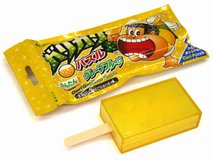
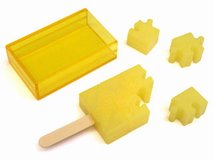
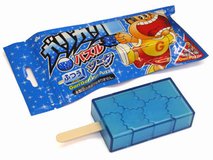
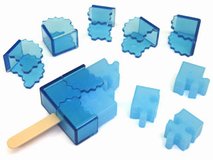
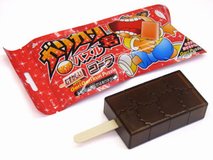
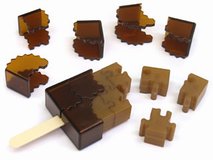
A set of three assembly puzzles from Japan - Garigari Grapefruit (easy), and Garigari Soda (normal), Garigari Cola (hard) Made in China and distributed by Hanayama |
||
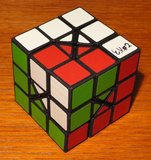
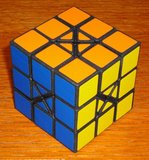
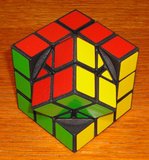
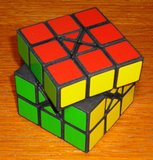
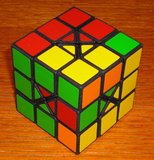
Redi 3x3x3 - Eric Vergo This puzzle turns at its vertices like Oskar van Deventer's Redi Cube, plus like a 3x3x3. Announced on the TwistyPuzzles forums, and available at Eric's Shapeways shop. Very clever, Eric! |
||
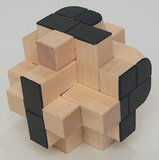 IPP Burr - Mr. Puzzle Australia
IPP Burr - Mr. Puzzle Australia
|
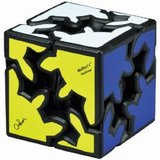
Oskar's Gear Shift - Meffert |
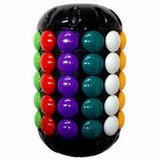
Capzule |
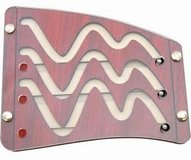
Die Welle (The Wave) - Constantin |
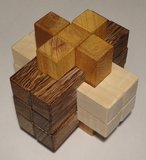
456 Burr Almost identical to the Arjeu 456 Burr |

Collection of Martin Gardner's Scientific American Mathematical Games columns on CD |
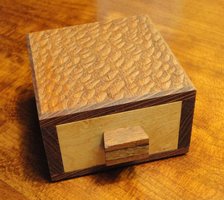
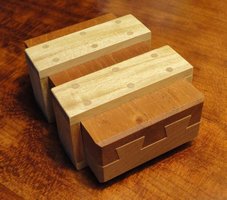
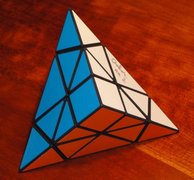
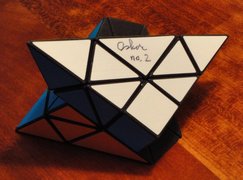
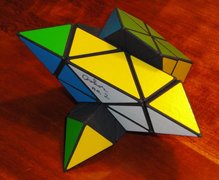
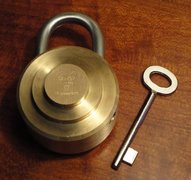
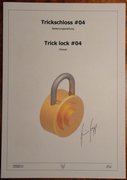
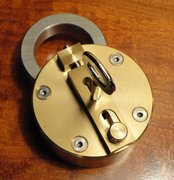
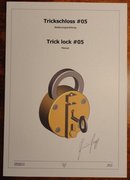
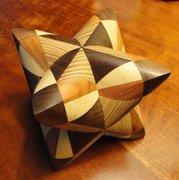
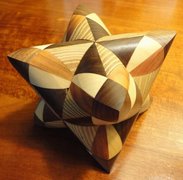
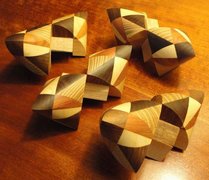
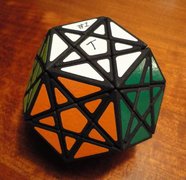
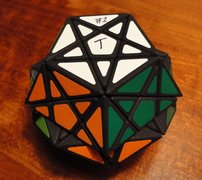
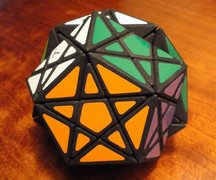
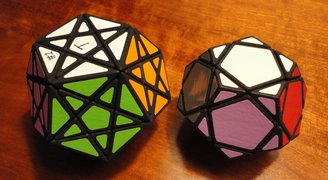
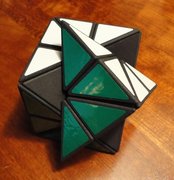
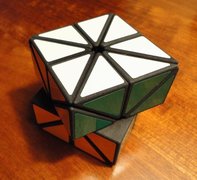

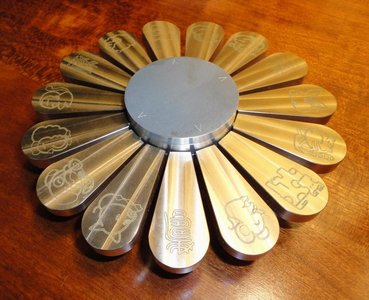
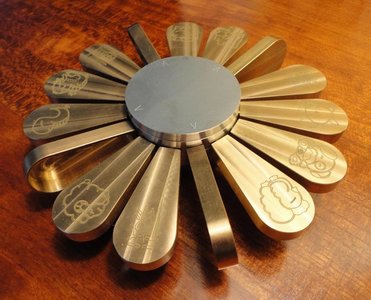 The next puzzles are two aluminum dovetail secret-opening puzzles. Each has a greenish inlaid piece - one is convex and the other concave - to be removed (then replaced). I am told there are internal pieces that can fall out when the puzzle is opened, so be careful!
The next puzzles are two aluminum dovetail secret-opening puzzles. Each has a greenish inlaid piece - one is convex and the other concave - to be removed (then replaced). I am told there are internal pieces that can fall out when the puzzle is opened, so be careful!
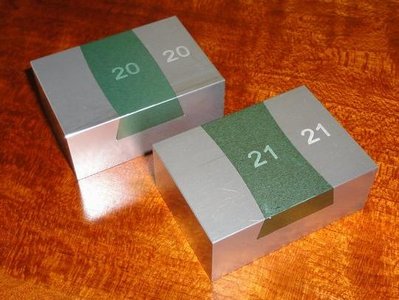
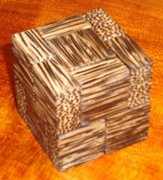
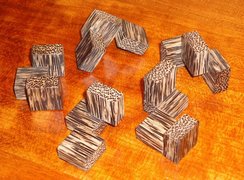
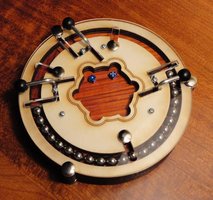



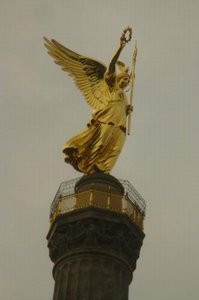

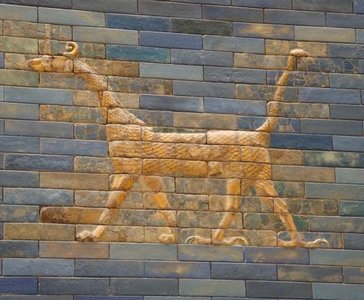
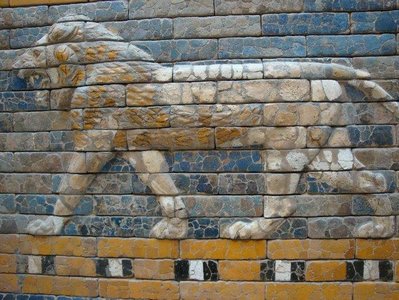

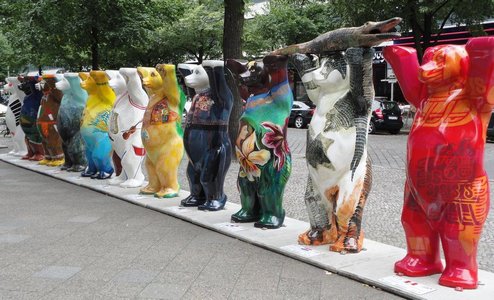 and here are a few of the puzzles I found...
and here are a few of the puzzles I found...
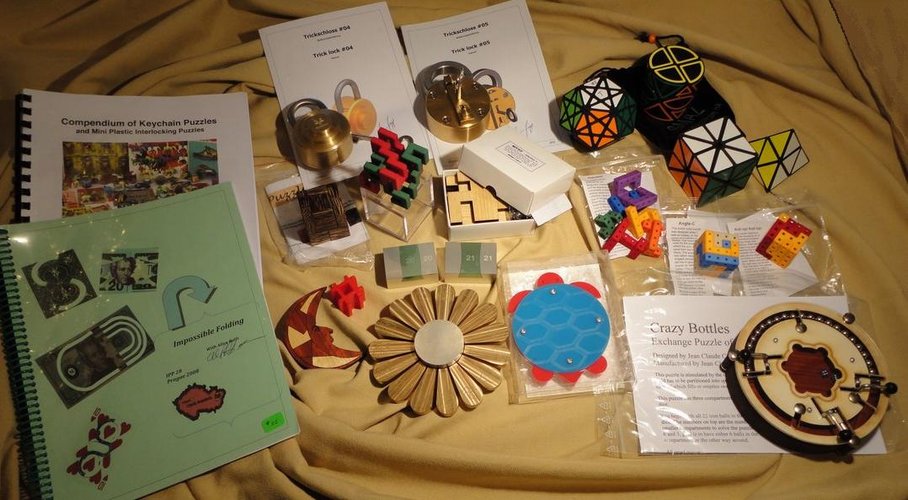 Compendium of Keychain Puzzles by Jerry Slocum and William Waite,
Impossible Folding by Allen Rolfs,
Trick Lock #4 and #5 by
Rainer Popp,
a Dino Cylinder by Smaz (thanks, Rox and Smaz!),
a Starminx I (large version) by
Tom van der Zanden (my copy is #1!)
[S]
,
a Super-X
[T]
by Tom van der Zanden,
a vintage Figurenmatch
[T] twisty,
Cube 16 designed by Stewart Coffin, produced from Black Palm wood and purchased from
PuzzleWood,
Superstrings
(a
2011 Design Competition Jury First Prize Winner) by Richard Gain
[S],
MT5T
(a
2011 Design Competition Jury First Prize Winner) by Mineyuki Uyematsu,
the Elevator Cube, Angle-C, and Roll Up! Roll Up! by Richard Gain
[S],
Der Mond (makes a crescent or cross - thanks, Wil!),
a red four-piece weave puzzle (don't know who made this - thanks, Brett!),
aluminum convex and concave trick dovetails - from Wil Strijbos,
a metal Jugo Flower from Wil Strijbos,
Turtle's Heart from Yoshiyuki Kotani,
Crazy Bottles from Manfred Ulrich.
Fortunately, Air Canada found my suitcase they had misplaced, so here are the other puzzles I obtained in Berlin:
Compendium of Keychain Puzzles by Jerry Slocum and William Waite,
Impossible Folding by Allen Rolfs,
Trick Lock #4 and #5 by
Rainer Popp,
a Dino Cylinder by Smaz (thanks, Rox and Smaz!),
a Starminx I (large version) by
Tom van der Zanden (my copy is #1!)
[S]
,
a Super-X
[T]
by Tom van der Zanden,
a vintage Figurenmatch
[T] twisty,
Cube 16 designed by Stewart Coffin, produced from Black Palm wood and purchased from
PuzzleWood,
Superstrings
(a
2011 Design Competition Jury First Prize Winner) by Richard Gain
[S],
MT5T
(a
2011 Design Competition Jury First Prize Winner) by Mineyuki Uyematsu,
the Elevator Cube, Angle-C, and Roll Up! Roll Up! by Richard Gain
[S],
Der Mond (makes a crescent or cross - thanks, Wil!),
a red four-piece weave puzzle (don't know who made this - thanks, Brett!),
aluminum convex and concave trick dovetails - from Wil Strijbos,
a metal Jugo Flower from Wil Strijbos,
Turtle's Heart from Yoshiyuki Kotani,
Crazy Bottles from Manfred Ulrich.
Fortunately, Air Canada found my suitcase they had misplaced, so here are the other puzzles I obtained in Berlin:
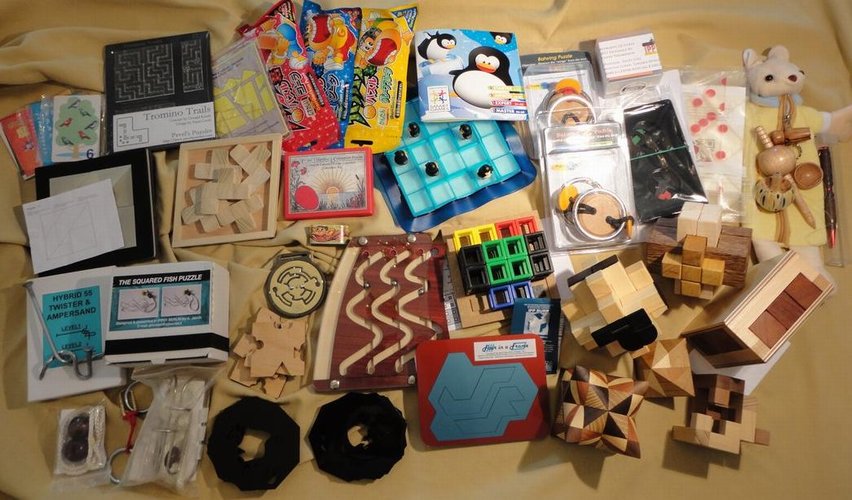 From upper left:
a set of optical illusion and math magic cards (thanks, Dor!),
Tromino Trails by Pavel Curtis,
Triangle-Square-Pentagon by Emrehan Halici,
three Japanese Ice Cream Puzzles,
Penguins on Ice by Raf Peeters and SmartGames (thanks, Raf!),
Batwing and Batwing 2 by PuzzleMaster,
Prismazul Octuple by Ingo Uhl and Logika (from Tanya Thompson),
Ampelmann (and hint) by Roman Götter,
Dice Cube by George Bell and Scott Elliott,
Spinning Tops and Pen from Stephen Chin (thanks, Stephen!),
next row:
Puzzle 7 from Bernhard Schweitzer (thanks, Bernhard!),
Quintet in F by Stewart Coffin,
Ei des Columbus,
Walking Monkey (it "walks" downhill) from a souvenir shop,
next row:
Hybrid 55 by Dick Hess (thanks, Dick!),
The Squared Fish Puzzle by A. Jacob,
Maze Medal designed by Oskar,
Four-Piece Edgematching Puzzle,
Die Welle by Constantin,
The Creeping Block Puzzle designed by Dries de Clercq, from Dirk Weber (thanks, Dirk!),
IPP Burr by Brian Young,
456 Burr,
D-301 (6 pieces in a cage),
next row:
IPP31 Gift Puzzle by Markus Götz,
Tangle with Red Cord,
Schlitten by Constantin,
5-piece Dog Silhouette and 6-piece Pigeon Silhouette by Diniar Namdarian,
Four in a Frame by Markus Götz,
Dual Tetrahedrons and Octahedron by Vinco (thanks, Vinco!),
Reunification by Bram Cohen (thanks, Bernhard!).
From upper left:
a set of optical illusion and math magic cards (thanks, Dor!),
Tromino Trails by Pavel Curtis,
Triangle-Square-Pentagon by Emrehan Halici,
three Japanese Ice Cream Puzzles,
Penguins on Ice by Raf Peeters and SmartGames (thanks, Raf!),
Batwing and Batwing 2 by PuzzleMaster,
Prismazul Octuple by Ingo Uhl and Logika (from Tanya Thompson),
Ampelmann (and hint) by Roman Götter,
Dice Cube by George Bell and Scott Elliott,
Spinning Tops and Pen from Stephen Chin (thanks, Stephen!),
next row:
Puzzle 7 from Bernhard Schweitzer (thanks, Bernhard!),
Quintet in F by Stewart Coffin,
Ei des Columbus,
Walking Monkey (it "walks" downhill) from a souvenir shop,
next row:
Hybrid 55 by Dick Hess (thanks, Dick!),
The Squared Fish Puzzle by A. Jacob,
Maze Medal designed by Oskar,
Four-Piece Edgematching Puzzle,
Die Welle by Constantin,
The Creeping Block Puzzle designed by Dries de Clercq, from Dirk Weber (thanks, Dirk!),
IPP Burr by Brian Young,
456 Burr,
D-301 (6 pieces in a cage),
next row:
IPP31 Gift Puzzle by Markus Götz,
Tangle with Red Cord,
Schlitten by Constantin,
5-piece Dog Silhouette and 6-piece Pigeon Silhouette by Diniar Namdarian,
Four in a Frame by Markus Götz,
Dual Tetrahedrons and Octahedron by Vinco (thanks, Vinco!),
Reunification by Bram Cohen (thanks, Bernhard!).